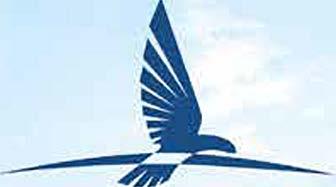Djibouti 2025
Vision 2035
INVEST
AGRO-INDUSTRIES
ENTREPRENEURSHIP
BANKS & INSURANCE
INFRASTRUCTURE
CONSTRUCTION
WATER
ENERGY
SUSTAINABLE DEVELOPMENT
TRADE
TOURISM
HEALTH
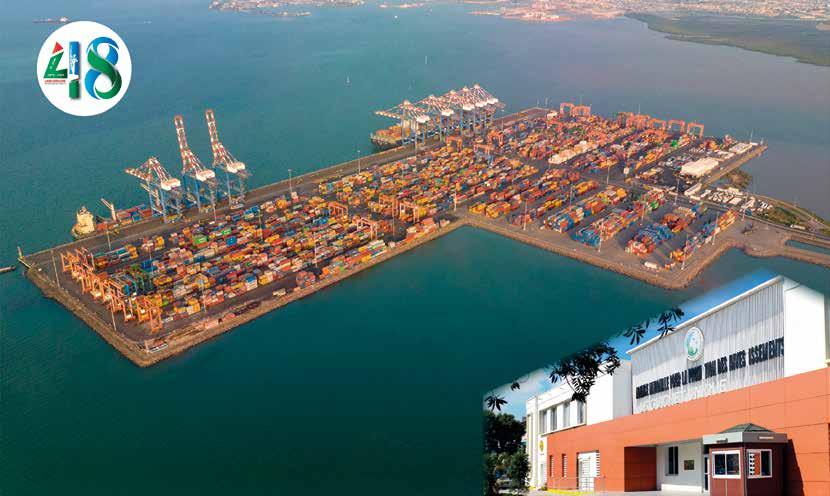

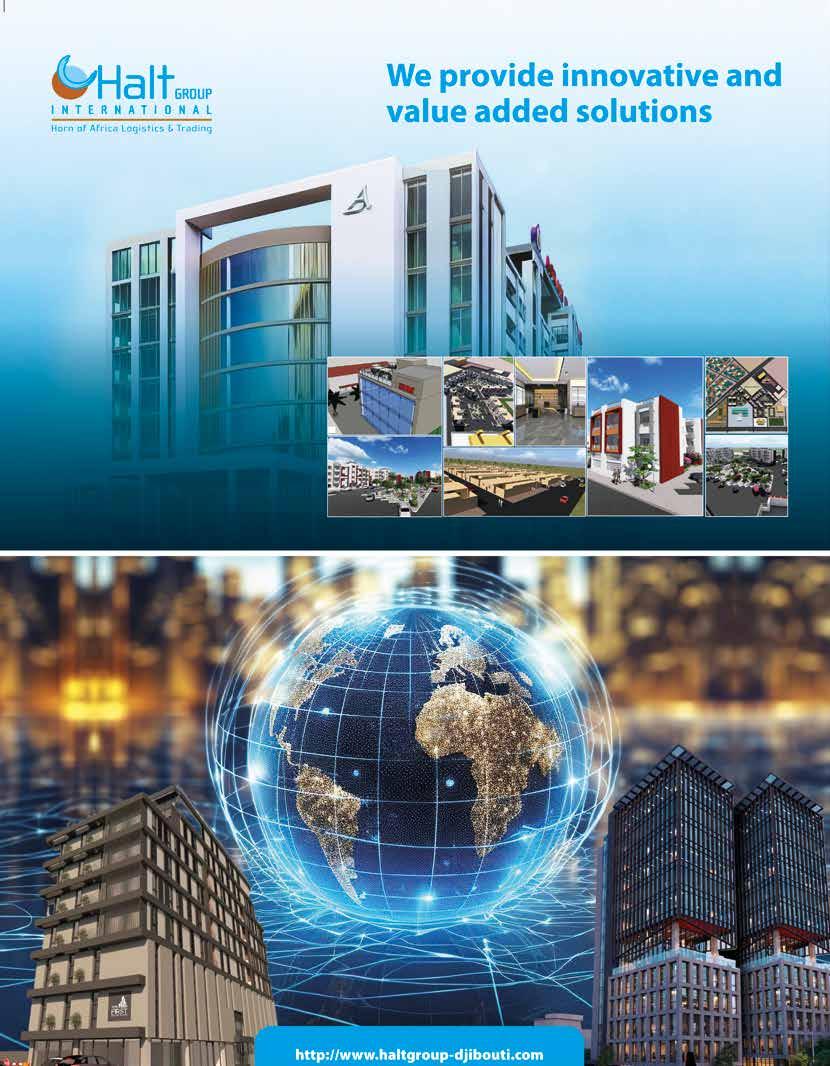
YEARBOOK
ECONOMIC REPORT
Djibouti 2025
VISION 2035
MEDIA DEVELOPMENT
In partnership with the National Agency for Investment Promotion (ANPI)

LD MEDIA DEVELOPMENT
23, rue du Roule 75001 Paris
Tel: (+ 33) 1 82 83 38 70 Fax:
(+33) 1 82 83 38 71
E-mail: Info@ldmdev.fr
Publishing Director:
Laurent Djaoui
Editor-in-chief:
Marie Hourtoule
Editorial secretary:
Marie Maudou
Editorial consultant:
MEDIADIPLO Int.
Art director:
David Garino
Advertising:
Laurent Djaoui
Frédéric Tabet
Toufik Kouni
MM Conseil - Maurice Habib
Secretary ofState for Investment and Private SectorDevelopment
Cite ministérielle du Boulevard Hassan Gouled Aptidon Boulevard- Djibouti
Tel: +253 21 33 99 50 / 21 33 99 60
H.E. Mrs Safia Mohamed Ali Gadileh, Secretary of State
National Agency for Investment Promotion (ANPI)
Rue de Marseille
BP 1884 - Djibouti
Tel: + 253 21 32 73 50
htpps:// djibouti-invest.com
M. Mahdi Darar Obsieh, Director General
Printed by

Djibouti
5 Foreword by His Excellency
IsmailOmar Guelleh, President of the Republic of Djibouti
6Map
7General data
8Macroeconomic performance
9Interview with Mr Abdoulkader Kamil Mohamed, Prime Minister
10The Djibouti Vision 2035 strategic plan and the ICI five-year plan
11Djibouti, a hub for regional trade
12The Intergovernmental Authority on Development (IGAD)
13Regional and sub-regionalcooperation
16Interview with Mr Abdi Ibrahim Farah, Director General of Djibouti Ports Corridor Road SA
17Djibouti, an emerging space power
Invest
21Introduction by Mrs. SafiaMohamed Ali Gadileh,Secretary of State for Investment and Private Sector
Development
22 A legal and judicial system at the service of business and investment
24Investment framework
26Interview with Mr. Mahdi Darar Obsieh,Director General of the National Agency for Investment Promotion (ANPI)
28Interview with Mr. Abdulraqeb Salem, CEO of Saba African Bank
30Private investment under the Investment Code
34The Education system and vocational training
36Interview with Youssouf Moussa Dawaleh, President of the Djibouti Chamber of Commerce
37Key contacts
Entrepreneurship, Banking & Insurance
42Interview with Mr. IlyasMoussa Dawaleh,Minister of Economy and Finance responsible for Industry
42Strengthening the industrial sector
44 Interview with Mrs. Nasro Habib Ibrahim, Director General of the Djibouti Economic Development Fund (FDED)
46Interview with Mr. Mahdi Mohamed Djama, Director General of the Djibouti Social Development Agency (ADDS)
48The Central Bank
50A competitive banking system
52Funding for SMEs
54Financial inclusion strategy
55Interview with Mr. Sébastien Nahon, CEO of BCIMR
57The insurance sector
59The COMESA insurance system
Agriculture,Water,Fisheries, Livestock&FisheriesResources
62The agricultural sector development
63The livestock sector
66Development of the agri-food industry
66Opportunities in the agri-food Sector
68Access to drinking water and sanitation
69Opportunities in the water sector
70Fisheries
72Interview with Mr. Mohamed Fouad Abdo, Director General of ONEAD
73Blue Economy Development
73Opportunities in the fisheries sector
Infrastructure & Equipment
76Djibouti: logistical hub of the Horn and model for the continent
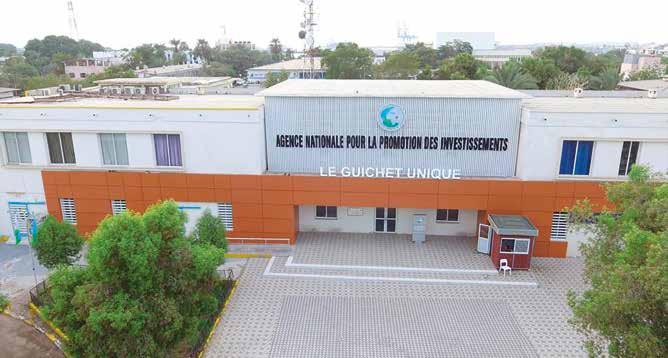
78Interview with Mr. Ide Ahmed Mohamed,Director General of Doraleh Multipurpose Port
79Maritime transport
80Road transport
81Railway sector
82Airport sector
84InterviewwithMr.Mohamed YoussoufCharmake,ManagingDirector ofDjiboutiInternationalAirport
85Construction,afoundationalsector
85Construction&realestate opportunities
Energy&NaturalResources
88The rise of electricity
90EnergytransitionwiththeGhoubet windfarm
92Renewableenergypotential
92Opportunities in the energy sector
93Undocumented mining heritage
94InterviewwithDr.ThomasBebey, DirectorGeneralofUCIGDjiboutiSA
95The Hydrocarbon challenge 95Opportunities in natural resources
Environment&Sustainable Development
98Achieving the SDGs by 2030
100Waste management
101Opportunities
Telecommunications&Digital Economy
104InterviewwithMr.Radwan
AbdillahiBahdon, Minister of Communication, in charge of posts and telecommunications
106Digital technology, a government priority
108ANPI Djibouti, key player in digital transformation
110Submarine
telecommunications cables
110Opportunities
Commerce&Tourism
114InterviewwithH.E.Mr. MohamedWarsamaDirieh, Minister of Commerce and Tourism
116Commerce development in figures
118The role of the Chamber of Commerce of Djibouti
120Interview with Nicolas Froger, General Manager of Djibouti Palace Kempinski
121Significant tourist potential
122Opportunities in the tourism sector
Health
128Interview with H.E.
Dr. Ahmed Robleh Abdilleh, Minister of Health
128Structural reform of the Health System
130A policy for access to quality
essential medicines
130Opportunities
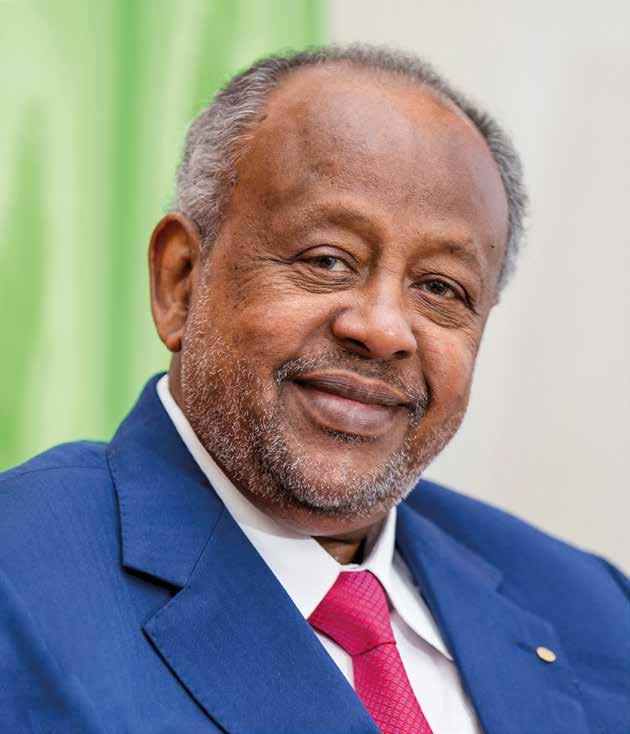
Dear compatriots, Dear friends of Djibouti,
It is with great enthusiasm that I address you on the occasion of the release of the Djibouti Yearbook, our updated economic report. This document is far more than a simple snapshot of our progress—it reflects our vision, our ambitions, and the tangible strides we are making to build a stronger, more modern, and forward-looking Djibouti.
Our priority is clear: to establish Djibouti as an indispensable platform for economic and commercial exchange, at the crossroads of major global trade routes. This ambition takes on its full significance in a world undergoing profound transformation, where each nation is called upon to strengthen its sovereignty and its capacity to rely on its own strengths.
With this in mind, we capitalize on fully leveraging our strengths: a uniquely strategic geographic position, an increasingly competitive business environment, and—most importantly—a skilled and dynamic workforce.
We have reached a turning point: Djibouti is no longer confined to its traditional role as a maritime hub. Today, our country is also emerging as a regional leader in telecommunications, finance, banking services, and energy.
This transformation is the result of targeted investments and unwavering political will to move forward.
Our legal and regulatory framework, now aligned with the highest international standards, ensures transparency, security, and attractiveness for investors.
With this momentum and the growing expertise of our people, Djibouti now offers one of the most promising environments for economic partners worldwide.
The future is unfolding—and Djibouti is moving forward with confidence, determination and ambition.
Ismail Omar Guelleh President of the Republic of Djibouti
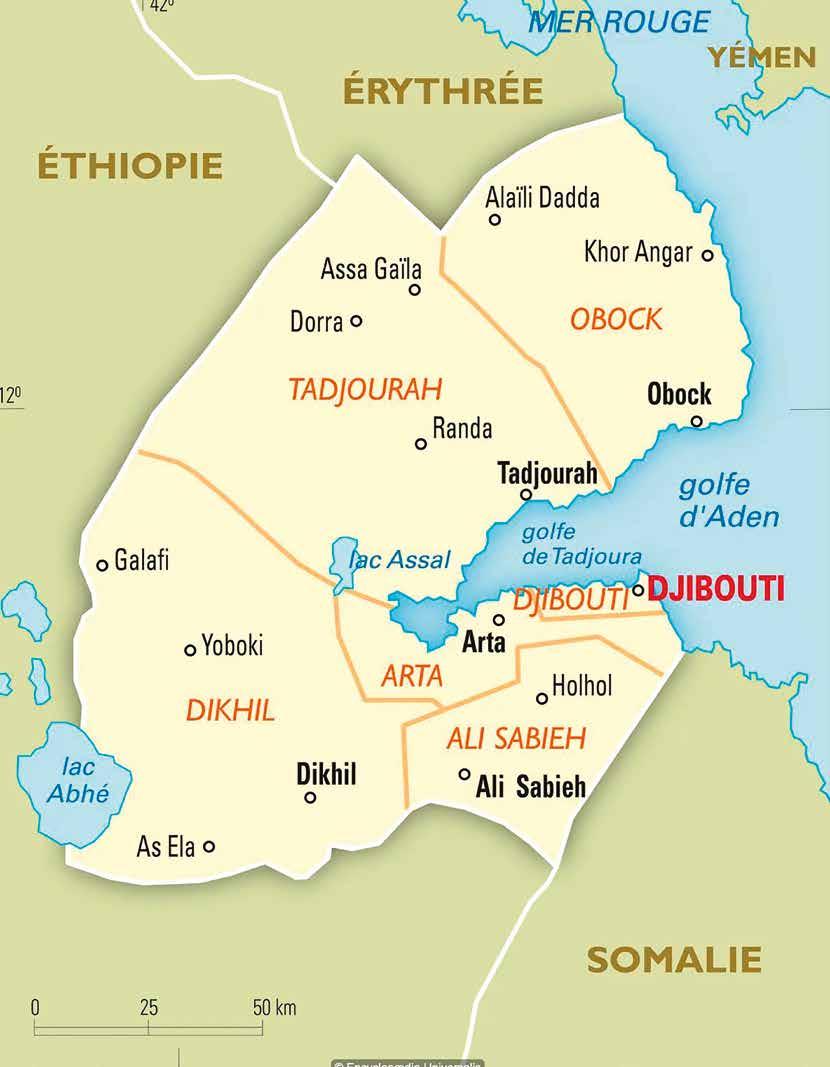

The Republic of Djibouti is located on the borders of Africa and Asia, at the southern end of the Red Sea, with an outlet into the Gulf of Aden. It lies on the Horn of Africa, sharing land borders with Somalia to the south, Ethiopia to the southwest and Eritrea to the north. The Red Sea lies to the east of the country. Djibouti has 372 km of coastline and a maritime area of some 7,200 km2. Located on one of the busiest shipping lanes in the world, Djibouti enjoys an undeniable geostrategic position at the intersection of three rifts.
President of the Republic: H.E. Ismail Omar Guelleh (since May 8, 1999)
Surface area: 23,669 km (9,139 sq mi)
Capital: Djibouti
Major Cities : Djibouti, Ali Sabieh, Dikhil, Arta, Tadjoura
Official Languages: French, Arabic
National Languages: Somali, Afar
Currency Djiboutian Franc (DJF) – pegged to the U.S. Dollar at a fixed exchange rate of 177.721 DJF to 1 USD
National Day: June 27 (Independence Day)
Population (May 2024): 1,066,809 inhabitants
72.8% of whom residing in Djibouti City
Gender Distribution: 49.7% female / 50.3% male
Population Growth Rate: +3.3% annually
Population Density: 43 inhabitants/km in 2020 (World Bank)
Life Expectancy: 67 in 2019 (World Bank)
Adult Literacy Rate: 63% in 2019
Religion: Islam (96%)
Human Development Index: Ranked 171st out of 191 countries (2021)
Administrative Regions: Ali Sabieh, Dikhil, Tadjourah, Obock, and Arta
International conventions: Member of the WTO; Signatory to the Kyoto Protocol; Signatory to the Washington Convention on International Trade in Endangered Species of Wild Fauna and Flora; Signatory to the Basel Convention on the Control of Transboundary Movements of Hazardous Wastes and their Disposal; Signatory to the Montreal Protocol on Substances that Deplete the Ozone Layer.
Regional economic cooperation: Member of the Common Market for Eastern and Southern Africa (COMESA); Member of the African Union (AU); Member of the Community of Sahel-Saharan States (CEN-SAD); Member of the Intergovernmental Authority on Development (IGAD); Member of the Organization of the Islamic Conference (OIC).
International economic cooperation: Member of the United Nations (UN); Member of the World Trade Organization (WTO); World Bank and International Monetary Fund (IMF); Member of the International Maritime Organization (IMO).
Macroeconomic performance
According to the AfDB, the short- and medium-term economic outlook is positive. GDP growth is expected to reach 6.5% in 2024 and 6.6% in 2025. The country's GDP growth is higher than the average GDP growth in East Africa, projected at 4.9% in 2024 and 5.7% in 2025.
The growth in Djibouti’s gross domestic product (GDP) has been estimated at 6.5% for fiscal 2024, driven mainly by the increase in transshipment activities. This dynamism is in fact explained by Ethiopia’s growing demand for Djibouti’s port and logistics services, as well as by domestic consumption sustained by private investment and government measures to mitigate the effects of inflation linked to the Russian invasion of Ukraine.
According to the World Bank’s latest Economic Situation Report, transshipment activity at the port of Djibouti has recorded a notable increase, with a 39% rise in the volume of containers handled in March 2024 compared with November 2023. However, shipping disruptions in the Red Sea caused a considerable rise in sea freight costs, which was reflected in the prices of consumer goods in Djibouti. Inflation remained moderate in 2024, thanks to the Djiboutian authorities’ stabilization of energy and food prices, thus mitigating the impact of export price fluctuations.
The budget deficit for fiscal 2024 has stabilized at around 3.5% of GDP. This stabilization is partly due to the reduction in interest payments resulting from a moratorium on debt servicing agreed with a major creditor, in force until 2028.
Djibouti’s new development plan focuses primarily on the economy to strengthen the sustainability of macroeconomic and public finance reforms to ensure inclusive growth and long-term prosperity for Djibouti.
The current account surplus narrowed slightly in 2024, mainly due to the decline in the trade surplus, linked to the increase in imports needed for major development projects, such as the Damerjog Free Zone (DDID)

The budget deficit is expected to continue narrowing, reaching near-balance in 2024 (0.4% of GDP) and 2025 (-0.2% of GDP).
A chapter of the World Bank report is devoted to the road sector and public spending, highlighting the crucial importance of road infrastructure for Djibouti’s economic connectivity, given its strategic geographical position and the importance of its ports. The World Bank’s portfolio in Djibouti comprises 19 projects totalling $401.3 million. It covers education, health, social safety nets, energy, rural and urban development, modernization of public administration, digital development, strengthening governance, infrastructure and private sector development, with a particular focus on women and youth.
In terms of structural reforms, the implementation of the Public Finance Reform Strategy 2024-2029 will improve public financial management and resource allocation.
Source : World Bank
10 I YEARBOOK DJIBOUTI :Economic report

Interview
with H.E. Abdoulkader Kamil Mohamed, Prime Minister of Djibouti since March 31, 2013. Previously,
he
was Director General of the National Office for Water and Sanitation of Djibouti (ONEAD), Minister of Agriculture, Livestock and Maritime Affairs, and Minister of Defense.
What are the key pillars of your 2025 action plan?
In accordance with "Vision 2035," the objectives are to coordinate government action and continue the enormous effort dedicated to education and specialized higher and vocational training, with the aim of preparing Djiboutians to occupy the new jobs that will result from the development of the new port, energy, and industrial activity zone of Damerjog and, ultimately, to strengthen the development of the current regional hub. Particular attention will be paid to developing and offering green energy in large quantities and at attractive prices for potential investors interested in Djibouti, and in particular in the development of each rural region according to its potential. Finally, to achieve these objectives of government policy in line with social cohesion, we will be emphasizing the coordinated increase in national solidarity actions, which have already been underway for many years. Djibouti’s economic development project and national solidarity are intimately linked.
How do you intend to consolidate your country’s position as a logistics hub?
We are committed to the ongoing modernization of port, rail, and free zone infrastructure, and we are committed to continuing to strengthen our country’s position by enhancing connectivity to transform Djibouti’s regional hub into a regional and continental economic center
and further integrating it into the activities of countries in the region, particularly IGAD countries. Djibouti has an alarming unemployment rate.
What measures do you plan to take to create more jobs, particularly for young people and women?
Creating favorable conditions for youth employment by supporting the alignment of training with market requirements and by strengthening our country’s role as a commercial and financial hub, first and foremost, and by promoting the development of green energy and consolidating the development of the future industrial development zone of Damerjog.
What role should the private sector play alongside the state in Djibouti?
The various reforms undertaken by our country are designed to improve the investment climate. The involvement of the private sector therefore remains essential to our development policy. The first step is to encourage private investment in renewable energy, digital transformation and the development of the new Damerjog development zone, as is already the case with the construction of a refinery and fuel storage areas, as well as the industrial development of the new Damerjog port, for which the state has provided the basic infrastructure.
The Djibouti Vision 2035 strategic plan and the ICI five-year plan
The Government of Djibouti aims to leverage the nation's full potential through its Djibouti Vision 2035 framework. This strategic roadmap is built around three core pillars: Inclusion, Connectivity and Institutions (ICI).
Vision 2035 is a long-term strategic vision whose objective is to position the country as a hub for the regional and continental economy.It was developed in consultation with youth, political parties, civil society, the private sector, and international development partners. It therefore reflects a set of economic, political, and social objectives for all Djiboutian society. To better address challenges and leverage all the country’s potential, the Government has developed the National Development Plan (NDP) 2020-2024, Djibouti ICI, which focuses on consolidating the achievements of the first national development plan (SCAPE 2015-2019) and the NDP. This SCAPE focuses on the foundations of economic growth. The development plan thus aims to stimulate growth and improve people’s quality of life by emphasizing private investment and Djibouti’s geostrategic position.
The second NDP takes into account the international commitments Djibouti has made, particularly the African Union’s Agenda 2063 and the UN Agenda 2030. The overall objective is to make Djibouti a stable, peaceful, clean, secure country providing a conducive environment for private initiatives.
Djibouti ICI outlines the Government’s strategic intentions for 2020-2024 and defines priorities consolidated into 11 flagship programs grouped around three strategic pillars: inclusion, connectivity, and institutions.
The first pillar "inclusion" focuses on accelerated and transformative action for equitable growth and development. This pillar is central to eradicating poverty and social inclusion. The connectivity pillar involves leveraging Djibouti’s geostrategic position to promote economic growth and development. In addition, it considers the transformation of regional
12 I YEARBOOK DJIBOUTI :Economic Report

infrastructure as a catalyst to connect rural areas and ensure their development. The institutional pillar recognizes the need to establish more effective public institutions, thereby accelerating development and serving as the foundation for achieving the first two pillars.
ICI establishes a fundamental framework to address high costs, strengthen national integration, consolidate democratic principles, and guarantee public transparency. By 2035, the Djiboutian territory will be developed and managed in a balanced and sustainable manner through judicious distribution of population and economic activities. Economic expansion and regional development will become major assets.
The Government’s Vision 2035 prioritizes developing high-potential sectors such as tourism, fisheries, information and communication technologies, transport and logistics, renewable energy, manufacturing, and agriculture.
Djibouti, a hub for regional trade
Regional integration is an integral part of Djibouti Vision 2035, the country's long-term strategy to position itself as a regional economic hub.
During his address to senior management at the International Finance Corporation (IFC) onJanuary 23, 2025, President Guelleh reiterated Djibouti’s determination to play a driving role in regional integration and development. Djibouti is the only WTO member state in the Horn of Africa, and its adherence to the Organization’s rules and disciplines will facilitate implementation of the African Continental Free Trade Area (AfCFTA) regulations. Regional integration is integral to Djibouti Vision 2035, which aims to position the country as a regional economic hub through trade, finance, and telecommunications.
As a member of COMESA and IGAD, the country has made efforts for harmonisation, in particular with the introduction of VAT in 2009, the application of regional car insurance and the COMESA customs guarantee. The country seeks to become a hub for trade, finance, and telecommunications. In September 2024, the World Bank approved $90 million in financing for Djibouti’s Regional Economic Corridor Project. This funding will support rehabilitation, upgrading, management, and maintenance of three sections of the Djibouti-Addis Ababa Southern Road Corridor. The project is part of a regional initiative launched in 2019 to strengthen integration and economic ties between Djibouti, Eritrea, Ethiopia, Kenya, and Somalia. It aims to improve regional connectivity and resilience, enhance logistics efficiency, and ensure better accessibility for communities along the corridor. The initiative will facilitate cargo transit, strengthen regional integration, and provide technical assistance to Djiboutian authorities. Taking advantage of its strategic location, Djibouti serves as a critical trade
nexus in the Horn of Africa due to its proximity to the Bab-el-Mandeb Strait—one of the world’s busiest shipping lanes. Through its port infrastructure, the country is considered a strategic partner for landlocked Ethiopia.
CREATING A CORRIDOR TO STRENGTHEN REGIONAL INTEGRATION
On February 28, 2025, Djibouti, Ethiopia, South Sudan, and Uganda signed the agreement establishing the Djibouti-Ethiopia-South SudanUganda Corridor Authority (DESSU. The objective of creating this corridor is to strengthen regional integration by establishing infrastructure links, promoting cooperation, and stimulating economic growth among the concerned countries. The implementation of this agreement should improve connectivity across the continent by linking Djibouti, Addis Ababa, Juba, and Kampala. The project was launched by the Intergovernmental Authority on Development (IGAD, and the four countries signed a memorandum of understanding in 2019. This agreement also provided for the creation of joint steering and technical committees as well as the submission of funding requests to the African Development Bank (AfDB. It was also proposed to launch an initiative prioritizing African coastal shipping for vessels flying African flags, an initiative supported by the Port Management Association of Eastern and Southern Africa.
The Intergovernmental Authority on Development (IGAD)
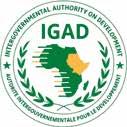
Thisintergovernmentalorganization,ofwhichDjiboutiisa member,aimstopromoteregionalcooperationandintegrationin ordertoaddvaluetomemberstates'effortstoachievepeace,security andprosperity.
Djibouti, Ethiopia, Kenya, Somalia, Sudan, and Uganda took measures through the United Nations to establish the Intergovernmental Authority on Development and drought resilience in their region. Eritrea became the seventh member after gaining independence in 1993, and in 2011, South Sudan joined IGAD as the eighth member state. IGAD’s Vision 2050, headquartered in Djibouti, is structured in three phases. Each ten-year phase focuses on a specific objective. The first phase focuses on applying STI in a natural resource-based economy; the second and third phases are respectively focused on
THE FRANCOPHONIE CENTER IN DJIBOUTI, A HUB FOR EAST AFRICA
The Francophone Regional Center for Africa (CREFA) based in Djibouti, is dedicated to promoting and enhancing the French language and Francophonie throughout the region. After managing local affairs from Ethiopia for many years, the International Organisation of La Francophonie (OIF established itself in Djibouti in 2022. CREFA operates under a headquarters agreement signed with the Government of the Republic of Djibouti concerning the center’s establishment and its privileges and immunities on Djiboutian territory. This agreement includes an annex: a premises agreement signed with the Ministry of National Education and Vocational Training (MENFOP The dynamic cooperation between the OIF and Djibouti consolidates Djibouti’s position as an anchor for the Francophone community in the Horn of Africa.
industrialization and knowledge-based diversification of regional economies. Key intervention areas are food security, socio-economic development, sustainable management of transboundary resources to support development and climate change management, and peace and security.
The first ten years – encompassing the 2021-2025 strategy – prioritize the structural transformation of the region through value addition and industrial diversification, commercialization and expansion of resilient green and blue economies, and sustainable use of natural resources. All these areas heavily depend on technological innovation to increase production and productivity within a peaceful society. These interventions require coordination to facilitate collaboration at regional, national, and continental levels. They must also be linked to global trade support frameworks, appropriate policy, legal and regulatory frameworks, including financial market stability – essential for macroeconomic stability to cushion a more liberalized economy – intra/extraregional infrastructure connectivity, institutional support mechanisms, and integration of SMEs into production and distribution frameworks within the emerging business environment. It is noteworthy that the Djiboutian government is making efforts to strengthen bilateral, regional, and multilateral cooperation in the fight against irregular migration, human trafficking, and migrant smuggling. Its active participation in regional, continental, and global consultation processes and the strengthening of bilateral, regional, and multilateral cooperation represent opportunities to achieve the objectives of the Global Compact on Migration.

Regional and and sub-regional cooperation
Djibouti lies at the heart of a market of more than 400 million people, encompassing the COMESA countries and those of the Arabian Peninsula. The ratification of the TFTA in October 2024 represents a decisive step towards regional economic integration.

Beyond IGAD, Djibouti is a member of the Common Market for Eastern and Southern Africa (COMESA). A core part of COMESA’s success has been its specialized institutions. These are needs-based and address highly specific niches in the region. To support the integration agenda, COMESA has established financial institutions to provide not only essential credit (theTrade and Development Bank) but also insurance against non-commercial risks (the African Trade Insurance Agency), reinsurance (ZEP-Re), facilitate international payments (theRegional Payment and Settlement System), and promote competition in the region (the COMESA Competition Commission)
With an area of 12 million km , COMESA covers nearly two-thirds of the African continent. COMESA member states are Burundi, Comoros, Djibouti, Egypt, Eritrea, Eswatini, Ethiopia, Kenya, Libya, Madagascar, Malawi, Mauritius, Uganda, the Democratic Republic of the Congo, Rwanda, Seychelles, Somalia, Sudan, Tunisia, Zambia, and Zimbabwe.
Furthermore, on October 8, 2024, Djiboutian authorities adopted a Draft Law ratifying the Tripartite Free Trade Area (TFTA) Agreement between the Common Market for Eastern and Southern Africa (COMESA), the East African Community (EAC), and the Southern African Development Community (SADC). This ratification will enable Djibouti to actively participate in this regional initiative aimed at enhancing economic prosperity and strengthening cooperation among member states.
The TFTA agreement is based on three fundamental pillars: integrating the markets, industrialization and infrastructure development. Its objective is to promote the economic and social development of the tripartite region.
Under the Vision 2035 aimed at establishing Djibouti as a commercial, logistics, and financial hub in Africa, Djibouti signed the General Trade Agreement (GTA) with Ethiopia in March 2017, replacing the 1979 agreement. This agreement seeks to facilitate trade cooperation, promote, and diversify exchanges. The parties committed to strengthening regional and continental trade mechanisms such as IGAD, the Horn of Africa Initiative, COMESA, and AfCFTA. The GTA covers various areas, including trade promotion, goods transit and passage, trade practices, security measures, non-tariff barriers, and dispute settlement.
Stimulating industrial production—a core objective of Djibouti’s Vision 2035—emphasizes expanding industries with commercial potential within COMESA and beyond. Free zones play a key role
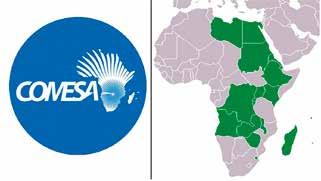
in these development efforts by helping attract capital through targeted incentives and enabling participating businesses to leverage economies of scale offered by clustered industrial operations. Given Djibouti’s geostrategic position as an entry point for trade with over 400 million potential consumers in East Africa, the country is well-positioned to capitalize on the ongoing global realignment of supply chain strategies.
MAHAMOUD ALI YOUSSOUF, PRESIDENT OF THE AFRICAN UNION (AU) COMMISSION

On February 15, 2025, during the 38th Ordinary Session of the AU Assembly of Heads of State and Government in Addis Ababa, Mahamoud Ali Youssouf was elected as the new President of the AU Commission—the highest position in the continental organization. Born in February 1965, Mr. Youssouf was the youngest candidate. In 1990, he earned a Master’s in Management from Université Laval in Quebec, Canada, before completing a public management training program in the same country. Fluent in five languages—French, English, Arabic, Afar, and Somali—Mr. Youssouf served as Djibouti’s Minister of Foreign Affairs and International Cooperation since 2005, concurrently holding the position of Government Spokesperson. He played a key role in IGAD’s mediation of the Sudan conflict. From May 2001 to 2005, he was Minister Delegate for International Cooperation.
Appointed as Djibouti’s Ambassador Extraordinary and Plenipotentiary to Egypt and Permanent Representative to the League of Arab States from 1997 to 2001, he simultaneously served as Non-Resident Ambassador Extraordinary and Plenipotentiary to Sudan, Lebanon, Syria, and Turkey. Between 1996 and 1997, Mr. Youssouf headed the Arab World Department, responsible for promoting Djibouti’s bilateral relations with Arab states. Previously, he held the position of Deputy Director of International Organizations at the Ministry of Foreign Affairs from 1993 to 1995. As Chairperson of the African Union Commission, his mandate is to advance integration, prosperity, and peace across the continent. His mission also includes reforming the organization and strengthening its role in crisis prevention and management. Top priorities include: the conflict in eastern Democratic Republic of Congo (DRC), the war in Sudan, and implementation of the African Continental Free Trade Area (AfCFTA)

Interview with Abdi Ibrahim Farah, Director
General of Djibouti Ports Corridor Road SA (DPCR SA), whose primary mission is to contribute to improving the connectivity of the Ports of Djibouti with the hinterland.
Can you introduceyour organization?
Djibouti Ports Corridor Road SA (DPCR SA) is a public company created in 2018, responsible for the management, modernization, and maintenance of road corridors linking Djibouti’s ports to the hinterland, particularly Ethiopia. Our primary mission is to improve regional connectivity to facilitate commercial exchanges, stimulate economic growth, and position Djibouti as a leading logistics hub in Africa. We fully align with Vision 2035, an ambitious strategy aiming to establish Djibouti as a benchmark economic, commercial, and financial center at regional and international levels. By strengthening road infrastructure, DPCR SA plays a key role in this transformation by streamlining goods flows, reducing logistics costs, and integrating innovative and sustainable solutions. Our approach relies on three major pillars: Modernization of existing infrastructure to ensure a reliable and efficient network; lConstruction of new strategic corridors to enhance connectivity and respond to growing traffic; Integration of advanced technologies to optimize flow management and guarantee user safety.
What are the current projects?
DPCR SA is currently carrying out several largescale projects to strengthen the country’s road and hydraulic infrastructure. The rehabilitation of the 18
Doudoubalala-Dikhil section of the RN1 remains one of our top priorities. This project concerns a strategic corridor for trade between Djibouti and Ethiopia. Urban roadway rehabilitation work in Dikhil has progressed significantly, with major interventions to improve road infrastructure and drainage. We are also continuing reinforcement work on the RN3’s hydraulic structures—an essential corridor connecting Djibouti’s port infrastructure, notably SGTD, DMP, and the Doraleh Oil Terminal (HDTL).It is important to emphasize that these projects are implemented in close collaboration with local SMEs. We meticulously track each project’s progress through a team of highly qualified engineers. This approach not only ensures project reliability but also supports the local economy by leveraging national expertise.
Is the digital fleet management system for goods between Djibouti and Ethiopia already efficient?
The launch of the Fleet Management System (FMS) by the Ministry of Infrastructure and Equipment, through DPCR SA, indeed represents a major turning point for regional logistics. This project, supported by €32 million in funding from the European Union through the French Development Agency (AFD) and implemented by TradeMark Africa, is part of the Horn of Africa Initiative with a clear objective: to optimize transport, reduce logistics costs, and enhance regional competitiveness. The RFID infrastructure and software platform enable not only real-time truck tracking but also more precise management of transit times and routes, thereby boosting productivity. Furthermore, its solar-powered operation ensures autonomy and extensive coverage, even in the most remote areas.
This modern and sustainable management system, aligned with Vision 2035’s goals, positions Djibouti as a model of logistics innovation and is projected to significantly improve trade efficiency in the region.
Djibouti, an emerging space power
Djibouti is determined to play a leading role in the space sector. A commitment serving agriculture and environmental change monitoring in particular.
Djibouti, located at the crossroads of Africa, Asia, and the Middle East, possesses a strategic location that makes it an ideal platform for space infrastructure. Its proximity to the equator reduces space launch costs—a characteristic shared with other countries hosting launch bases.
In November 2023, Djibouti successfully launched its first satellite, Djibouti 1A, using a SpaceX launch vehicle under a program developed with the University Space Center of Montpellier (CSUM). This achievement allows it to join the highly exclusive circle of African nations with their own space satellites. The satellite was fully designed by Djiboutian engineers and technicians.
As an integral part of the HydroSat project—whose primary goal is to collect and transmit crucial data for the Djibouti Center for Research and Studies (CERD)—this satellite plays a vital role in real-time national data collection. These strategic datasets, covering temperature, rainfall, river depth, and hydrometry, aim to improve agriculture and monitor nationwide environmental changes. The delivery of high-definition spectral information to decision-makers is particularly critical in a country where water management is a major challenge due to its arid and mountainous geography. This project will thus strengthen environmental resilience and support Djibouti’s sustainable development policies. Ten trained Djiboutian engineers and technicians collaborated with companies involved in all project phases: from design to manufacturing, satellite launch, and associated software enhancement.
The second nanosatellite launched in December 2024. While Djibouti-1A overflies the country three times daily, Djibouti-1B achieves up to four daily passes, significantly enhancing environmental observation and data-collection capabilities. A third satellite with more powerful imaging precision is currently in preparation.

In early 2023, Djibouti signed a partnership agreement with Hong Kong Aerospace Technology to build a satellite and rocket launch facility in the northern region of Obock. This billion-dollar spaceport project will also include the construction of a port facility, a power grid and a highway to ensure reliable transportation of aerospace materials. The project is scheduled for completion within the next five years. In December 2024, the President of the Republic signed with his French counterpart a major project to develop Djibouti’s space agency to create a full-fledged remote sensing center to collect images, process and prevent risks. A strong signal of the country’s commitment to a sustainable and innovative future.
Theprivatesectoristhekeydriverof ourfutureeconomicgrowth.Weare committedtoremovingobstaclesto itsdevelopmentbysimplifying administrativeproceduresand creatingamuchmorefavorable businessenvironment.Weencourage privateinvestmenttocreatejobsand stimulateinnovation.
ExcerptfromPresidentIsmailOmarGuelleh’sAddressatthe DjiboutiForum,May13,2024
Invest
The Republic of Djibouti lies at the heart of a market of over 400 million inhabitants, including the COMESA countries and those of the Arabian Peninsula. The country thus offers great opportunities for businessmen looking for new emerging markets.
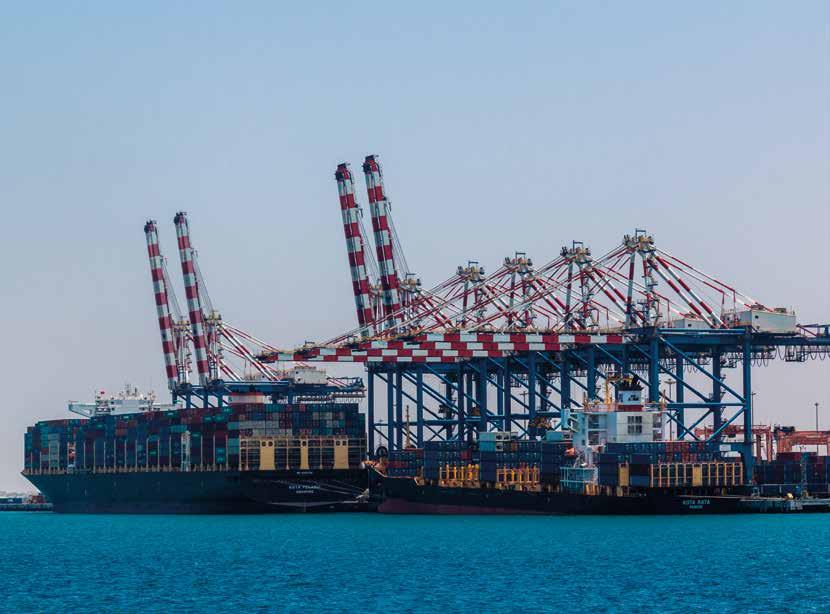
10 REASONS TO INVEST IN DJIBOUTI
1. / Djibouti is located on the world’s second-busiest maritime route, handling 60% of global traffic;
2. / The country is strategically positioned in the region to serve as a hub for landlocked nations;
3. / The country enjoys political stability as an additional asset;
4. / Equal rights are granted to nationals and foreigners alike;
5. / The national currency is pegged to the US dollar, freely convertible, with low inflation;
6. / The financial system has no exchange controls, allowing complete freedom of currency transfers;
7. / Djibouti boasts world-class infrastructure: ports, airports, telecommunications, transport, and logistics;
8. / The country serves as a natural gateway to a market of over 600 million inhabitants;
9. / Market access is enhanced through membership in free-trade zones like COMESA, AGOA, ACP, Arab markets, and the prospective AfCFTA;
10. / The country is a member of MIGA (Multilateral Investment Guarantee Agency) for investment protection and ICSID (International Centre for Settlement of Investment Disputes) for dispute resolution.

Djibouti now positions itself as an indispensable strategic hub at the crossroads of Africa, Asia, and Europe. Our country has resolutely chosen to make private investment a central pillar of its economic development, ensuring a conducive, stable, and attractive environment for domestic and international investors.
In this dynamic, the Djiboutian State has established efficient tools and dedicated structures to support and facilitate investment projects. At the core of this system is the Secretariat of State for Investment and Private Sector Development, whose technical arm—the National Agency for Investment Promotion (ANPI)— plays a key role. ANPI hosts the One-Stop Shop platform, serving as the entry point for economic operators in Djibouti. It assists project holders at every stage: from company registration to obtaining approvals, including land access, administrative procedure facilitation, and connections with relevant institutions. Complementing this institutional support, the Republic of Djibouti has implemented an attractive, clear, and competitive fiscal framework. The Investment Code, currently under revision, offers significant benefits to eligible projects, including tax exemptions on profits, customs duties, and various fees. Modern free trade zones with world-class infrastructure allow businesses to operate free of many fiscal and administrative constraints, enhancing their regional and international competitiveness. Djibouti has established itself as a major logistics platform in East Africa through an efficient network of integrated infrastructure. Notably, the Djibouti International Free Trade Zone (DIFTZ) offers investors highly advantageous conditions and tools. Strategically located near world-class port facilities,
these free zones provide rapid access to regional and international markets. They constitute an essential lever for our country’s economic development strategy and an attractive entry point for international investors. Under Vision 2035, Djibouti has identified priority sectors for economic development:
- Transportation and logistics: Leveraging its strategic location, Djibouti aims to become the logistics nerve center of East Africa.
- Renewable energy: The country targets energy selfsufficiency using 100% renewable sources by 2035.
- Information and communication technology (ICT): Djibouti positions itself as a digital hub.
- Agriculture, fisheries, and livestock: Initiatives valorize natural resources to ensure food security and create jobs.
- Health and education: Investments will strengthen healthcare and educational infrastructure.
- Sustainable tourism: The country seeks to promote its natural and cultural heritage through environmentally and communityconscious tourism.
Through this Yearbook, we highlight the Government’s efforts to stimulate productive investment, strengthen private partners’ confidence, and promote inclusive and sustainable growth. We also showcase high-potential priority sectors, entrepreneur and investor success stories, and our economy’s transformation. Djibouti is on the move, and openness to the world remains central to our strategy. We invite investors to discover—through these pages—a nation of opportunities: committed, resilient, and ready to build a prosperous future with its partners.
Safia Mohamed Ali Gadileh, SecretaryofStateinChargeofInvestments andPrivateSectorDevelopment
A legal and judicial system for business and investment
The Ministry of Justice has achieved the strengthening of legal protection for investors, which earned the Republic of Djibouti second place in the ranking of the 192 countries assessed, in terms of investor protection.
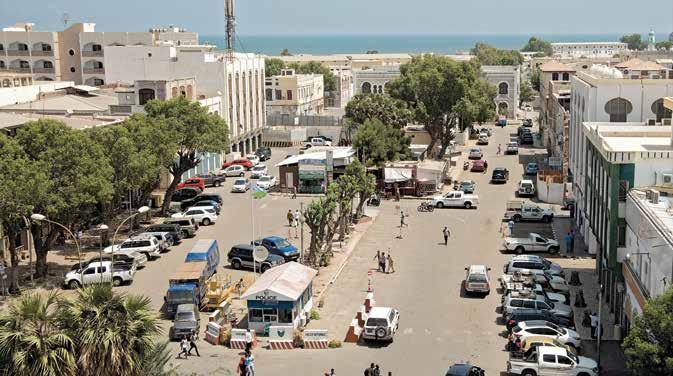
To ensure an improved business climate, the Ministry of Justice, in collaboration with the National Investment Promotion Agency, has undertaken comprehensive reforms of the legal and judicial system for commercial matters.
The Ministry has also established a specialized division within the First Instance Court for commercial dispute resolution. Accordingly, the commercial court has been strengthened through external training programs for judges and knowledge-exchange initiatives with model jurisdictions The preliminary hearings have been restructured. The courthouse has been equipped
with an integrated case management system designed to ensure transparency and traceability in dispute resolution procedures. Access to this system has been granted to legal practitioners, who received specialized training for electronic filing of summonses. To guarantee transparency upstream of the judicial process, case assignments to judges are no longer handled by the Court Clerk’s Office. From now on, an automated computer system now randomly allocates cases based on filing chronology. In this way, litigants are protected from any form of inequity or subjectivity in the handling of cases.

These measures have improved the speed and transparency of commercial dispute resolution procedures. To illustrate, according to the World Bank’s Doing Business Report, average processing times have decreased from 1,225 days to approximately 295 days. The Court’s electronic platform has been upgraded to enable the publication of final Commercial Chamber rulings on the Ministry of Justice’s website. Furthermore, the Ministry of Justice has enacted a new Civil Code (Law No. 003/ AN/18/8th L) and a Code of Civil Procedure (Law No. 004/AN/18/8th L), replacing Napoleonic-era legislation. These texts introduced new procedures for multiple conciliations and voluntary mediations, as well as standard timelines for key judicial events. Regarding insolvency proceedings, the Ministry of Justice has made bankruptcy procedures more accessible to creditors by increasing their participation in the process. New legislation has also introduced payment orders for bounced checks. For minority shareholder protection, the Ministry of Justice has strengthened safeguards for minority investors by:
• Requiring greater disclosure of transactions with interested parties,
• By strengthening remedies against interested directors,
• Expanding access to pre-trial corporate information,
• Strengthening shareholder rights and their role in corporate decision-making
• Clarifying ownership and control structures while requiring greater corporate transparency. Regarding business financing facilitation, numerous legal instruments have been enacted. Key measures include:
• Leasing
• Movable Collateral
• Credit Registry
The Commercial Code has undergone successive reforms to simplify business registration. Entity registration at the Trade and Companies Registry (RCS), Patent Roll, and social security enrollment are now processed at the One-Stop Shop platform housing duly authorized representatives of competent institutions in real-time sessions. Further streamlining business creation procedures, the revised Commercial Code established a new series for registering corporate formation documents through the One-Stop Shop platform in real-time processing. This reform matrix initiated by the Ministry of Justice has improved the Republic of Djibouti’s ratings in international assessment systems for ease of doing business within a conducive legal-regulatory environment.
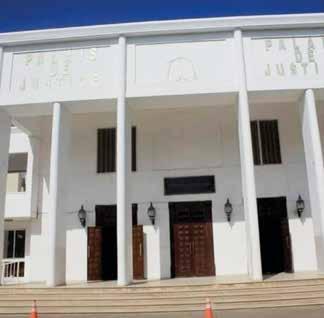
Investment framework
In recent years, the Republic of Djibouti has enjoyed sustained economic growth averaging 7%. This performance is the fruit of the implementation of an economic development model, defined in Vision 2035, which aims to turn Djibouti into a vast logistics, trade and banking hub.

To achieve this objective, the Government— with support from development partners—has invested heavily in key sectors such as port infrastructure, railways, and telecommunications.
However, sustaining these gains and successfully transforming Djibouti into a modern, high-performance, and competitive economy requires broadening investments toward greater diversification. This will enable Djibouti to better master its structural economic transformation and ensure private sector predominance.
As part of improving the business and investment climate, the country has implemented an ambitious reform strategy. The results reflect the commitment of national authorities and efforts by relevant institutions under the coordination of the National Investment Promotion Agency (ANPI)
Implemented reforms have enhanced business environment performance, ranking Djibouti among the top 10 reforming countries with significant score improvements across various key indicators. The investment environment in the Republic of Djibouti is characterized by a number of assets and comparative advantages, such as its world-class monetary and banking system, and its modern road, rail, port, airport and telecommunications infrastructures. Indeed, in addition to its highly strategic geographical position and hub status, Djibouti offers immense investment opportunities in almost every economic sector, as well as an appropriate legal and regulatory environment. Djibouti’s membership in duty-free zones and preferential trade agreements— including COMESA, the EU-ACP Agreement, and the African Growth and Opportunity Act (AGOA) —opens access to major markets.
Furthermore, investment projects in the Republic of Djibouti are eligible for financing and other facilities from specialized institutions such as the Islamic Development Bank, the World Bank, and Arab Funds. Investments also benefit from preferential insurance premiums through the Multilateral Investment Guarantee Agency (MIGA) and the Arab Investment and Export Credit Guarantee Corporation. The One-Stop Shop platform hosts and provides services from 16 public and parastatal institutions. All required investor formalities and procedures are completed in one location, with reduced time and lower costs. This platform also offers personalized services including advisory support, standard logistical assistance, and protocol facilities..
The Republic of Djibouti ensures legal security for political and economic actors. Good governance, transparency, and efficiency are tangible realities in public and private affairs. Djibouti’s political and economic choices are clearly affirmed, notably free competition, protection of private property, and regional/ continental integration.
To this end, the government has implemented multiple measures to enhance business attractiveness. These measures include: Tax incentives during investment implementation and operation phases, adoption of a flexible labor code permitting hiring flexibility and freedom, creation of a public-private dialogue framework, access to arbitration through the International Centre for Settlement of Investment Disputes (ICSID) for disputes, freedom to transfer income from invested capital, embership in the Multilateral Investment Guarantee Agency (MIGA),
unrestricted access to public procurement, transparent tender award procedures.
Additionally, the Public-Private Partnership Law has been adopted and the Djibouti Economic Development Committee established, enabling investors to submit unsolicited proposals for PPP projects. The government’s business climate improvement strategy is crystallized through the operationalization of the comprehensive One-Stop Shop, reducing formalities, timelines, and costs for business creation and expansion.
Djibouti’s membership in free-trade zones and preferential treatment agreements—including COMESA, the EU-AfricaCaribbean Agreement (ACP), and the African Growth and Opportunity Act (AGOA)—unquestionably opens major market opportunities. Investment projects or programs in the Republic of Djibouti are eligible for financing and other facilities from specialized institutions such as the Islamic Development Bank, the World Bank, the African Development Bank, and Arab Funds.

THE FREE ZONES FISCAL INCENTIVE REGIME
The Free Zones, which fall under the authority of the Ports and Free Zones Authority (PFZA), offer an attractive incentive regime for businesses, notably including 100% authorized foreign ownership, the free repatriation of capital and profits, as well as a full exemption from all direct and indirect taxes for a period of 50 years. Imports into the Free Zones are also exempt from VAT and customs duties, and can be re-exported duty-free. These are complemented by administrative benefits, including a simplified registration procedure and assistance in obtaining work permits and visas for companies wishing to establish themselves within the Free Zones.
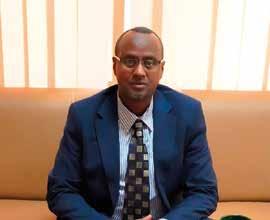
Interview with Mahdi Darar Obsieh, Director General of the National Investment Promotion Agency (ANPI), a public entity tasked with boosting private investment—both foreign and domestic—and monitoring private sector development.
What are ANPI’s main missions and priorities today?The National Investment Promotion Agency (ANPI), created in January 2001, is a private limited company with up to 49% private-sector ownership. ANPI aims to create synergies among all stakeholders involved in private sector promotion and development, providing them a common platform for promoting Djibouti, facilitating investment operations, and modernizing regulatory frameworks and procedures.
Why a public limited company?
To symbolically mark a desire for efficiency and openness; For the sake of international harmonization (in most developed and developing countries, national foreign investment promotion agencies are private structures combining the public and private sectors); To facilitate greater management flexibility and, finally, to enable the private sector to participate in and influence the agency’s orientations and work. Two decades after its inception in the country’s institutional landscape, the National Investment Promotion Agency has successfully accomplished its missions. For comparison, Djibouti’s Foreign Direct Investment data, sourced from the World Bank’s "World Development Indicators" and UNCTAD statistical databases, are benchmarked against subregional peers. The investment rate, which was only 13% in 2000-2005, rose to an average exceeding 31% in 2005-2010—significantly higher than
2828 II : YEARBOOK DJIBOUTI : Economic report
neighboring countries.
From 2010-2020, this rate dipped slightly to around 23%, stabilizingnear 25% through 2024. This performance demonstrates Djibouti’s attractiveness and competitiveness as a destination. However, amid evolving national and global economies, ANPI must innovate to better contribute to investment development and the emergence of a dynamic private sector that creates jobs and wealth. Consequently, strategic directions have been developed to consolidate the investment framework and foster a more business-friendly environment.
What reforms have been implemented to encourage investment?
ANPI has coordinated and driven the implementation of a comprehensive reform program to improve the business and investment climate. This matrix of legal, regulatory, and institutional reforms has enabled our country to :
- Rank among the world’s top 10 reforming countries for 3 consecutive years, notably through significant reduction of business creation timelines, costs, and procedures via the operationalization of the One-Stop Shop and its integrated platform housing all businessrelated institutions.
- Achieve the first reform of the Civil Code and the Code of Civil Procedure.

- Establish at the Central Bank level: A national payment system; Interbank interconnectivity; A credit registry; A movable collateral registry; A legal framework for leasing.
- Reform the Commercial Code,
- Establish a Multisector Regulatory Authority,
- Streamline the legal-regulatory framework for building permit issuance, property transfer and registration, electricity connection, and public procurement procedures.
Are there specific incentives to diversify investments by prioritizing certain sectors?
You should know, the Republic of Djibouti offers investment opportunities in virtually all sectors, with certain strategic focus areas. Specifically, sectors like Logistics-Transport, Tourism, Energy, ICT, Fisheries, Banking & Finance are designated as strategic priorities. The Health sector and Industry (particularly import substitution) are also prioritized. These focus sectors qualify for a specific package of fiscal and structural facilities, as well as many additional bonuses.
What are the main challenges facing Djiboutian entrepreneurs?
The strategies and measures implemented to improve the business climate have yielded significant results. Statistics clearly demonstrate this: business creation has risen from an annual average of 400 entities to over 1,200 entities, representing a 300% increase. However, constraints related to factors of production—particularly energy access and financing—continue to challenge entrepreneurs. To address the energy constraint, the government is promoting renewable energy development through Public-Private Partnerships (PPP).
How do you see investment evolving in Djibouti over the next 5 to 10 years? Djibouti has maintained positive and stable growth rates over the past decade, with prospects under the best auspices. The country has taken full advantage of its geostrategic position by developing core infrastructures, consolidating its legendary stability and streamlining the business and investment environment. At the dawn of 2025, investment flow trends are promising and indicate an upward trajectory in the near to medium term.
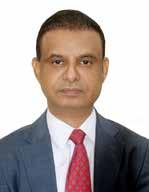
Interview with Abdulraqeb Salem, Director General of Saba African Bank, a financial institution playing an increasingly prominent role in the African banking landscape. Under his leadership, the bank has embarked upon an ambitious growth strategy.
Could you introduce Saba African Bank and outline your current strategic priorities?
Saba African Bank has been operating in Djibouti since 2006. Initially as a branch of Saba Islamic Bank, it became an independent, locally incorporated entity in 2017, aligned with Islamic finance principles and international banking standards.
The bank provides a full range of services to individuals, businesses, and international organizations, driven by strong investment in human capital and product innovation, especially in domestic financing and trade.
It operates a nationwide branch network, including Djibouti’s free zones (Djibouti Free Zone and DIFTZ), and maintains robust ties with international correspondent banks.
Its digital transformation has accelerated with the adoption of the Temenos core banking system (T24), digital platforms such as Saba Mobile and E-Banking, and the rollout of ATMs and Bank cards.
Saba African Bank supports national priorities, notably through its real estate projects: Saba City in Doraleh and the housing project in Nagad (approximately 3000 units, 60% of phase one completed) It also has an office in Addis Ababa and subsidiaries in takaful insurance (ATIC), real estate (Saba Turk), and remittances (Saba Money Transfer). Today, the bank focuses its strategy on digital and regional expansion, with a mission to support economic development and financial inclusion.
Whatconcreteinitiativeshaveyouimplementedtoreach unbankedpopulations?
Saba African Bank has positioned itself as one of the first institutions in Djibouti to actively target unbanked segments, consistent with its vocation as an Islamic bank oriented toward financial inclusion. It designs practical solutions that account for the country’s social diversity. Among its concrete initiatives are accessible real estate products for middle- or modest-income households, an educational product aimed at supporting students and alleviating family burdens, as well as the "Family Account," designed to encourage long-term savings within The bank has also implemented "Tas’heel" financing, structured as a profit-free financing (qard hassan), intended for low-income employees, and offers agricultural financing for local producers as well as solutions for young and women entrepreneurs, in line with national priorities.
Aware of women’s pivotal role in economic and social development, the bank also grants specific benefits to women within certain products, thereby strengthening their financial empowerment.
On the digital front, Saba African Bank has developed the Saba Mobile application, integrating a Digital solution (Saba Pay) for settling purchases, cash withdrawals, transfers, and bill payments. In parallel, it regularly conducts awareness and financial education campaigns, thereby affirming its societal commitment to inclusive and sustainable development.
In your view, what role should banks play in the economic development of African countries, particularly Djibouti?
Banks are key drivers of economic growth. They must finance productive projects and infrastructure, particularly for SMEs, while expanding financial inclusion through digital services.
They also build investor confidence by fostering a stable and transparent financial environment. Moreover, banks are instrumental in channeling funds toward strategic sectors such as agriculture, logistics, and sustainable initiatives, thus supporting the green economy and broader development goals.
Private investment under the under the Investment Code
With its unique position, Djibouti has all the advantages to expand its market and attract international private investors. The country is a gateway to a market of 400 million consumers.
Within the framework of investment development and the emergence of a private sector driving the national economy, the structure of the national taxation system includes a derogatory tax regime. This tax system grants tax relief and incentives to investment projects promoted by national and international operators.
Tax incentives constitute an instrument of economic policy whose cost is lower than that of direct budget expenditures. The objectives assigned to derogatory tax regimes (exemptions) are essentially:
- Sectoral development
- Strengthening production and export capacities,
- Knowledge transfer,
- Growth and its corollaries of wealth and job creation. Have derogatory tax regimes fully or partially achieved the pursued socio-economic objectives? Or conversely, have they induced an erosion of the tax base and fiscal inequity and distortion by favoring certain taxpayers to the detriment of others?
Only the existence of appropriate monitoring and evaluation mechanisms is capable of ensuring the balance between the efforts made through tax incentives and the expected counterparts. The ANPI thus implements a monitoring and control protocol upstream, during, and downstream of investment projects. This protocol consists of quantitative and qualitative evaluation parameters as well as performance indicators.
Customs services and the ANPI periodically cross-check data and jointly establish a statement of import values by regime and by company. This same mechanism of crosschecking and validation is carried out respectively with tax services and the CNSS regarding taxes, duties, and employment.
Macroeconomic Aggregates of Investment Flows
Over the period 2018-2023, the cumulative flow of private investments amounts to 882 million USD. For the 2023 fiscal year, investment flow reached 263 million USD, compared to 86 million USD in 2022, representing an increase of approximately +203%. FDI represents 55% of these flows, and national private investments account for 45%
Investment flows
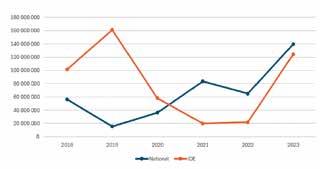
Source:ANPI,2023,amountinUSD
Despite the relatively high cost of production factors, a growing trend in productive investment is observed. This trend must be strongly encouraged to enable the country to diversify its economic structure for greater resilience to exogenous factors. Productive investments constitute a substitution for the import of similar products and develop the countrys export capacities.
The 2023 investment flows, exceeding 45 billion FDJ, positively impacted the countrysocio-economic fabric. They induced the collection by public finances of approximately 4.5 billion FDJ against approximately 2.9 billion FDJ in foregone revenue. Besides these 4.5 billion FDJ collected by the State in taxes, duties,
:
Breakdown of approved investments by origin 2018-2023

Breakdown by business sector
Source : ANPI, 2023
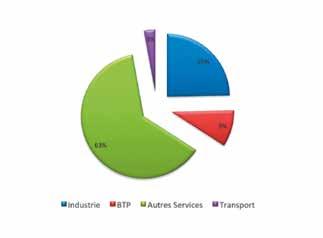
and other direct levies, the 2023 investment flows also generated the payment of 6.6 billion FDJ in salaries for permanent direct jobs and social contributions of 1.5 billion FDJ to the CNSS.
A financial flow of approximately 3 billion FDJ is also noted, corresponding to charges paid by investmentpromoting companies to public service institutions (EDD, ONEAD, Djibouti-Télécom, etc.). Consequently, the Agency achieved a net contribution of over 50 billion FDJ to the national economy in exchange for the State’s contribution in the form of an annual subsidy of 68.7 million FDJ. Hence a cost/benefit ratio of 1 to 508. The efficiency of the ANPI’s services can be measured when the global average cost/benefit ratio for IPAs (Investment Promotion Agencies) is 1 to 178. These private capitals aggregate into the GDP. These consolidated data, combined with the turnover of investment-promoting companies, represent around 17% of GDP.
Improvement of the Business Climate
ANPI has coordinated a vast program of legal and institutional reforms that have enabled our country to: 1 - Rank among the top 10 global reformers for 3 consecutive years, notably through the significant
reduction of business creation timelines and costs with the operationalization of the One-Stop Shop via an integrated platform of all institutions in charge of business affairs.
2 - Achieve the first reform of the Civil Procedure Code and Civil Code since the mid-19th century.
3 - Establish at the Central Bank level:
a.A National Payment System, b.Interbank Interconnectivity, c.A Credit Registry,
d.d. A Movable Collateral Registry, e.A legal framework for leasing.
4 - Reforms of the Commercial Code
5 - Establishment of a Multisectoral Regulatory Authority
6 - An improved legal framework for building permits, property transfers, registration, electricity connection, and public procurement.
Business Creation
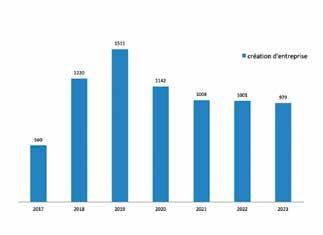
Source : ANPI, 2023
The Entrepreneurial Ecosystem
These reforms resulted in a substantial increase in the number of companies registered at the One-Stop Shop, rising from an annual average of 450 entities in 2017 to over 1,000.
Business Survival Rate
A study on the survival rate of these created businesses is underway. The selected representative sample has enabled the breakdown of:
- Active / inactive companies;
- Sectors of activity, legal form, gender, age groups, nationality, and education level of promoters;
- Main challenges and failure factors.

Business sectors in 2023
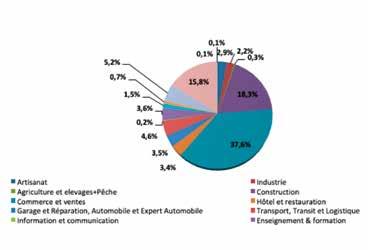
Source : ANPI, 2023
Business creation by nationality in 2023
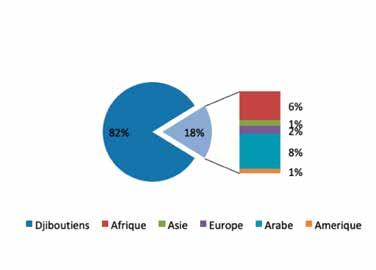
Source : ANPI, 2023
This ongoing study has already yielded significant findings on the issue. The analysis reveals an overall business mortality rate of 49.93% and a survival rate of 50.07%, with notable variations according to sector, gender, age group, education level, etc. This survival rate aligns with the global average and pays tribute to the resilience and perseverance of national promoters despite structural constraints, primarily access to financing and the burden of taxation and social charges.
Investment Promotion and Country Marketing Vectors
As part of its investment promotion strategy, the Agency provides national and international investors with all information regarding the business environment and investment opportunities through:
• Materials:
• Websites: djibouti-invest.com, guichet-unique.dj and theiguides.org/Djibouti
• Social media
• Informational brochures and magazines
• Exhibit booth deployment
• Participation/organization of national, regional, and international events, promotional Road Show tours.
• Membership in specialized structures and institutions (WAIPA, RIA... AfrIPANet, specialized subsidiaries of WB, IDB, AfDB, COMESA...)
• Participation in IPPA development
Land management
As part of diversifying its services, ANPI has strengthened its capacities in several vital areas in recent years and expanded its fields of action and support for private investments, particularly regarding economically zoned land. The goal is to provide companies with adequate infrastructure for project implementation. Furthermore, the State has allocated a 100-hectare land parcel to better address investor access to land.
Partnership with the Private Sector
The Agency’s General Directorate has continuously pursued partnership efforts with national and international private operators. Under a new ACTIVE investment promotion approach and leveraging its land reserve concession, ANPI has revitalized its partnership initiatives with private operators for implementing economic projects.
Perspectives
• Online company creation
• Effective implementation of the Foreign Trade One-Stop Shop
• Interfacing the exemption management/tracking system with Customs’ SYDONIA+ system for real-time monitoring of foregone revenue
• Optimization of the National Payment System and suite of specialized registries at the Central Bank
• Coordination and harmonization between the two derogatory tax regimes (Investment Codes and Free Zones Codes)

Djibouti’s Assets in the AfCFTA
With the implementation of the African Continental Free Trade Area (AfCFTA), Djibouti aims to strengthen its position in regional value chains.
The Strategic Vision 2035 and the NDP 2020-2024, guarantee a successful implementation of the AfCFTA in Djibouti. To achieve this, appropriate regulations must be established to guarantee optimal openness in the services sector and trade in goods in compliance with the Agreement’s provisions. Djibouti must therefore address challenges related to capacity building for both public sector stakeholders and private operators regarding trade liberalization in general and under the AfCFTA in particular, as well as the need to mobilize financial resources to implement reforms.
The Djibouti Ports and Free Zones Authority (DPFZA) has initiated several flagship initiatives aimed at facilitating free trade in Africa. Among these is the innovative Sea-Air Cargo concept, which combines maritime and air transport to optimize cargo delivery across the continent. This service already connects 27 cities in 24 African countries, thereby strengthening regional supply chains.
The Cost, Insurance, and Freight (CIF) model brings international products closer to their final markets in East Africa, facilitating global trade. Another ambitious project is the trans-African railway, a strategic investment aimed at connecting the Indian Ocean to the Atlantic. This project epitomizes Djibouti’s commitment to playing a key role in developing African trade infrastructure.
The AfCFTA offers opportunities in terms of poverty reduction, economic diversification, and industrialization.

The Education system and vocational training
The government seeks to provide vocational training for youth in key sectors, enabling Djibouti to develop an integrated economy that is resilient to shocks and aligned with Vision 2035.
The first challenge involves expanding and improving technical and vocational training offerings to consistently meet labor market demands. Currently, over 80% of education system graduates possess unskilled general education. The objective is to reverse this dynamic to produce a majority of skilled workers aligned with market requirements. In this regard, development policies increasingly focus on human capital development and job creation to ensure economic growth, achieve sustainable poverty reduction, and improve citizens’ livelihoods. A government priority under the Vision 2035 strategy is investing in digital technology education and training to create a skilled, competitive workforce. Internet networking and ICT equipment are planned for public high schools and middle schools. Thus, the government aims to enhance youth engagement with technology, ensuring innovation becomes a lever for both professional and personal development for future generations. In 2024, interactive classrooms featuring innovative
pedagogy were inaugurated at the Fundamental Education Teacher Training Center. Priority areas for vocational training include tourism, transport/logistics, digital technologies, renewable energy, blue economy, fisheries, and agriculture. The European Union and French Development Agency (AFD) have mobilized funding to strengthen Djiboutian vocational training through the creation of a Port, Transport, and Logistics Training Center called the Centre de Ressources et des Compétences (CRC). This center also provides skills upgrading and enhancement training for the private sector.
Furthermore, the Djiboutian Workforce Employability Project (PED), funded by USAID, has trained 11,000 youth and strengthened capacities of employability institutions – notably MENFOP, ANEFIP, and CCD. The project’s close collaboration with the private sector has also enhanced services focused on job placement, retention, and career advancement.
ACTORS IN THE DIGITAL ENTREPRENEURIAL ECOSYSTEM
At the entrepreneurial level, certain ecosystem actors like the Center for Leadership and Entrepreneurship (CLE) support youth and women in their entrepreneurial ventures. Gender parity and equal opportunity between men and womenareprioritiescloselymonitoredbytheDjiboutiangovernment.Severalinitiativeshavebeendevelopedtoachieve greater digital parity. The Technology and Innovation Center for Development (CTID), Djibouti's first launched incubator, supports innovative and high-impact business sectors and projects in ICT, social and solidarity innovation, renewable energy, agribusiness, environment, and services. CTID offers entrepreneurs comfortable workspace alongside diverse expertise/services and unlimited internet access. CTID has implemented women-specific entrepreneurship programs. Founded in 2018 by young women working in ICT, Femme TIC Djibouti is an association dedicated to educating and training girls and women in ICT careers, digital entrepreneurship, and leadership. The organization has experienced steady growth and impacted the lives of numerous women and girls nationwide.
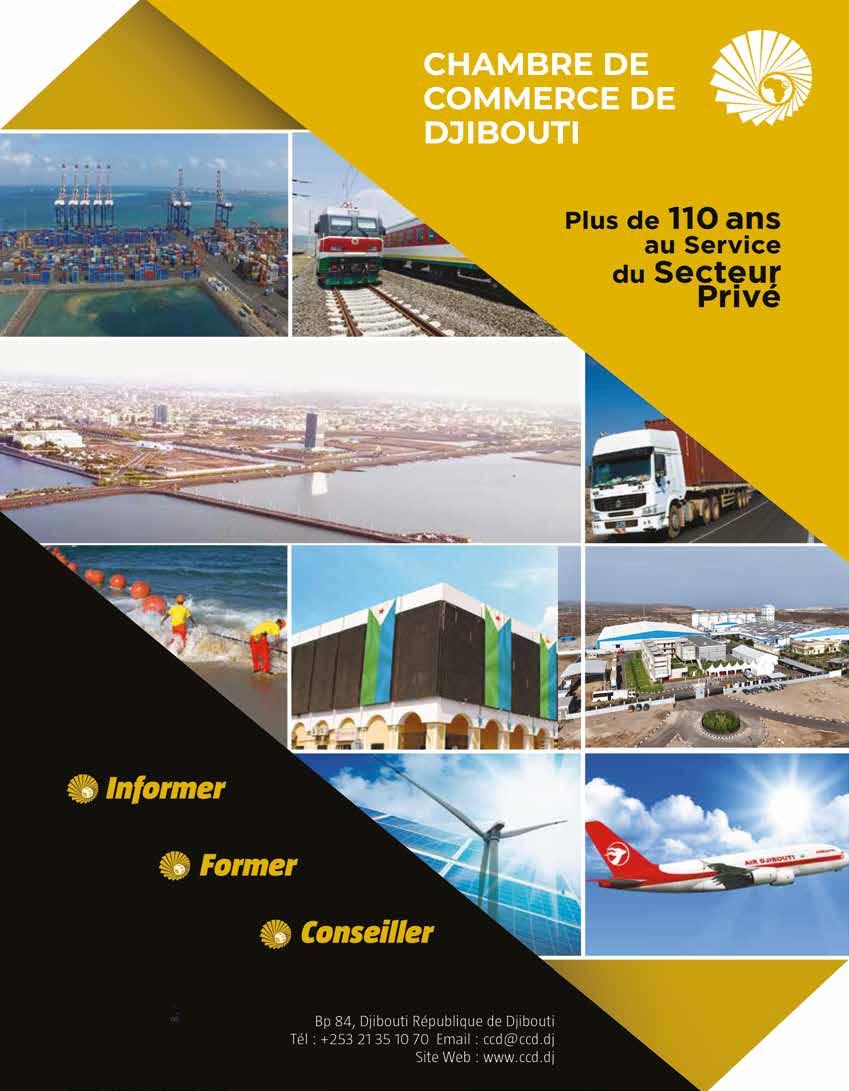

Interview with Youssouf Moussa Dawaleh, President of the Djibouti Chamber of Commerce(CCD)andthePan-AfricanChamber of Commerce and Industry (PACCI). This century-old institution is one of the driving forces behind Djibouti's economic transformation.
HowdoestheCCDsupportentrepreneursandtradersin promotinganddevelopingtheiractivities?
The Djibouti Chamber of Commerce (CCD) plays an essential role in the country’s economic development. Beyond representing and advocating for economic operators’ interests, it issues opinions and recommendations to stimulate growth, combat poverty, and foster human progress. It also acts as a trade facilitator and enhances understanding of the national market. To support entrepreneurs and traders, the CCD provides a range of services aimed at promoting and developing their activities. The CCD regularly organizes training sessions, seminars, and workshops to help entrepreneurs enhance their management, marketing, finance, and regulatory skills. These sessions are tailored to each enterprise’s specific needs. The Chamber advocates for entrepreneurs’ interests with public authorities and actively participates in developing business-friendly policies. Finally, the CCD offers business support services covering management, taxation, and social aspects. It also provides assistance for preventing and managing economic and financial difficulties, notably through the Approved Management Center (CGA)
What are your institutional or consular partners?
To strengthen its actions for the private sector, the Djibouti Chamber of Commerce closely collaborates with various institutional and consular partners at both national and international levels.
Regardingfinancinganddevelopment,theCCDworkswiththe FrenchDevelopmentAgency(AFD),EuropeanUnion(EU),and USAIDtosupportinitiativesimprovingthebusiness environment,enhancingenterpriseservices,andboosting Djiboutianeconomicactors'competitiveness.
It maintains strategic relationships with major national institutions and is a member of several international business networks.
Additionally, the CCD has signed multiple partnership agreements with foreign Chambers of Commerce, notably with the Nantes Saint-Nazaire Chamber of Commerce and Industry, the Federation of Russian Chambers of Commerce, the Indonesian Chamber of Commerce and Industry, the Ethiopian Chamber of Commerce and Industry, and various trade associations.
These collaborations facilitate trade exchanges, increase opportunities for Djiboutian businesses, and strengthen Djibouti’s international economic influence.
WhatadvicewouldyougivetoafutureinvestorinDjibouti?
Djibouti is a strategic destination for investors due to its unique geographic position at the crossroads of major global shipping routes. Its modern infrastructure – featuring worldclass ports, free zones, and an efficient logistics network –makes it an essential trade hub in East Africa.
For future investors wishing to set up in Djibouti, three essential pieces of advice: Thoroughly understand the local market; work with local partners; Leverage tax incentives and regulatory advantages.
Thanks to its political stability and business climate reforms, Djibouti represents a strategic destination for investors seeking long-term establishment in East Africa.
The CCD is a key player in national economic development, playing a crucial role in supporting entrepreneurs, promoting the private sector, and facilitating investments. Through its extensive partner network and business climate initiatives, it actively contributes to making Djibouti a platform of opportunities for global businesses and investors.
KEY CONTACTS
National Investment Promotion Agency (ANPI)
Rue de Marseille
Djibouti Ville
Tél. : +253 21 32 73 50
Email : info@anpi.dj https://djibouti-invest.com
One-Stop Shop
Boulevard de la République
Djibouti Ville
Tél. : +253 21 33 34 00/ 21 32 73 52
Email : support@guichet-unique.dj www.guichet-unique.dj
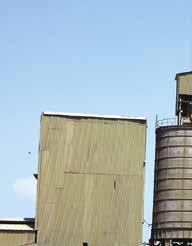
Djibouti Chamber of Commerce
Place Lagarde
Djibouti Ville
Tél. : + (253) 21 35 10 70
Email : ccd@ccd.dj https://ccd.dj/
E-Visa
Djibouti’s e-Visa has been available since 2020 to facilitate entry into the country. To apply, you need to provide a valid passport, a passport photo, and proof of accommodation. It can be obtained online: www.evisa.gouv.dj



We have undertaken a number of complementary initiatives such as the elaboration of strategies, the development of microfinance tools, notably through the creation of SavingsandCreditCooperatives (CPEC), the creation of institutions responsibleforpoverty reduction, such as the Djiboutian Social Development Agency (ADDS) and a State Secretariat for National Solidarity.
Excerpt from President Ismaïl Omar Guelleh's speech at the opening ceremony of National Solidarity Week 2024, January29,2024
Entrepreneurship, Banking, and Insurance
The government aims to stimulate entrepreneurship and the development of micro, small and medium-sized enterprises (MSMEs) by strengthening human capital and access to financing. The Republic of Djibouti also aims to position itself as a financial hub.

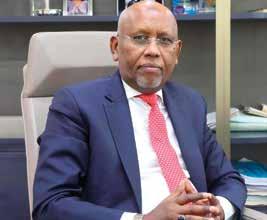
Interview with Ilyas Moussa Dawaleh, Minister of Economy and Finance
responsible for Industry since 2011, who received last year's prestigious Most Influential Personalities in African Finance award.
What are the main pillars of the 2024-2027 strategy and action plan for public financial management reform?
The public financial management (PFM) reform strategy will be the backbone of the economic governance reform that the Djiboutian government has been committed to since 2014. This PFM reform is part of a process of institutional reforms that will enable Djibouti to improve its economic, financial, and administrative governance. The strategy and its action plan aim to make the tax administration more effective, increase transparency in expenditure management, and allow citizens to access digital public services. The main pillars of this reform are strengthening the country’s tax policy and administration, enhancing the management of the public expenditure chain, and strengthening public finance oversight.
What is your vision for making Djibouti a regional financial center in East Africa?
Our vision is to make Djibouti a regional and international economic, commercial, and financial hub that ensures the well-being of Djiboutian citizens in a peaceful, secure, and clean environment. The Republic of Djibouti is one of 80 countries worldwide where conventional finance coexists with Islamic finance. Islamic finance represents over 3 trillion dollars in assets (2024) and continues to grow in emerging and Western markets. With total Islamic assets estimated at 200 to 300 million dollars (2023 estimate), Islamic finance has established itself in Djibouti within a decade.
Consequently, we seek to position ourselves as an Islamic financial hub in East Africa to attract investments from Gulf countries and serve as a bridge between the Arabian Peninsula and East Africa or even COMESA countries. However, a stock market is needed to achieve this. This is why in 2023, we undertook a feasibility study with a multilateral partner bank to create a regional financial center designed to develop both conventional and Islamic finance.
Does Djibouti have an appropriate regulatory framework to encourage international finance, particularly regarding taxation and investor protection?
Of course, Djibouti has a foundational regulatory framework for international finance, with national laws governing both conventional and Islamic banking activities under the supervision of the Central Bank of Djibouti. The Djiboutian financial system complies with international standards and regulations established by the Basel Committee for conventional banks and the standards of the Islamic Financial Services Board for Islamic banks. Furthermore, Djibouti has been a member of GAFIMOAN since 2018 and underwent an evaluation of its anti-money laundering and counterterrorist financing framework; fortunately, it was not classified as a high-risk country. Regarding taxation, banks can benefit from exemptions, there are no exchange controls, dividends are lightly taxed and can be freely repatriated. In terms of investment protection, we have signed investment protection agreements with several countries.

We have an Investment Code that prohibits expropriation. All economic sectors are open to foreign investment, and in only a few strategic sectors is majority ownership not permitted.
What are the priority projects to boost the country’s industrialization?
The economic structure of the Republic of Djibouti is atypical in Africa. It is dominated by the services sector for over 80%. The industrial sector contributes only about 10-12% to GDP. Industrialization in Djibouti faces several main obstacles: a small market size and higher factor production costs than the regional average, primarily energy costs. We believe that strengthening industrialization hinges on private sector development and economic diversification. To achieve this and as part of preparing the 3rd National Development Plan, Djibouti will deploy an economic diversification program with several projects to develop the private sector and create more wealth for the Djiboutian population. This program will focus on several key areas: removing cross-cutting constraints for private sector development; establishing the conditions for economic diversification; promoting an inclusive (women, youth, regions) and sustainable private sector; and strengthening mechanisms for public-private dialogue, monitoring, evaluation, and impact assessment of reforms.
What about the development of the International Free Zone, and what benefits do you expect it to bring to the local economy?
The development of the Djibouti International Free Zone marks a major step in the transformation of our economy. Today, the first phase of this ambitious project is operational, with modern infrastructure dedicated to logistics, trade, light industry, and services. This new Free Zone will allow both foreign and local companies to establish processing industries, not just serve as an import-export platform. By making these significant investments, the Government expects beneficial impacts for the local economy, including:
- The creation of direct and indirect jobs in logistics, services, maintenance, and trade sectors; - Stimulation of the local economic fabric for SMEs, which will have increased opportunities, whether through subcontracting, supply, or partnership with companies established in the free zone;
- It is also a lever for economic diversification with the development of new value chains, particularly in light industry and services, and thus ultimately greater longterm economic resilience;
- Significant investments in infrastructure and improvements to the business environment are also corollaries of the new free zone’s development. All this creates positive and virtuous momentum in terms of economic and social spillover benefits for the entire Djiboutian population. We are also aware that for these benefits to be fully realized, we must work towards diversifying our economy, strengthening the skills and qualifications of our youth, and ensuring reinforced and effective governance of this major structuring project.
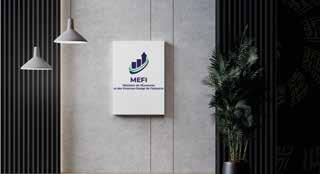
Strenghtening the industrial sector
TheGovernment,fullycommittedtoimplementingVision2035regardingthe investmentenvironment,recognizesthattheprivatesectorisanessentiallever forstrengtheningtheindustrialbase
According to an October 2023 IFC report, Djibouti could attract more private investment, create jobs, and support economic development by improving the business climate, enhancing firms’ access to finance, and boosting energy production and digital connectivity. This report aligns with Vision 2035, the Djiboutian

government’s development plan aimed at stimulating growth and improving citizens’ quality of life by prioritizing private investment. The Private Sector Development Strategy (DSP) identifies three main pillars to foster the growth of Djibouti’s private sector. These consist in leveraging the country's potential to establish it as a regional leader in commerce, logistics, telecommunications, and finance; capitalizing on its natural resources to diversify its economy and foster job creation; and stimulating entrepreneurship and the development of micro, small, and medium-sized enterprises (MSMEs) by strengthening human capital and access to financing.
An oasis of stability in the Horn of Africa, Djibouti has strategically capitalized on its location to develop transport and logistics infrastructure, establishing itself as a regional trade hub that connects Ethiopia to global value chains. The report highlights significant potential in developing tourism and fisheries sectors, and in establishing public-private partnerships (PPPs) for infrastructure projects—including roads, telecommunications, and energy. The private sector emerges as a critical lever for the country’s socio-economic development.
NATIONAL POLICIES FOR ENTREPRENEURSHIP DEVELOPMENT
The Center for Leadership and Entrepreneurship (CLE) is a dedicated facility for entrepreneurs and project initiators seeking to establish their own businesses. It benefits from a Project to Support Entrepreneurship for Women and Youth funded by the World Bank to the tune of $15 million over a 5-year period from 2019 to 2024. This project aims to create an environment conducive to the development of entrepreneurship, new economic opportunities for young people and women in order to encourage innovation, stimulate job creation and improve the living conditions of all the inhabitants of Djibouti. The Project to Support Entrepreneurship for Women and Youth in Djibouti has expanded access to financing for over 2,350 entrepreneurs, and by the end of 2023, the CLE had supported more than 20 startups by providing approximately 65,000 dollars in seed capital. The project has also supported the deployment of Djibouti’s partial credit guarantee fund for SMEs, which mobilized over $2 million in investments from participating banks and enabled more than 150 SMEs across the country to access bank financing and continue developing their operations.


Interview with Nasro Habib Ibrahim, Managing Director of the Djibouti Economic Development Fund (FDED), a public development finance institution dedicated to financing private productive projects in priority sectors.
How does the Fund contribute to making the private sector the engine of the country’s socio-economic development?
The lack of financial services is a major obstacle for private individuals and businesses in Djibouti. With this in mind, the Fund launched its activities in 2009 and has contributed to the financing of 505 projects, distributed as follows:
- Investment Credit across all sectors : A total capital of $43,165,466, representing 90% of the portfolio.
- Young Graduates Credit : A total capital of $1,552,706, representing 10% of the portfolio.
The FDED plays a crucial role in energizing the private sector, considered the driving force behind the country’s socio-economic development. By financing productive projects in priority sectors such as agriculture, fishing, tourism, and services, the FDED fosters job creation and innovation. We provide loans tailored to the specific needs of SMEs, thereby facilitating their growth and expansion. Additionally, we implement training programs and offer personalized advisory services in collaboration with our partners to strengthen the skills of local entrepreneurs. This approach creates an environment conducive to sustainable economic growth and unemployment reduction. Through our financing, more than 2,000 jobs have been created. The projects supported by the FDED have had a remarkable impact on the national economy. As such the FDED has established itself as a development financing instrument designed to support SMEs and promote the country’s economic growth.
The FDED has recognized the importance of diversifying the economy and strengthening the agricultural sector. It plans to gradually increase investments in agriculture and other sectors to enhance its contribution to GDP. This initiative aims to reduce the country’s dependence on imports, create jobs, and improve access to financing. The FDED is updating its products and developing new ones to meet the needs of entrepreneurs, particularly young graduates and women. This specific target group, which lacks access to traditional banking services, is supported by the FDED through tailored financial and non-financial services. Additional products are being developed to address needs in participatory, green, and blue finance.
Who are your
main partners?
Our main partners include local and international financial institutions, development agencies, and non-governmental organizations. Among them, we count the World Bank, the African Development Bank, and the coordination group comprising the Kuwait Fund, the Saudi Fund for Development, the Arab Fund for Economic and Social Development, and the OPEC Fund for International Development (OFID). These strategic partnerships enable us to mobilize significant financial resources and access high-level technical expertise. Additionally, we work closely with the Djiboutian private sector to identify development opportunities and address key challenges.
What advice would you give to a future investor in Djibouti?
To a future investor in Djibouti, I would advise thoroughly understanding the local context and actively engaging with local stakeholders. Djibouti offers a business-friendly environment with attractive tax incentives and a strategic geographic position. Conducting a comprehensive market study to identify high-growth potential sectors is essential. Collaborating with local partners is highly recommended to leverage their on-the-ground knowledge and networks. Finally, aligning with the country’s development priorities, particularly in job creation and sustainable development is crucial. The FDED is here to provide financing and support to investors, offering the necessary assistance to help them succeed in their projects.
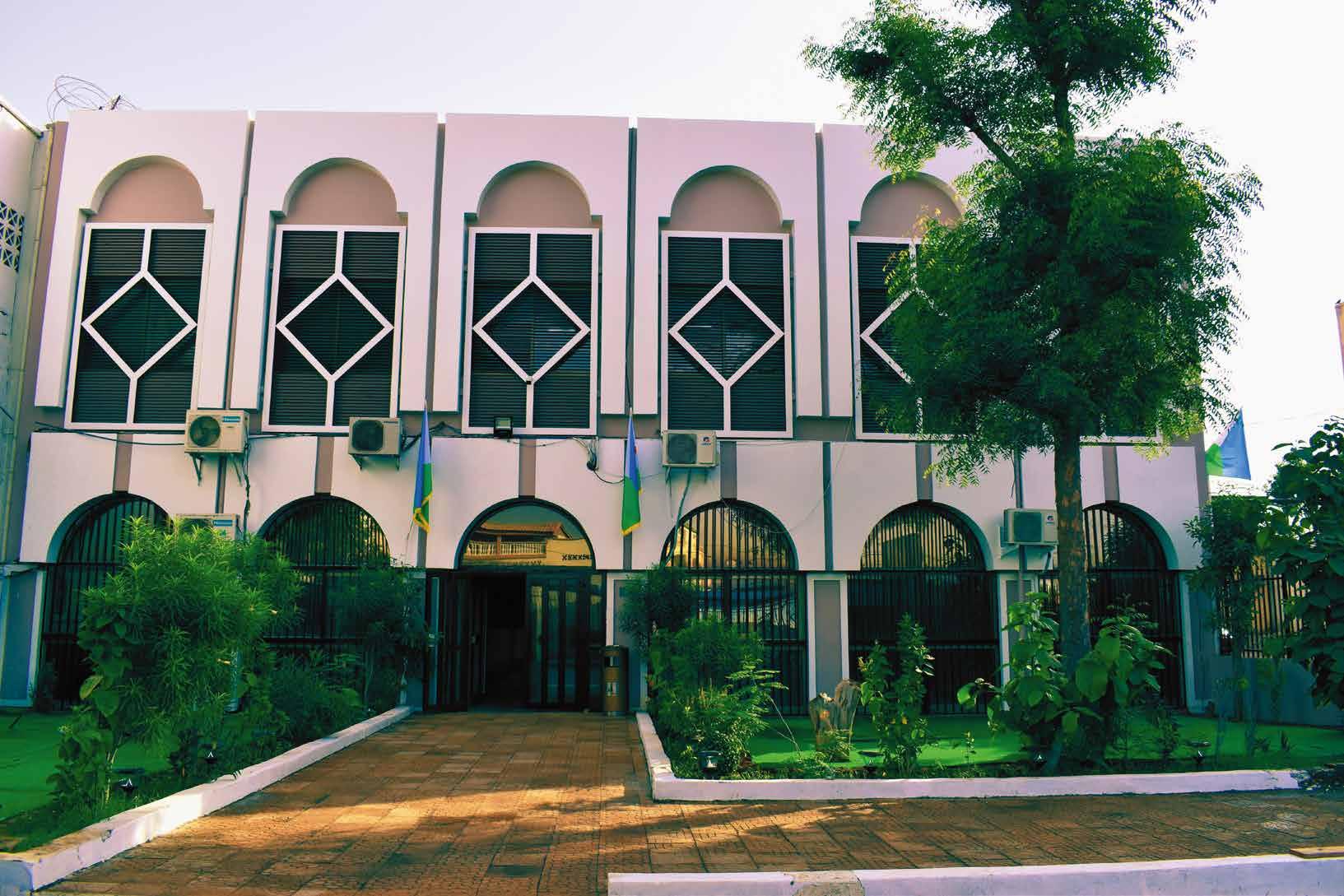
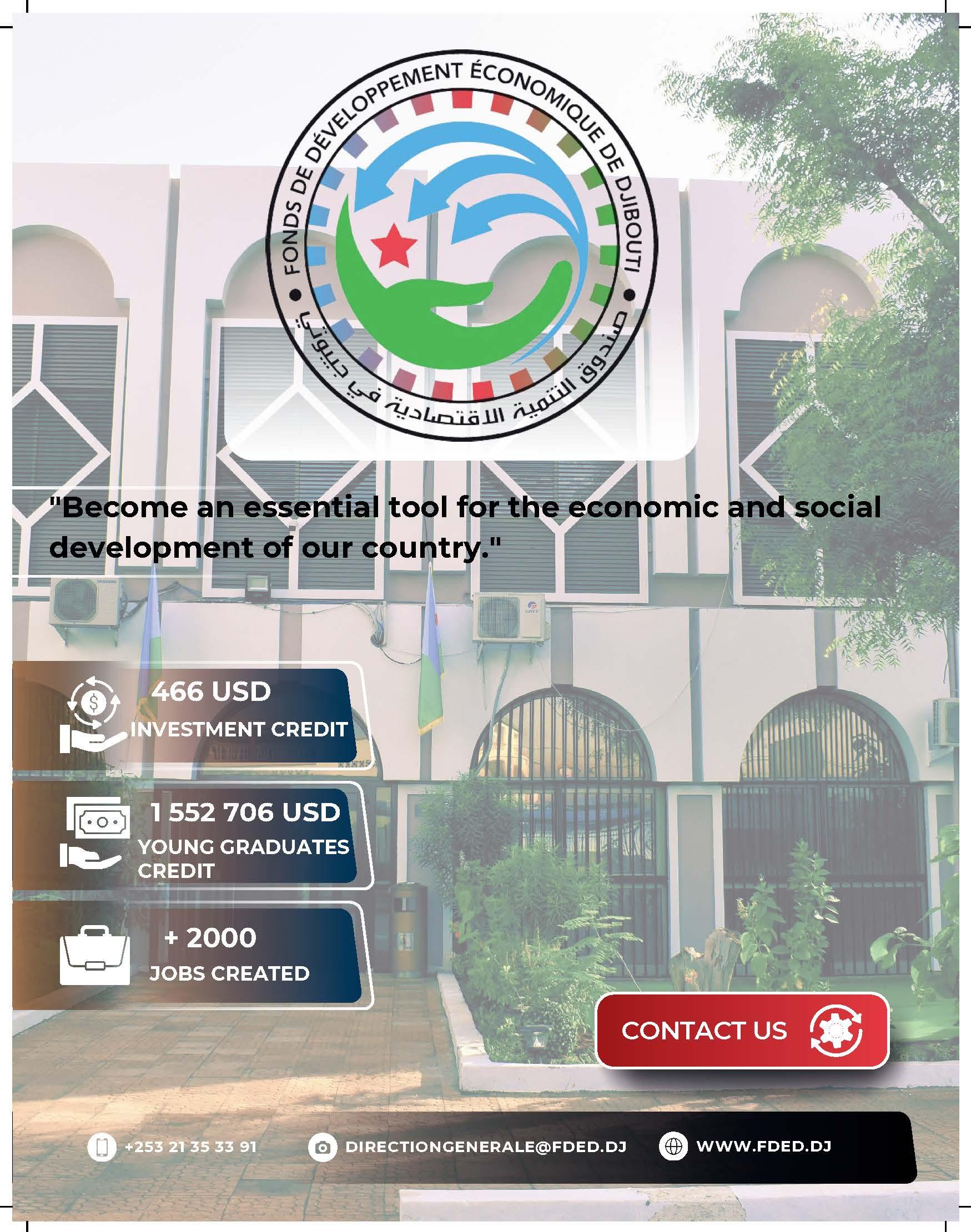

Interview with Mahdi Mohamed Djama, Director General of the Djiboutian Agency for Social Development (ADDS), a public institution whose mission is to contribute to eradicating poverty among vulnerable groups and reducing disparities between regions.
What are ADDS’s areas of intervention?
It should be noted that ADDS is part of the technical and institutional architecture for poverty reduction and eradication. Its actions cover the entire territory, both urban and rural. Its intervention model is integrated: using a territorial and community-based approach to stay close to local realities; participatory by letting beneficiaries prioritize their needs; and partnership-oriented by establishing all possible synergies in implementing its actions. This integrated intervention approach involves actions in several areas:
- Improving neighborhood accessibility,
- Developing basic social infrastructure and facilities in health, education, and access to drinking water and energy,
- Community development and capacity building for civil society, out-of-school youth, and stakeholder administrations,
- Promoting youth and women’s entrepreneurship through Economic Interest Groups (GEA) and microfinance,
- Expanding access to renewable energy through solar power plants,
- Social protection,
- Supporting decentralization,
- Supporting refugees, etc.
Do you rely on international partnerships?
The programs and projects implemented by the Agency are funded by the Government and its technical and financial partners. Key international
donors include the World Bank, the African Development Bank, the French Development Agency, the Islamic Development Bank, the Japan Social Development Fund, and the South Korean International Cooperation Agency. Since its creation in 2007, ADDS has been entrusted with approximately USD 200 million – a testament to the strong trust capital it enjoys. It should be noted that ADDS is part of the AFRICATIP network (Association of African Agencies for Public Works Execution), an integration and cooperation platform aimed at promoting experience sharing among agencies, particularly best practices. This network includes 18 agencies from 15 countries. ADDS has also shared its community-based approach experience with African countries like Chad, Comoros, Benin, and Madagascar in social protection, income-generating activities, and combating child malnutrition.
What are the main challenges you face?
The development challenges facing the Agency are immense:
- for urban areas: Youth unemployment, rural exodus due to climate change, inadequate basic social infrastructure and services, uncontrolled urban growth from rural migration leading to informal settlements;
- for rural areas: Insufficient infrastructure and basic social services, low income, weak resilience to shocks from cyclical and structural crises, difficulty accessing water and energy.
Whatpriority do you give to social entrepreneurship or community initiatives in your strategy?
They hold a preeminent position. Indeed, the territorial and proximity approach of the Agency is based on the promotion of development at the base and the liberation of initiatives. A specific fund titled "Community Development Fund" is established within large-scale projects to finance community-oriented sub-projects submitted by local associations. Over 200 sub-projects have been funded, benefiting thousands of youth and women, across highly diverse sectors: access to water and energy through social connections, vocational training for immediate employability such as driver’s licenses, sewing, hairdressing, and culinary training, as well as tree planting for forest regeneration. Furthermore, a new concept, "Community-Driven Development" launched by the World Bank, has been implemented for several years in rural areas and has yielded positive outcomes.

Tel: +253 21 35 86 55 / Fax: +253 21 35 71 84
Email: direction@adds.dj
Website: www.adds.dj

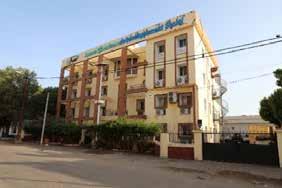
The Djiboutian Agency for Social Development (ADDS), under the supervision of the Ministry of Social Affairs and Solidarities, is part of the technical and institutional framework for poverty reduction. It is tasked with contributing to the mitigation of inequalities to prevent social exclusion of the most vulnerable segment of the population, while also reducing disparities between Regions. To fulfill these missions, it implements programs and projects funded through national resources and international donors. Its interventions cover diverse areas: from infrastructure catch-up to capacity building for civil society actors and stakeholder administrations, promotion of income-generating activities, waste management, and support for addressing refugee reception challenges. All these actions are aligned with the Millennium Development Goals.
Missions and objectives
ADDS’s mission is to help eradicate poverty among vulnerable groups and reduce disparities between regions.
Mission 1: Improving access to infrastructure, equipment and basic social services, including rural electrification
Mission 2: Access to financing and microfinance services
Mission 3: support for community development activities: local/regional
Mission 4: Capacity building for development actors

Alignment with the SDGs
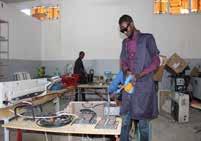
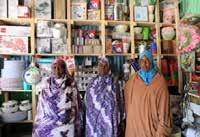
Gender and environmental protection also play an important role in the Agency’s actions.
The Central Bank
The Central Bank plays a major role in the development of the Republic of Djibouti, by regulating the financial market and ensuring the stability of Djibouti's banking and financial system.
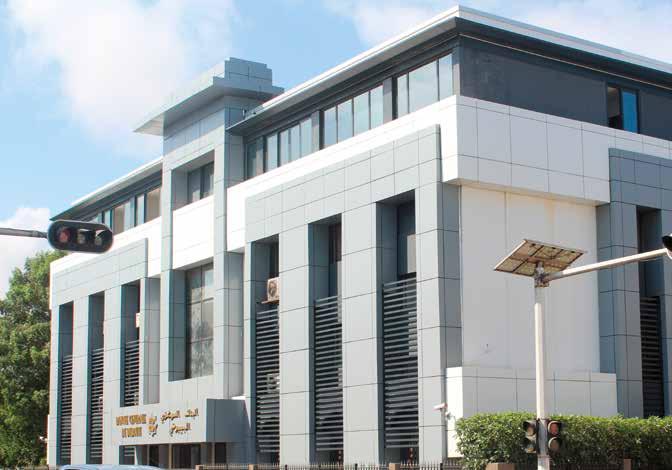
The Central Bank also regularly takes vigorous measures to strengthen the government’s commitment to the national economy. The Djiboutian banking system thus guarantees stability and attractiveness for domestic and international investors. The Central Bank of Djibouti has undertaken major reforms and large-scale modernization initiatives for the national financial architecture and infrastructure to promote financial sector development and financial inclusion. Consequently, reforms implemented by the Central Bank have contributed to the ongoing expansion of the banking sector.
The regulatory thresholds of the Central Bank of Djibouti (BCD) have been compliant with Basel III standards since March 2019, covering both capital adequacy ratios and liquidity ratios.
Djibouti operates a currency board system. The Djiboutian franc is pegged to the US dollar at a fixed exchange rate of DJF 177.721 = USD 1. This unique monetary system enjoys exceptional stability and longevity, forming the cornerstone of the country’s financial system. The Central Bank maintains a free exchange regime with no restrictions on payments and transfers for current international transactions.

The country benefits from political stability, a robust macroeconomic framework, and a business-friendly environment enabled by its efficient communication infrastructure, liberal economic system, and absence of exchange controls.
To establish Djibouti as an international financial hub, fintechs play a crucial role by delivering innovative solutions. The Central Bank is therefore prioritizing digital banking and mobile money to modernize the country’s banking structure. In its capacity as the State’s financial agent, the Central Bank is the privileged interlocutor of international financial institutions, such as the IMF and the World Bank, with whom it develops technical and financial assistance programs on behalf of the Republic of Djibouti. Accordingly, the International Finance Corporation (IFC), a member of the World Bank Group, strengthened its partnership with the Central Bank of Djibouti in January 2025 through a cooperation agreement that will help modernize a movable collateral registry for financial institutions to enhance SMEs’ access to needed financing. In 2024, the Central Bank conducted its first assessment of the country’s frameworks for combating money laundering, terrorist financing, and weapons of mass destruction proliferation, following recommendations
from the Middle East and North Africa Financial Action Task Force (GAFIMOAN) – a regional subgroup of the Financial Action Task Force (FATF) that the Republic of Djibouti joined in 2018. As a GAFIMOAN member, Djibouti participates in regional efforts to combat money laundering and terrorist financing.
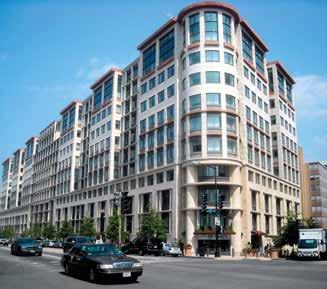
A competitive banking system
Witharesilientbankingsectordisplayingstability,increasedprofitabilityanda declineinnon-performingloans,Djiboutiaimstopositionitselfasafinancialhub.

Djibouti has an efficient banking network consisting of subsidiaries of major foreign groups that handle all standard banking operations.
The Djiboutian financial system is dominated by the banking sector (94% of assets). It comprises 10 commercial banks, 3 active Islamic banks, 17 money transfer companies, and 3 microfinance institutions. The market is structured around three main banks holding 70% of assets: Banque pour le Commerce et l’Industrie Mer Rouge (BCI-MR), Bank of Africa (BOA), and Exim Bank of Djibouti.
Since 2006, the banking sector has opened to foreign banks. Three of Djibouti's thirteen operating banks specialize in Islamic finance. This represents 25% of total banking assets, compared to just 1.2% in 2006. These institutions show impressive growth, with annual deposits increasing by 20% and accounting for 23.6% of the banking system's total deposits. The country has a
small but predominantly Muslim population and excellent regional connectivity, providing access to growing Muslim populations in neighboring countries. Through strong adoption of financial products better suited to local needs, Islamic banks have significantly contributed to improving the country’s banking inclusion rate..
Bank capitalization has increased over the past three years, strengthening the nation’s financial stability and credit quality. The banks’ solvency ratio stood at 16% in September 2023 versus 14.1% in 2021. The country has genuine potential to become a regional leader in trade and finance. Accordingly, the government aims to build a robust network of public and private stakeholders to develop inclusive financial infrastructure that will strengthen the local ecosystem and facilitate Djiboutian socio-economic development.
Despite increased competition in the banking sector leading to lower credit costs, Djibouti’s local banks still offer high lending rates, averaging about 10%
.7%
ACCESS TO BANKING RATE END 2023
However, the Project to Support Entrepreneurship for Women and Youth has backed the rollout of Djibouti’s partial credit guarantee fund for SMEs, which mobilized over $2 million in investments from

participating banks and enabled more than 150 SMEs nationwide to access bank financing and continue expanding their operations.

• Attractive profits on client deposits
Consistent & High Sharia-compliant returns paid to clients for over 18 years.
• Facilitating Global Trade A wide network of correspondent banks enabling smooth international transactions and Business Growth.
• Digital Banking Mobile and online platforms to manage accounts anytime and anywhere.
• Inclusive and Sustainable Financing Targeted initiatives for women, youth, farmers, and green economy projects to promote sustainable development.
• Group Services Subsidiaries in insurance, housing, and finance providing integrated solutions.
• Governance & compliance with global standards Adoption of best practices in transparency,supervision,andtrainingto ensuresecurefinancialoperations.
• SMEs & Entrepreneurs Supports Dedicated financing programs that encourage small businesses and individual initiatives.
• Regional Reach Branches and offices in key locations across Djibouti and beyond to stay close to clients.
• Pioneer in Housing Projects
Ongoing and completed residential projects designed to meet Djibouti’s urban expansion.
• Free Zone Banking Free-Zones based banking services that support companies’ activities and ease daily transactions.
Funding for SMEs
The resolve of Djiboutian public authorities is to make SMEs the cornerstone of their economic policy, with the aim of establishing a genuine job and wealth-generating economic fabric.

The government has established mechanisms to strengthen SMEs’ access to financial instruments. Accordingly, the Djibouti Economic Development Fund (FDED) –a state-owned commercial enterprise – is dedicated to financing productive private-sector projects spearheaded by SMEs. The FDED serves as a financing and business development support tool for new business projects. It meets SME demand by providing tailored financial solutions through short- and medium-term credit facilities The Djibouti Guarantee Fund (FOGAD) promotes private sector growth and modern micro, small, and medium enterprises (MSMEs) to advance Djibouti’s socioeconomic development. FOGAD incentivizes lenders to provide MSMEs with adapted financial products, including short/medium-term loans and leasing. IncluFin is Djibouti’s first crowdfunding platform dedicated to national development. Supported by Djibouti’s ecosystem – notably the Djibouti Sovereign Fund – its mission is to serve as a launchpad for high-potential development projects by 54 I YEARBOOK DJIBOUTI : Economic report
connecting entrepreneurs and investors through a structured, secure framework. Specifically, IncluFin aims to drive Djibouti’s growth by supporting innovation and enterprise development; enable investors to capture value from Djibouti’s expansion while actively contributing to it; unleash local entrepreneurial potential by valorizing expertise and funding growth initiatives. Operating as a complement to traditional banking, IncluFin serves as a catalytic vehicle for financial and social inclusion, enabling the integration of informal economic actors. The platform specifically accelerates environmentally and socially impactful ventures, facilitating investments across startups, SMEs, real estate, and creative/community initiatives – all supported by professional advisory services and innovative digital tools..
In 2021, the government established the SME Relief and Support Fund, disbursing state subsidies to privatesector entities experiencing acute liquidity constraints arising from the COVID-19 crisis.

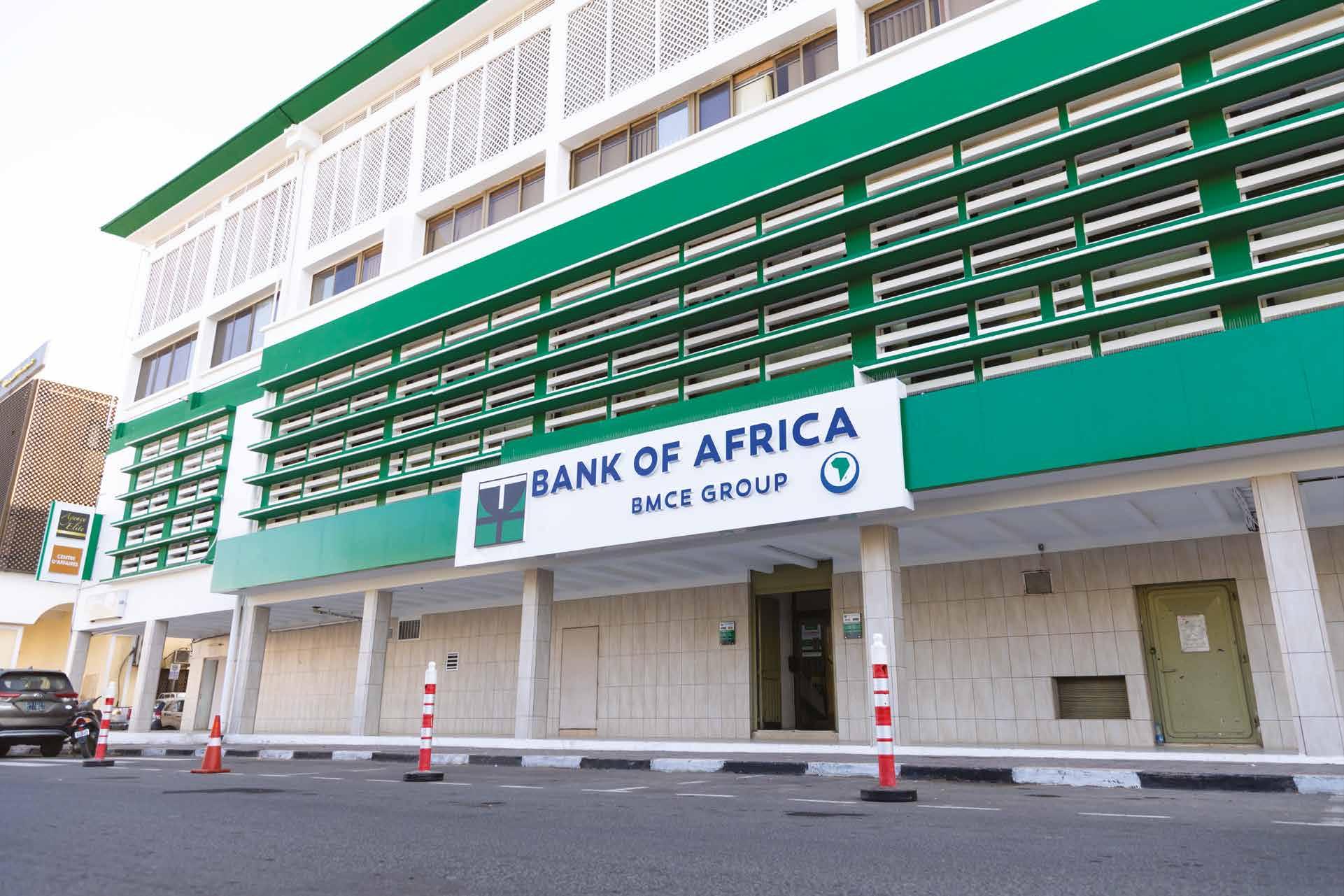

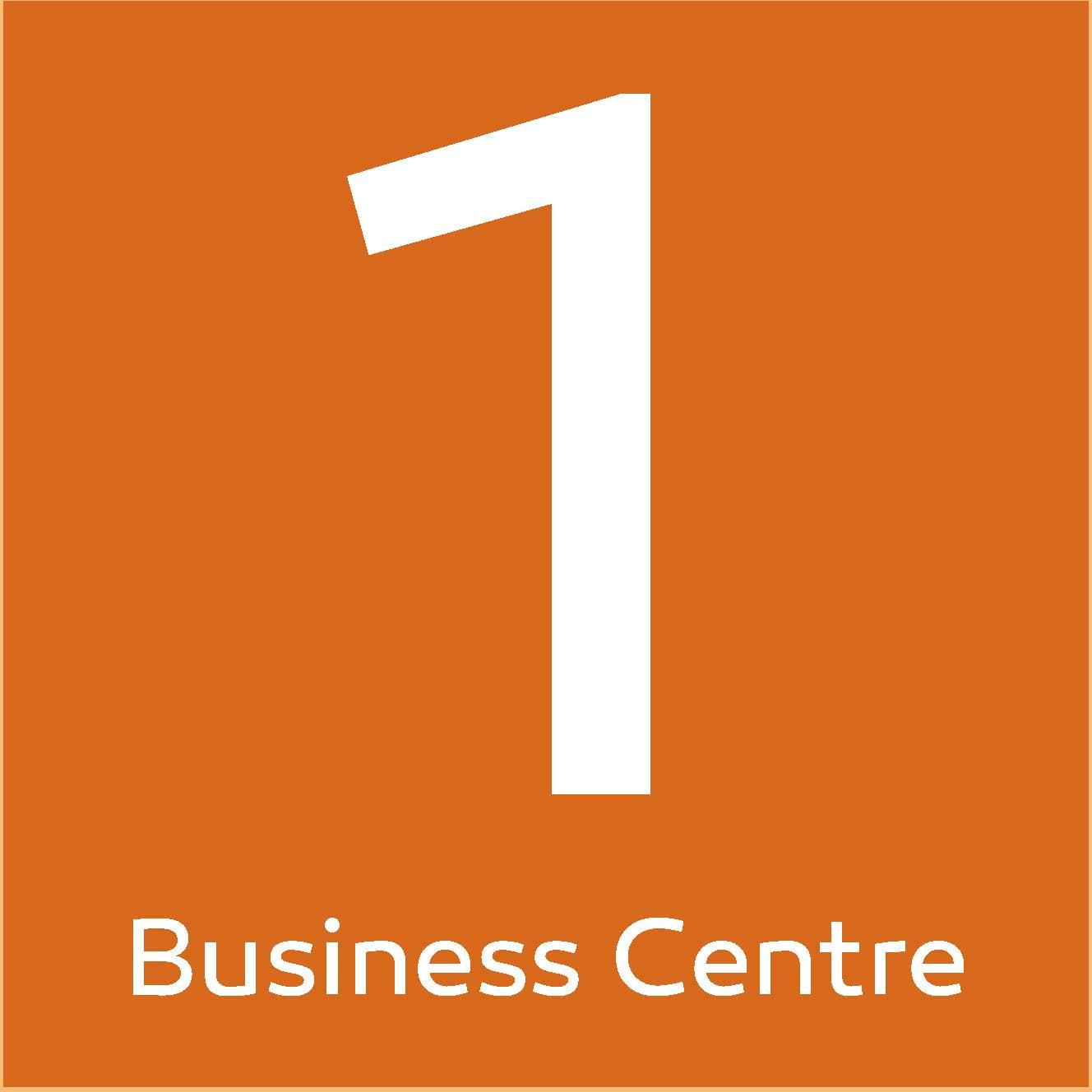

Financial inclusion strategy
In order to effectively implement the National Strategy for Financial Inclusion (SNIF 2023-2028) part of Vision 2035, a national coordination committee for financial inclusion was established in August 2024.

This national committee is chaired by MEFI with participation from the Central Bank, the association of banks and financial institutions.
SNIF applies to banks, public and private specialized financial institutions, insurance companies, microcredit and microfinance organizations as well as any other institution or fund manager acting as a provider of financial services. The Financial Inclusion strategy falls within the framework of Djibouti Vision 2035 and is aligned with the Sustainable Development Goals (SDGs). The government has already injected significant investments such as credit lines, investment and operational subsidies, to promote microfinance development with the objectives of modernizing the national payment system, providing simplified financial products, and improving financial literacy.
The State thus promotes access to banking services, microfinance, non-conventional financing, insurance and Islamic finance at affordable costs through the digital economy. Microfinance institutions now cover the entire territory. Jointly with the Central Bank, the government has set a highly ambitious target to double the current baseline rate of 26% of people with access to financial services by 2024. It meets the financing needs of very small enterprises in the informal sector and income-generating activities targeting vulnerable sections of the population outside the banking system.
Efficient financial services are essential to enable citizens to build savings, access loans and manage financial risks. Easier access to appropriate financial tools and services promotes greater participation by businesses, households and women in the financial system and economy, leading to poverty reduction. Financial education and protection frameworks foster greater trust in the financial system, encouraging increased transactions, private sector growth and foreign investments.
The PND supports the Djibouti Economic Development Fund (FDED) which is dedicated to granting concessional loans to SMEs excluded from the banking financial circuit. Beyond financing services, the fund trains project developers and implements project execution monitoring processes.
Several credit programs are supported by the Fund, notably investment credit, Young Graduates credit, women’s entrepreneurship and other programs registered in priority sectors. As the country’s sole telecommunications operator, Djibouti Telecom (DT) launched in October 2024 a new mobile application for its D-Money mobile money service. The new platform extends the range of digital financial services provided to customers beyond simple transactions like sending and withdrawing money which will reduce access barriers for rural and urban populations.



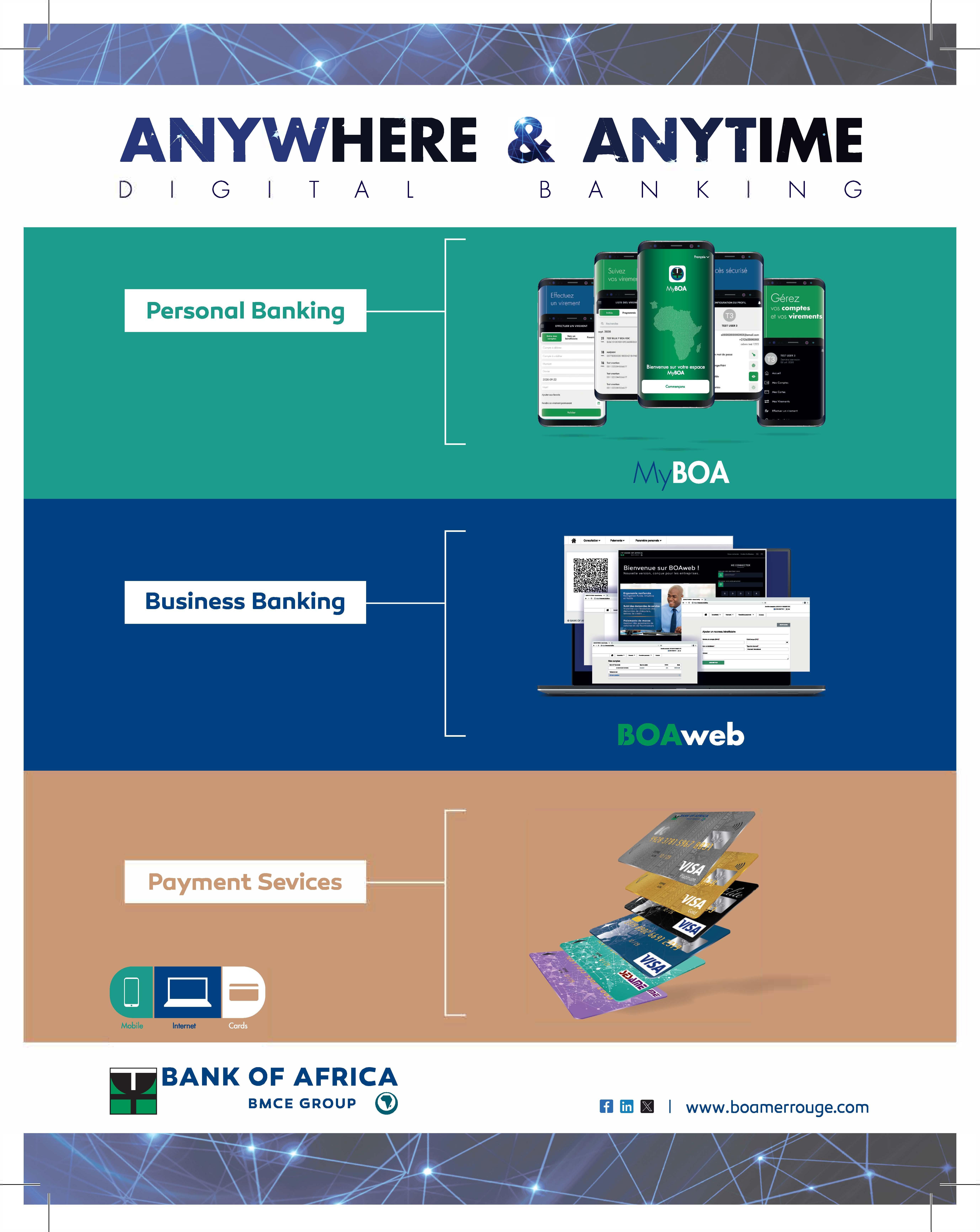

Interview with Sébastien Nahon, Chief Executive Officer of the Banque pour le Commerce et l'Industrie-Mer Rouge (BCIMR), subsidiary bank of the French BRED Group and leading European bank in the Horn of Africa.
What services does BCIMR offer businesses?
BCIMR has been a business-focused bank in Djibouti since its establishment in 1954. It has modernized over time in response to client demands to now offer all possible credits (working capital, equipment, real estate), all deposit products (checking, term accounts), and all essential business services through BCIMR Business Connect which enables all companies to conduct transactions securely and digitally. For example, BCIMR now processes bulk transfers to any beneficiary via file upload with same-day execution. What matters most is the quality of the relationship between client and advisor: we prioritize this fundamentally so clients feel comfortable in the relationship, heard through good times and bad.
How do you contribute to Djibouti’s economic development?
BCIMR strives to remain the bank for all Djiboutians. We collect deposits in Djibouti from our clients and lend to clients in Djibouti. We absolutely must intensify our efforts in this area because growth has been strong for several years (excluding the COVID period) and numerous infrastructure projects require financing. In 2023, BCIMR distinguished itself by significantly participating in a $155 million debt financing: the new oil jetty in Damerjog. It recently arranged a $10 million financing for the construction of the new Ministry
of Interior in a prime downtown location. Finally, BCIMR aims to expand its mortgage offerings by developing partnerships with public real estate entities (ARULOS and SIAF) or private sector partners including our country’s major experienced developers to finance more Djiboutians aspiring to own homes. Today, we offer 20-year loans with monthly payments potentially under DJF 22,000, enabling many families to achieve homeownership.
Do you support financial inclusion?
Of course, expanding bank account access for the greatest number is a government priority. We market near-zero-fee packages to access basic services and bank all who wish to join. We actively participate in every public-sector initiative pushing salary payments into bank accounts. Recently, we opened 250 bank accounts for CNSS retirees to receive their pension disbursements. Finally, we’re actively exploring ways to boost women’s entrepreneurship in Djibouti by establishing a dedicated support service – helping structure their businesses and enabling those with ambition to become increasingly seasoned and prosperous businesswomen.
What advice would you give new investors in Djibouti?
The country’s growth will likely reach 6.9% in 2024, with IMF projections indicating sustained levels for the next three years. The Djiboutian franc is pegged to the dollar at fixed parity, eliminating exchange rate risk. Inflation remains controlled through this mechanism, and the government makes substantial efforts to balance its budget and manage debt. Optimistic, enthusiastic entrepreneurs will find fertile investment ground in Djibouti. BCIMR stands ready as a financial partner to fund investments in our target sectors: port infrastructure, telecommunications, healthcare, and renewable energy. Come see us to discuss.
The insurance sector
The sector, which currently has six insurance companies, is one of the essential sectors for the country’s economic and social development.

Abody of legislative and regulatory texts governs insurance entities’ activities to ensure they can always meet their commitments to policyholders, subscribers, and beneficiaries of insurance contracts. The Djiboutian insurance market comprised, at end-2024, five insurance companies including three conventional insurers and three takaful insurance providers. Takaful represents an insurance model based on Islamic law principles, mutual assistance, and voluntary contribution. The Djiboutian insurance market remains primarily a P&C (Property & Casualty) market offering automobile, personal accident & health, fire, general liability, transportation, and other direct damage risk products. In life insurance, operations are limited to borrower coverage.
In 2022, the automobile line of business remained the primary activity, accounting for 56.5% of the market's premium volume (FDJ 2.6 billion), followed by the "other direct damage risks" line, which totaled FDJ 757.5 million in premiums and 16.4% of the market.

In 2023, the Djibouti insurance market recorded notable growth, with total revenue reaching 4.6 billion Djiboutian francs (FD), representing an increase of 19.7% compared to the previous year. The automobile line continued to dominate the market, accounting for approximately 55% of premiums issued, equivalent to approximately FD 2.5 billion. The "Other direct property damage (P&C) risks" line followed, contributing 19.5% of the market, with premiums totaling approximately FD 890.8 million. This predominance of automobile insurance is partly explained by the legal obligation to subscribe to civil liability insurance for vehicles in Djibouti. However, this line’s share of total premiums has shown a downward trend over the years, falling from 62.6% in 2016 to 55% in 2021.
It is important to note that the insurance sector in Djibouti is evolving rapidly, with the entry of new players into the market, notably companies offering Islamic insurance (Takaful) products. This diversification should contribute to an increase in insurance penetration and better risk coverage for the Djiboutian population.
The actions of the PND include measures that generalize the use of insurance. Consequently, they aim for universal access to insurance and risk management products at reasonable prices. Another important aspect is the reduction of taxes on life insurance.
Access to insurance services for MSMEs and populations is facilitated through digitalization with the provision of affordable insurance policies across all economic activity sectors.

THE PAN-AFRICAN RISK MANAGEMENT MUTUAL (AFRICAN RISK CAPACITY)

In a context of climate change and given its vulnerability to the impacts of extreme weather events, Djibouti has been committed since 2012 to an innovative disaster risk management and financing mechanism initiated by the African Union (AU). In 2019, the Djiboutian State and the PanAfrican Risk Management Mutual (African Risk Capacity: ARC) signed a cooperation agreement intended to facilitate collaboration between the country and this specialized institution of the AU.
Djibouti’s membership in this mutual will enable access to ARC’s capacity-building programs, financial assistance in the event of natural disasters, as well as the institution’s support in planning and swift management of natural disaster risks. This signature attests to Djibouti’s commitment to developing a comprehensive risk management strategy covering climate-related and other natural disasters. The establishment of the subsidiary of the Pan-African Risk Management Mutual provides an enhanced instrument for sovereign risk managementthat enables AU member states to pool their resources.
The COMESA insurance system
To capitalize on its investments in connectivity infrastructure, Djibouti relies on regional car insurance to cover transit traffic against road risks and ensure the fluidity of goods across the corridor.

Known as the Yellow Card, this regional motor insurance scheme guarantees the legal liability protection of policyholders in 13 countries including Djibouti.
This cross-border transport facilitation mechanism relies on a single insurance document recognized by all member states. Its objective is to reconcile the protection of road accident victims caused by transit vehicles on one hand, and the free movement of goods and people on the other. This insurance system materializes regional integration along COMESA country corridors by streamlining and facilitating the movement of vehicles, goods, and people. The Yellow Card thus ensures the fluidity of significant road traffic between Djibouti and Ethiopia. Implemented since 2003 on the Djibouti-Ethiopia corridor to facilitate transit operations, the COMESA motor insurance system covered 96,267 movements
of Ethiopian vehicles in Q1 2024 – a 4.9% year-on-year decrease.
Within the strategy to promote Djibouti as a regional hub, transport and logistics therefore represent a major stake for the national economy, and supply chain optimization is crucial for strengthening the competitiveness of the Djibouti trade corridor.
In regional exchanges, the Yellow Card has established itself as a lever for transit trade and is beginning to expand to non-COMESA countries such as South Africa. The Yellow Card system operates through a network of 13 national bureaus distributed across member countries. More than 150 insurance companies are involved in Yellow Card operations. The Djibouti Bureau issues it to motorists residing in Djibouti who are traveling to another COMESA country. It also compensates victims of accidents caused by vehicles in transit on the national territory.
Thankstoitsresources,thankstoits arablelands,thankstoitsyouth,our Continentholdswithinitselfallthe potentialforitseconomic prosperity.
ExcerptfromtheAddresstotheNationbyHisExcellencyIsmailOmar Guelleh,PresidentoftheRepublic,onJune27,2024.
Agriculture, Water, Fisheries, Livestock & Fisheries Resources
The government aims to stimulate the development of the agricultural private sector to increase production. Djibouti's agri-food industry remains nascent but is central to sovereignty and economic diversification challenges.
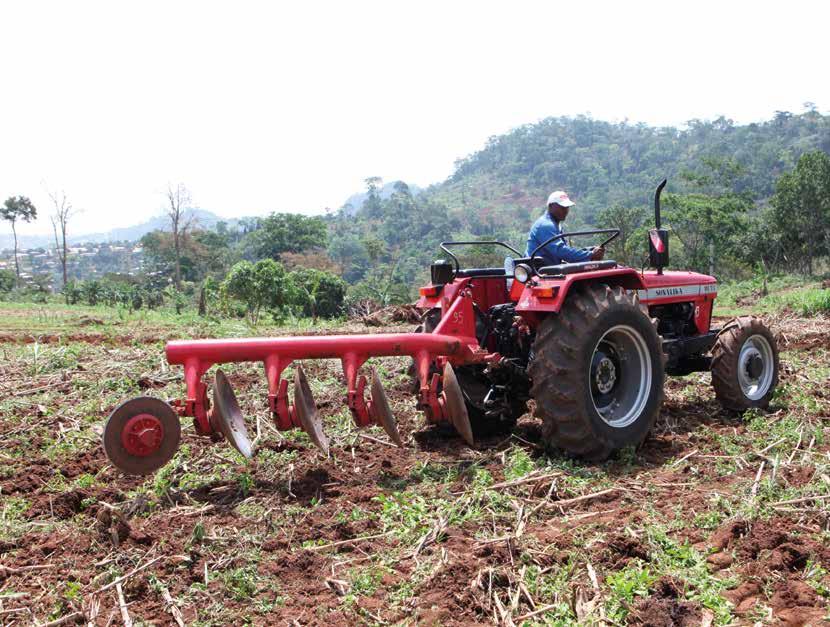
The agricultural sector development
Given unfavorable climatic and pedohydrological conditions, the agricultural sector remains underdeveloped, meeting only 20% of national food consumption. The government is banking on sectoral development for food resilience.
KEY FIGURES
1,000 km2 ARABLE LAND
130 MILLIMETERS/YEAR AVERAGE RAINFALL
22% RURAL POPULATION
1.22% SHARE OF LABOR FORCE IN 2022 1% OF GDP (WORLD BANK)
OF AGRICULTURAL GDP FROM LIVESTOCK 20% OF FOOD CONSUMPTION COVERED BY DOMESTIC PRODUCTION
Agriculture accounts for only 1% (World Bank) to 2% (FAO) of GDP. Production is limited to seasonal market gardening and arboriculture along watercourses.
Water scarcity, limited arable land (1,000 km² i.e. 4.3% of the territory), and soil salinity hinder cereal cultivation. The government aims to develop commercial agriculture through increased vegetable production to achieve 55,000 tonnes output – covering 90% of national needs. Agriculture suffers from extreme aridity, negative climate change impacts on production systems,
rapid urbanization, and intense competition between domestic food production and imports.
However, Djibouti has made significant efforts to promote innovative approaches within food security frameworks, which have contributed to enhancing the country’s resilience against the challenge of national food systems’ dependence on international markets. With Djibouti importing approximately 80% of its food supply, various projects and programs aimed at reducing this external dependency have been implemented. These have enabled increased agricultural production through the development of intensive market gardening, including greenhouse cultivation and drip irrigation systems. Consequently, yields have risen markedly.
Djibouti has reached a milestone by identifying strategic projects in key areas: date palm cultivation, market gardening, aquaculture, and livestock. Yet several challenges remain.
Given Djibouti’s arid climate, selecting date palm cultivation aligns with strengthening food systems. To address farmers’ seedling needs, an in vitro plant production unit with an annual capacity of 10,000 elite and productive plantlets has been established, resolving the national challenge of date palm seedling unavailability.
The Food and Agriculture Organization of the United Nations (FAO) partnered with agro-pastoralists for the project "Strengthening Crop and Livestock Productivity in Djibouti" (Re.Pro.VA) across five regions. Since its launch in early 2018, this project has directly developed 17.2 hectares within Agro-Pastoral Demonstration Plots (PADs) and indirectly developed 195 hectares in surrounding PAD farms, benefiting over 7,600 people. Through strategic financing, sustainable transformation of the country’s agricultural sector can be initiated.
The livestock sector
As the country's primary agricultural activity, livestock accounts for three-quarters of agricultural GDP. Improving water access is the top priority for increasing livestock production.
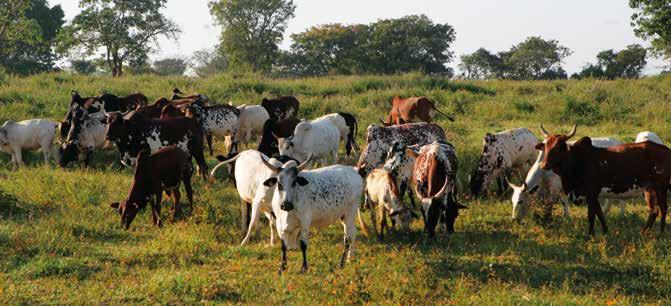
The government’s priority focuses on improving livestock production and productivity while ensuring maximum economic benefits from the sector.
Livestock contributes 75% of agricultural GDP with a herd size of 800,000 to 1 million head comprising small and large ruminants. The introduction of improved dairy goats for milk production has produced satisfactory results. Djibouti’s agriculture relies on pastoralism. The government has identified additional water resources and made them available for rural populations’ agropastoral activities.
Between 2022 and 2023, a decline in livestock farming was observed in Djibouti, dropping from 13% to 7%. Herd sizes have decreased due to successive droughts. Livestock farming is primarily practiced in rural areas, particularly in Obock, Tadjourah, and Ali Sabieh (by over 40% of households), less so in Dikhil and Arta (under 27%), but also occurs in all urban centers (by about 8% of households) and Djibouti City (by 2% of households)
Aligned with its food security policy, the government targets agricultural sector development through the goat meat value chain. Strengthening goat farming and byproduct production would enhance women’s empowerment through job creation. Introducing resilient, sustainable, and profitable production techniques can revitalize the goat sector.
The Youth Entrepreneurship Project for Climate Change Adaptation (PEJACC), funded by the African Development Bank from 2024 to 2030, specifically supports goat farming. The deficit in processing infrastructure – only one formal slaughterhouse nationwide – and preservation facilities hinders meat value chain development and limits export potential. However, direct rail transport of livestock from Adama to Djibouti is expected to transform the livestock export sector, ensuring superior quality and faster delivery to international markets. Thus, expanding rail transport for livestock exports should yield substantial results and unlock immense potential.

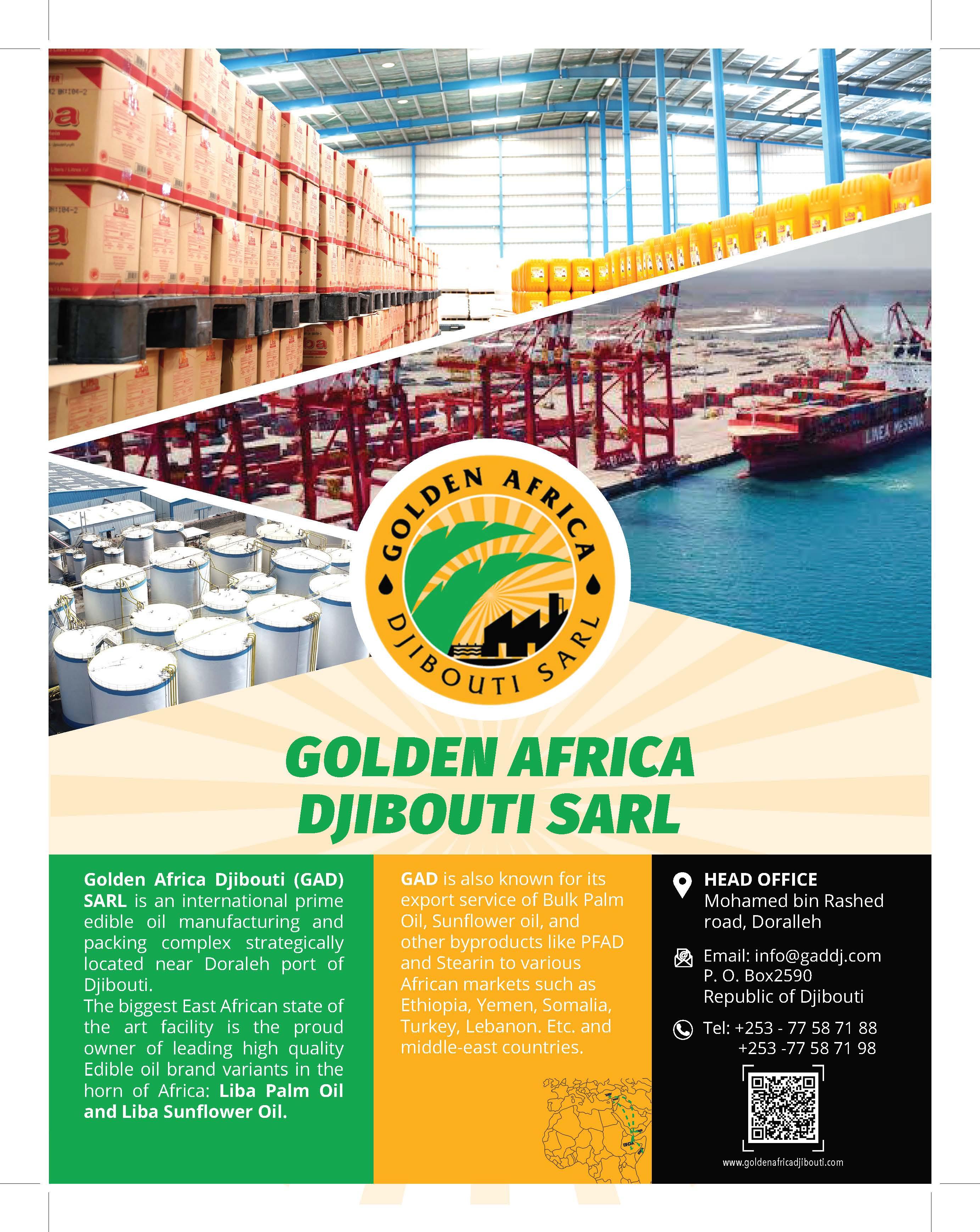
Development of the agri-food industry
Faced with near-total import dependence for both unprocessed and processed products, Djibouti has prioritized commercial agriculture and agribusiness to ensure its food resilience and economic diversification.

Djibouti’s agri-food industry remains nascent but central to sovereignty and economic diversification challenges. The low contribution of agricultural and industrial sectors to Djibouti’s economy hinders development of an agri-food value chain, itself dependent on agricultural inputs and favorable structural conditions. Djibouti thus remains almost entirely reliant on imports to feed its population. Alongside imports, Djibouti is trying to develop a local agri-food industry, symbolized by the production of palm oil and canned tuna. This could potentially reduce import dependence and stimulate the local economy. Within its "Vision 2035" strategic plan, the government bases Djibouti’s industrial sector development on agri-food industry growth prospects both to strengthen food resilience
OPPORTUNITIES
and boost exports.
The government therefore targets commercial agriculture and agribusiness development through four potential value chains proposed in the National Pact from the Dakar Summit (January 2023): goat meat; dates; market garden products; and marine aquaculture. Total investment for these four value chains is estimated at USD 199.6 million.
Key donors in the agricultural sector are AfDB, IFAD, EU, and the World Bank. In December 2023, the World Bank approved a new USD 15 million credit from the International Development Association (IDA) to enhance competitiveness and resilience of select agri-food value chains in Djibouti, targeting 1,500 investors (30% women). It thus aims to develop the agri-food sector throughout the value chain, from producer to consumer.
The future of Djibouti’s food security lies in improving the efficiency of its agri-food sector. This is why the government aims to attract private investment along the entire agri-food value chain, and thus create new jobs for young Djiboutians.

Access to drinking water and sanitation
One of the objectives of the Djiboutian government's Vision 2035 program is to enable universal access to water and sanitation by 2035. Significant investments have been made toward this goal.
IIn 2023, 72% of the Djiboutian population had access to drinking water and 51% to sanitation. However, significant disparities are observed between the country’s urban and rural regions. In rural areas, households lack sufficient adequate storage infrastructure to collect water and preserve its quality. Furthermore, water stress impacts water access for populations, agriculture, and livestock. Limited water resources can hinder economic development. Additionally, for years, major investments have been made in the water sector to ensure sustainable access to drinking water and productive water for the entire population: 170 deep boreholes in rural areas, 70% of which operate on solar energy; 1,520 wells and over 300 underground cisterns and excavations; 61 micro-dams and 7 water retention dams with a total capacity exceeding 20 million m³. Regarding urban areas, considering population growth, port infrastructure expansions, and industrial establishment in free zones, two major projects have been completed: the Hadagala-Djibouti drinking water supply system with a daily volume of 100,000 m³/day, and the Doraleh desalination unit with a capacity of 25,000 m³/day, to fully meet urban centers’ drinking water needs.
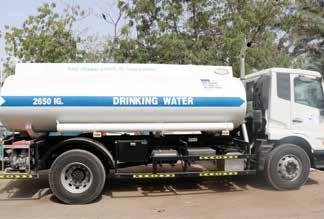
KEY FIGURES
72%
ACCESS TO DRINKING WATER FOR THE DJIBOUTIAN POPULATION IN 2023 51%
ACCESS TO SANITATION IN 2023
100%
ACCESS TO DRINKING WATER AND SANITATION BY 2035
These efforts have improved drinking water access for populations in both rural and urban areas, with free provision in rural zones.
Since its inauguration in 2017, the cross-border aqueduct, supplied by 28 deep wells in Ethiopia’s Kulen region, has played a crucial role in supplying Djibouti’s regions of Ali Sabieh, Dikhil, D’Arta, and the capital Djibouti. A notable aspect of this initiative is the agreement between both countries to provide Djibouti with 100,000 m³ of drinking water daily free of charge for 30 years, per the bilateral agreement terms. This measure, part of a broader regional integration vision, reflects commitment to sustainable water resource management and enhanced cross-border cooperation. Considered one of Africa’s largest, this aqueduct spans approximately 374 km. For Djibouti, this expansion of drinking water supply fulfills President Ismail Omar Guelleh’s promise to guarantee water access for all citizens.
The Cross-Border Drinking Water Supply Project (AEP), with innovations like pressurized pumping and gravityflow pipeline transport, demonstrates tangible progress toward this ambitious goal.
Sanitation access shows marked disparities between rural and urban territories, and even within the capital where high-density neighborhoods lack sanitation infrastructure due to absent collective solutions. The government thus links poverty reduction and sanitation access. The 2023 announcement of EIB support for water desalination and wastewater treatment in Djibouti marks a significant step toward water supply security, enhanced resilience to climate change effects, and the country’s sustainable development. The new €79 million investment is implemented by Djibouti’s National Office for Water and Sanitation (ONEAD). Falling under the Vision Djibouti 2035 strategy, the project represents phase two of the
OPPORTUNITIES
PEPER initiative (Potable Water Production through Desalination and Renewable Energy). Phase one enabled daily production of 22,500 m³ of freshwater. Phase two will increase production to 45,000 m³; it also includes construction of a 12 MW photovoltaic plant to power the desalination plant. Another project funded by the French Development Agency (AFD) and the EU, the consortium SeurecaVeolia and OiEau, in partnership with INSUCO, has been selected as ONEAD’s operations assistant to support its transformation. Over the next five years, this comanagement project aims to address major water management challenges in the Republic of Djibouti.
The water and wastewater sector remains very promising for companies involved in large-scale infrastructure construction projects, as well as in the development of stand-alone solutions.

Fisheries
Djibouti's fisheries sector, despite its fisheries wealth, faces numerous challenges such as low harvesting capacities, inadequate infrastructure, an aging workforce, and high operational costs.
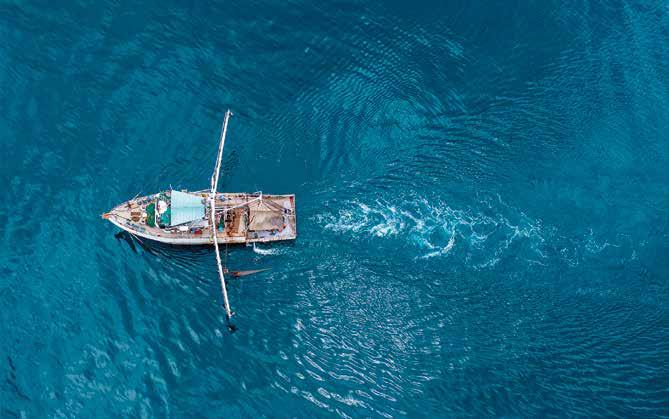
The Republic of Djibouti possesses 372 km of coastline. While fisheries potential is estimated at 47,000 tonnes, the fishing sector, dominated by artisanal fishing, remains largely under-exploited. The government’s objective is therefore to unlock the untapped potential of Djibouti’s fisheries sector. Accordingly, a 2024 study mapped value chains, identifying promising fish species to meet local demand and access regional and international markets.
The 2022 Fisheries Code is the legal instrument governing the development and control of the national fishing sector. It rests on three pillars: prohibition of fishing in Djiboutian waters by foreign vessels; prohibition of industrial fishing;
prohibition of trawling except for scientific purposes. A bilateral agreement was signed between the Republic of Djibouti and the Somali Democratic Republic. This agreement recognizes the historical rights of Djiboutian fishermen in Somali territorial waters. In return, the Djiboutian government grants Somali fishermen access to the Djiboutian market for their products along with technical facilities.
The Vision Djibouti 2035 strategy document designates fisheries as a priority sector for the country’s economic diversification. The government thus banks on its abundant fisheries resources and the development of marine aquaculture—currently non-existent—to diversify the national economy. The strategy leverages export opportunities, particularly to Ethiopia, Europe, and Gulf countries, while reaffirming the nation’s
KEY FIGURES
372 km OF COASTLINE
47,000 tons OF ANNUAL FISHERIES POTENTIAL
2,232 tons/year CURRENT AVERAGE
3,000 POTENTIAL DIRECT JOBS
800 HECTARES OF MANGROVE
1,000 MARINE SPECIES
commitment to maintaining an exclusively artisanal fishing model.
This model would be built on three axes: encouraging acquisition of new vessels with greater range; exploitation of small pelagic resources (shortlifecycle fish: anchovies, horse mackerel, mackerel etc.); and experimentation with new fisheries, particularly mollusks and crustaceans through promotion of marine aquaculture. A strategic framework for aquaculture development is under preparation. Fisheries constitute an endogenous growth sector with high potential for Djibouti’s
secondary towns. The government prioritizes upgrading infrastructure at various landing ports. It notably secured IFAD (International Fund for Agricultural Development) funding for fishery infrastructure improvements through new fishing facilities with cold storage in Obock and Tadjourah.


MANGROVE ECOSYSTEMS
60% of commercially harvested fish species depend on mangrove ecosystems at some stage of their life cycle, directly contributing to fisheries economic production. In Djibouti, mangroves cover a total area of 800 hectares. The existing mangrove ecosystems consist primarily of mangrove plants. Godoria represents the largest mangrove forest in terms of area. Mangroves play a vital role in providing fishery products and protecting coastal zones from storm surges and flooding. Finally, they rank among the most effective carbon-storing ecosystems and thus mitigate climate change.
Along a 400 km stretch, coral reefs of various species are found in Djibouti due to the convergence of three biogeographic zones: habitats from the warm tropical waters of the Indian Ocean and Red Sea, and those from the cold waters of the Somali region and Arabian Sea.

Interview with Mohamed Fouad Abdo, Director GeneralofDjibouti’sNationalOfficeforWaterand Sanitation (ONEAD), a key player in water management fully aligned with development plans.
What are ONEAD’s primary missions?
ONEAD’s core missions are to implement the necessary means for producing and distributing drinking water, collecting and treating communal wastewater, enforcing autonomous wastewater sanitation policies, and managing stormwater collection. It also handles all customer service operations: quotations, connections and repairs, subscriptions, meter readings, billing, and collections. Additionally, ONEAD manages the planning and development of drinking water supply and sanitation infrastructure, designs, sizes, and coordinates project execution with private contractors and international funders. ONEAD’s jurisdiction covers the Djibouti metropolitan area and urban centers in five inland regions.
What ongoing projects exist in Djibouti’s drinking water and sanitation sector?
Several projects are currently underway. In drinking water, rehabilitating the distribution network (Phase 3 of the FADES project) will enable citywide distribution of water sourced from the Ethiopia cross-border supply pipeline and the Doraleh seawater desalination plant. Doubling the desalination plant’s capacity from 22,500 to 45,000 m³/day will improve water quality by reducing salinity and decreasing reliance on boreholes in the supply mix.
74 I YEARBOOK DJIBOUTI : Economic report
For sanitation, the Djibouti Sanitation Network Extension and Rehabilitation Project (PERRAD) aims to expand secondary and tertiary networks in underserved neighborhoods of Djibouti City. As part of this project, doubling the Douda treatment plant’s capacity from 40,000 to 80,000 population equivalents is nearing completion.
Committed to environmental preservation and Djibouti’s energy independence, ONEAD develops programs to power its facilities with renewable energy. Most boreholes in the north already use photovoltaic panels, and a project to partially supply the Doraleh desalination plant’s second phase with a solar farm is being finalized.
Can you discuss PROSPERO, ONEAD’s Strategic Performance Program?
The PROSPERO project aims to achieve operational and economic performance, a service level among the best in Sub-Saharan Africa, and to ensure universal access to drinking water for Djibouti’s entire population by 2035. A performance contract was signed in 2024 between ONEAD and the Government of Djibouti to meet the objectives of the Vision 2035 Plan developed by the Presidency of the Republic of Djibouti. The PROSPERO project supports ONEAD in achieving these objectives. Its purpose is to adapt ONEAD’s organization to maximize the benefits of new strategic infrastructure and networks commissioned in recent years, both for drinking water services (desalination plant, water conveyance pipeline from Ethiopia) and sanitation services (Douda and Balbala wastewater treatment plants). This organizational adaptation entails strengthening ONEAD’s organizational, commercial, technical, and financial capacities.
The Consortium Seureca / Veolia / OIEAu was selected to implement this project. Beyond its consulting role for enterprise transformation management and the implementation of an ambitious training plan for ONEAD staff, several Veolia engineers and technicians will be seconded to managerial positions within ONEAD to support the enterprise’s daily transformation. The contract commenced on 1 October 2024, for a duration of 5 years.
Blue economy development
The Blue Economy, aligned with IGAD and AU strategies, represents a new economic growth opportunity for Djibouti.
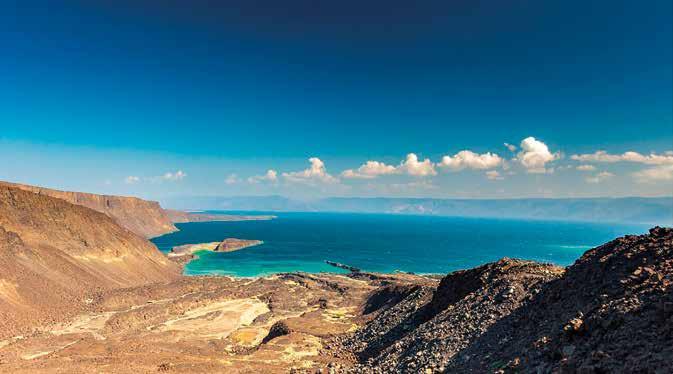
Beyond fisheries, sectors identified as part of the Blue Economy include port and maritime activities, salt extraction and salt-based chemical manufacturing, tourism, hydropower generation and distribution, desalinated water production, and submarine telecommunications cables. The national Blue Economy strategy aims to guide development of an inclusive and sustainable Blue Economy, contributing significantly to the transformation and growth of the country and region. Africa’s lowest point, Lake Assal—the world’s saltiest—has been a site of extraction and trade since time immemorial. A new milestone was reached with Salt Investment’s 2019
OPPORTUNITIES
construction of the sodium bromide plant. Private investors’ salt extraction from Lake Assal and production of basic chemicals like sodium bromide derived from salt processing are linked to the Blue Economy, as is the existing bottled water industry from seawater desalination and mineralization. Djibouti’s maritime sector ranks as the nation’s second-largest employer after the state, with over 3,000 dockworkers, accounting for more than 53% of formal and informal port-related economic activity. Thus, promoting tailored industrial policies and further developing high-potential sectors like the Blue Economy can significantly advance national prosperity.
The government is keen to attract investment and modernize infrastructure so that Djibouti can finally take full advantage of its fisheries resources. Marine aquaculture, currently non-existent, needs to be structured.
Opportunitiesaboundinbunkering, shipyards,oilorgasterminals,and lightindustry.Wecancatertothe entiresub-region.Itiswithinthis strategicoutlookthatmajor projectsliketheDamerjog IndustrialParkandthe redevelopmentofDjiboutiCity’s historicportarealigned.
ExcerptfromtheInauguralAddressofHisExcellencyIsmailOmar Guelleh,PresidentoftheRepublic,May16,2021.
Infrastructure & Equipment
Anchored in Vision Djibouti 2035, the government's large-scale investments in transport and logistics infrastructure development aim to position Djibouti as a regional trade hub.

Djibouti: logistical hub of the Horn and model for the continent
Strategically positioned at the southern entrance to the Red Sea, Djibouti serves as a bridge between Africa and the Middle East. Through infrastructure development, the country is establishing itself as a key player in regional transport and logistics.
Anchored in Djibouti’s Vision 2035, the government’s large-scale investments for the development of transport and logistics infrastructure are aimed to positioning Djibouti as a regional trade center. Combined with business climate reforms, these have spurred robust economic expansion. The significance of Djibouti’s strategic position as a nexus for regional connectivity and trade has substantially strengthened over the past decade. With its access to the Red Sea, the Arabian Sea, the Indian Ocean, and the Persian Gulf, the regional corridor is critical for the movement of goods and services within the area.
In September 2024, the World Bank’s Board of Directors approved additional funding of 90 million dollars for the Djibouti Regional Economic Corridor Project, which is part of the initiative for the Horn of Africa. This additional financing will enable Djibouti to consolidate its position as a hub for regional trade and

KEY FIGURES
8 SPECIALIZED PORTS
14 HECTARES OF FREE ZONE
improve the living of its population. The objective is to enhance regional connectivity and resilience, strengthen logistical efficiency, and ensure improved accessibility for the Djiboutian population living along the southern corridor linking Djibouti to Addis Ababa. The project integrates into a broader regional integration initiative in the Horn of Africa, covering Djibouti, Eritrea, Ethiopia, Kenya, and Somalia. Launched in 2019, the Horn of Africa Initiative aims to deepen regional integration and foster closer economic ties.
The new funding will support the rehabilitation, upgrading, management, and maintenance of three sections of the southern road corridor. It will also bolster activities to facilitate the transit of goods— thereby supporting regional integration—and provide technical assistance to Djiboutian authorities. The project will further contribute to efforts aimed at realizing Vision 2035, an initiative designed to diversify the economy and strengthen social inclusion. Owing to Djibouti’s strategic position in the Horn of Africa and its port facilities, the transport sector plays a pivotal role in the national and regional economy.



Interview with Ide Ahmed Mohamed, Director GeneraloftheDoralehMultipurposePort(DMP),a strategic multimodal hub and logistics giant connectingAfricatotheworld.
What infrastructure does the Doraleh Multipurpose Port (DMP) feature?
Inaugurated in 2017, DMP spans 690 hectares as a pillar of modern logistics infrastructure. Its strategic location at the AsiaEurope-Africa trade crossroads enables seamless road/rail connections to Ethiopia and simultaneous docking of multiple vessels. As the largest regional port, it serves the COMESA market, offering diversified services for containers, conventional cargo, livestock, and general merchandise.
DMP s operational excellence is based on a sophisticated management system, guaranteeing an optimal logistics flow from dock to delivery. Cutting-edge technologies enable a single window for container operations and reliable, efficient data exchange. The Unified Customer Service Platform enhances client satisfaction and optimizes traffic flow. The port infrastructure is designed for high-volume handling. The dry bulk terminal, East Africa s largest, can accommodate Panamax vessels and unloads 25,000 MT/day. Equipment includes portal cranes, bucket loaders, excavators, and bulk tractors. The storage system comprises 8 warehouses and 4 silos consisting of 2 wheat silos with an 85,000-ton capacity and 2 fertilizer silos with a 145,000-ton volume. DMP demonstrates its efficiency with a fertilizer shipping rate of 24,100 tons in 24 hours via road and rail.
The break bulk terminal (7,000 MT/day/vessel) handles diverse cargo: steel products, foodstuffs, and large-scale projects. The container terminal processes 500,000 TEUs/ year at 40 containers/hour discharge rate. 80
The Ro-Ro terminal handles 40,000 vehicles (200 units/hour). The rail terminal features five lines: 2 for dry bulk (fertilizer/ wheat), 1 for general cargo, 1 for vehicles, 1 for containers.
What role does DMP play in theregional supply chain?
DMP, connecting the 19 COMESA countries and their 380 million consumers, serves as a crucial gateway for landlocked nations to access global maritime trade. Its strategic position establishes it as a major transshipment hub, optimizing supply chains and reducing transit times.
Collaboration with WFP for humanitarian logistics reinforces its role, with significant pre-positioning capacities. DMP has also strengthened its partnership with USAID and WFP for food security.
The reception of the vessel MT Sugar Monrovia, laden with palm oil destined for Türkiye, illustrates its function in expanding regional exports. DMP’s efficient logistics and strategic location at the Bab el-Mandeb Strait have consolidated its position as a premier port, industrial, and logistics platform, enhancing Djibouti’s global competitiveness.
DMP’s operations impact economic development through job creation and investment, thereby contributing to the prosperity of Djibouti and the region.
What are your development prospects?
DMP plans to increase its handling capacity, invest in stateof-the-art technologies, and enhance infrastructure. The installation of new grain bagging lines and the development of an integrated port ecosystem—connecting ports and the free zone by road, sea, air, and rail—exemplify these efforts. Attracting new businesses and expanding into emerging markets, DMP plays a vital role in facilitating trade, promoting economic growth, and strengthening regional partnerships. The objective is to consolidate its position as a global logistics hub linking Asia, Africa, and Europe, in alignment with the vision of the President of the Republic, His Excellency Mr. Ismail Omar Guelleh. DMP is committed to providing reliable and efficient services, guided by values of integrity, dedication to staff and clients, profitable growth, responsible conduct, and the pursuit of excellence and innovation.
Maritime transport
Strategically located at the crossroads of Africa and the Middle East, the country benefits from a geographic position through which approximately 15% of global maritime traffic transits, enabling it to establish itself as a global shipping hub over the past two decades.
Djibouti is a crucial hub for regional and global trade, with annual port revenues exceeding $400 million. The country's economy relies on a deepwater port complex ranking among the world’s most modern facilities. The Djibouti Container Terminal (SGTD, through its facilities and productivity, fulfills import-export functions for the entire region while developing new activities like transshipment. Four state-of-the-art gantry cranes have been acquired for high-capacity vessels. The Port of Djibouti, one of the world’s highest-ranked deep-water port complexes, achieved remarkable recognition in the 2022 IPPC report as Sub-Saharan Africa’s top container port, Africa’s 3rd, and the world’s 26th.
The Port of Djibouti thus remains an indispensable logistics pillar in Africa, playing a central role in regional economic development with steadily increasing container traffic, reinforcing its prime position for major regional shipping lines.
Strategically located near the world’s busiest shipping lanes, the port sector has strengthened with the four ports of Doraleh, Tadjourah, Goubet, and Damerjog forming integral parts of the country’s economic strategy and Djibouti’s rise as a logistics hub.
THE DORALEH MULTIPURPOSE PORT
In September 2024, Djibouti proposed Ethiopia joint operation of the Tadjoura Port on the Gulf of Aden. While port-related tax revenues constitute a significant portion of Djibouti’s GDP, Ethiopian operators have consistently viewed their neighbor as a maritime trade alternative since the 1998 Eritrea-Ethiopia conflict. With nearly 120 million inhabitants, Ethiopia represents a vast market for Djibouti, whose ports already handle most volumes for the landlocked neighbor.
In June 2024, Saudi Arabia secured a 12,092 m² logistics zone lease agreement in Djibouti Port. In exchange, Djiboutian authorities committed to guaranteeing equitable opportunities across all sectors —from renewable energy to technology—for Saudi investors. A new freight service connects Jeddah Port to India’s Nhava Sheva and Mundra ports, UAE’s Jebel Ali, Djibouti, and Yemen’s Aden, with a capacity of 1,600 standard containers.
Despite regional challenges, Djibouti demonstrated notable resilience in its maritime transport sector during 2024, supported by robust port performance and a key strategic position.
In the late 2000s, President Guelleh made the decision to relocate the activities of the historic port along the Bay of Doraleh, 5 km to the west, by establishing an ultra-modern container terminal as well as a bulk and minerals port. Inaugurated in May 2017, the Doraleh Multipurpose Port (DMP) features a 1,200-meter quay wall accommodating 5 berths with a draft of 14.5 meters.690 hectares of land are dedicated to industries with a direct connection to the Djibouti–
Addis Ababa railway.
The DMP is one of the best ports in the East Africa region, equipped with modern infrastructure. The total investment was $590 million. Plans are in place to expand it to reach 4,130 meters of quay wall and 17 berths. The DMP can accommodate vessels of up to 100,000 DWT and has terminals for handling petroleum products, breakbulk and bulk cargo, RoRo, and even livestock. All terminals have direct access to the Addis Ababa–Djibouti railway, which provides landlocked Ethiopia with railway access to the sea. For an additional investment of US$ 70 million, the Damerjog Livestock Terminal was inaugurated in April 2021 with a 655-meter-long quay and a total capacity of 10 million head of livestock per year.
Road transport
The
government aims to create a dense, modern road network, as economic development and poverty reduction partly depend on bridge and road construction.

The Djibouti Roads Agency (ADR) is responsible for comprehensive road infrastructure management, handling design, maintenance, rehabilitation, construction, etc. The implementation of an automatic mechanism for managing corridor roads allows the ADR and state resources to focus on urban roads.
Decided in April 2024, the governance restructuring project aims to restore coherence in the management of the road network and, ultimately, to improve the state of road infrastructure. Enhancing this sector is essential for sustaining port economic activity,
strengthening the regional hub role, mobilizing partner funding, and advancing national economic development.
The road sector has seen three completed projects, the largest being the Tadjourah-Balho road. The inauguration of a 112 km road corridor connecting the city of Tadjourah to the border town of Balho took place in November 2019. Funded by the Kuwait Fund for Arab Economic Development (KFAED) with $156 million, this corridor serves as a development catalyst for the region and an efficient extension of Tadjourah Port. Construction work for a new Boli-Adaillou-Dafenaytou road section was launched during this inauguration.

ROADINFRASTRUCTUREMANAGEMENT THANKS TO ARTIFICIALINTELLIGENCE(AI)
In early 2025, Djibouti Ports Corridor Road SA (DPCR SA), RapidCanvas, and 4C Solution launched the DPCR CorridorVision AI project to transform road infrastructure management using cutting-edge artificial intelligence. This initiative aligns with Djibouti's National Vision 2035 to establish the country as a key logistics hub for East Africa and strengthen its regional trade role. Through AI, DPCR CorridorVision monitors road conditions and detects issues like potholes in real time, accelerating maintenance and optimizing resource allocation. This proactive approach ensures safer, more sustainable roads linking Djibouti to neighboring countries like Ethiopia, boosting regional trade and economic stability.
Railway Sector
Leveraging regional integration, East Africa’s first electrified railway line is the gateway for goods destined for the vast markets of COMESA member countries.

The Djibouti-Ethiopia railway plays an important role in building East Africa’s connectivity and the region’s great integrated transport corridor. Unlike the old railway, the current line is fully electrified.
Connecting the Ethiopia-Djibouti railway line to Ethiopia’s Dire Dawa Free Trade Zone will pave the way for economic growth. Inaugurated in 2022, the Dire Dawa Free Zone is located near Djibouti’s ports.
According to the Ethio-Djibouti Standard Gauge Railway Share Company (EDR), linking the free trade zone to railway infrastructure should enhance regional trade and commerce, benefiting businesses through efficient transport networks. This advancement marked a major milestone for the region’s railway infrastructure. By extending and improving its services, the Ethiopia-Djibouti Railway is establishing itself as a hub of growth and opportunity in the region,
strengthening its vital role in building Ethiopia’s economic future.
East Africa’s first electrified railway reduces goods transit time from over three days to under 20 hours and cuts costs by at least one-third. In September 2024, as part of efforts to diversify and optimize services on this 752-km China-built railway between Addis Ababa and Djibouti, EDR began transporting livestock from central Ethiopia to Djibouti’s ports.
The Addis Ababa-Djibouti railway line now provides diversified passenger and freight services, with a 39% annual increase in transport revenue. Official data indicates that in May 2024, the railway transported 680,000 passengers and 9.5 million metric tons of freight. Djibouti’s port volume has already increased by approximately 20%
Airport sector
Through the enhancement of its airport facilities, Djibouti is strengthening its position as a multimodal logistics hub for the transport and redistribution of goods and merchandise.
In June 2023, the President of the Republic inaugurated the extension of Djibouti International Airport located 10km from the capital. This expansion adds 600 m² to its terminal building, doubling its capacity from 150 to 350 people. All renovated facilities feature high-speed internet and permanent air conditioning. By strengthening its airport infrastructure, Djibouti further enhances its role as a multimodal logistics hub for transporting and redistributing goods and merchandise. This airport operates civilian, military flights, and air cargo. Integrated into the national "Vision 2035" plan, the airport sector includes constructing two new airports: one in the Obock region and a new international airport in Bicidley (hinterland near the Somaliland border and future Damerjog port complex)
Total cost is $600 million. The new Al Haj Hassan Gouled Aptidon International Airport—named after Djibouti’s first president—will be built approximately 60 km from Ambouli International Airport. Capable of handling all commercial aircraft types, it will process 1.5 million passengers annually and 100,000 metric tons of air cargo. This airport represents a strategic milestone in Djibouti’s multimodal transport synergy strategy. Its cargo terminal will serve as an air-sea logistics base, positioning Djibouti as a regional hub.
The second project, Ahmed Dini Ahmed International Airport (named after the first head of government), is under development near the Seven Brothers archipelago in Obock. This smaller facility will handle 350,000 passengers annually during its first five years. According to a World Bank study, Djibouti could host up to 500,000 tourists annually by 2030.
THE DJIBOUTIAN SPACE PROGRAM
The Djibouti 1-A satellite was placed into orbit on November 11, 2023 from the Californian Space Base of Vandenberg aboard a Falcon 9 rocket of the SpaceX company. Designed by a team of approximately ten Djiboutian engineers and technicians trained at the Montpellier University Space Center (CSUM), the nanosatellite collects real-time meteorological and hydrometric data, particularly in areas without internet coverage, to improve agriculture, monitor climate change phenomena such as droughts, and combat food insecurity. While the launch of Djibouti 1-B, initially announced for 2024, has been postponed, the government is committed to constructing a spaceport in Obock, following a memorandum signed last year with the Hong Kong Aerospace Technology Group, valued at $1 billion. Five years of construction are projected to be required to build seven satellite launch pads, as well as three rocket test benches. In the future, additional 1U CubeSats and larger nanosatellites (3U type, potentially 12U) are planned for launch to support more ambitious applications such as high-resolution imaging (to ensure border security, safeguard food security, monitor public health, ...). Djibouti is a member of the African Space Council, composed of 10 members from five distinct African regions, which is expected to play a crucial role in coordinating the agency’s activities and guiding continental space policy.



Interview with Mohamed Youssouf Charmake, Director General of Djibouti International Airport, located 10 kilometers from the capital and which currently handles nearly all of the country s air traffic.
What actions does the airport take to maintain optimal security for its travelers?
The Djibouti International Airport is part of a proactive safety policy, aligned with national and regional priorities. This strategy relies on the integration of advanced surveillance and control systems, ensuring constant vigilance and a rapid response capability to potential threats. On the operational level, the National Gendarmerie plays a central role in the safety of the airport. In addition to protecting infrastructure, its specialized units ensure traveler safety through rigorous checks. The efforts of the government and the commitment of all stakeholders form a robust system ensuring a safe and resilient environment for our travelers and partners. Furthermore, particular emphasis is placed on strengthening team skills through ongoing training programs and regular exercises. By adopting this comprehensive approach, security remains at the heart of our mission.
What efforts is the airport making to address environmental challenges and reduce its carbon footprint?
Djibouti, like the entire African continent, is particularly exposed to the effects of climate change. Faced with these challenges, we have implemented an ambitious and measurable ecological transition, aligned with the UN SDGs. Currently in the validation phase by ACI for the
Net Zero" program, our platform is among the African infrastructures committed under the "Airport Carbon Accreditation" This approach demonstrates a strong commitment to integrating sustainable solutions across all operations, with the objective of a progressive 30% reduction in the carbon footprint by 2030. Concrete initiatives are already in place, such as the integration of electric vehicles into the operational fleet for more environmentally friendly mobility. At the same time, an in-depth emissions analysis has been conducted, enabling the development of a carbon map guiding priority actions to be implemented. Collaborations are also underway with regional partners to promote responsible initiatives. By raising user awareness of the importance of sustainability, the goal is to build a future where operational efficiency and environmental respect go hand in hand.
What are your projects and ambitions for the future of Djibouti International Airport?
Our vision is based on innovation and development, with the objective of consolidating our role as a strategic hub in the region. To respond to the growth in air traffic, major investments have been dedicated to the modernization of existing infrastructure. Simultaneously, the construction of a new airport will provide ultramodern facilities and increased handling capacity. This large-scale project will strengthen Djibouti’s visibility on the international stage. In the tourism sector, the airport actively supports initiatives aimed at strengthening the country ’s attractiveness. The significant reduction in visa costs since 2019 has helped attract more visitors. To support the post-Covid-19 recovery, efforts are focused on the continuous improvement of services and the streamlining of infrastructure. Finally, we are strengthening our role as a logistics platform by optimizing regional economic corridors, particularly within the framework of AfCFTA and COMESA. In perfect alignment with the African Union’s Agenda 2063, whose implementation is currently championed by a Djiboutian, Mr. Mahamoud Ali Youssouf, the airport plays a key role in connecting the continent to major global hubs and accelerating its economic integration. By combining these ambitions, we affirm our key role in the economic development of the region, while guaranteeing first-rate mobility and connectivity.
Construction, a foundational sector
Fueled by economic expansion and major national infrastructure projects, the construction industry (BTP) holds a central position within Djibouti's economy, making significant contributions to economic growth and job creation.
The BTP sector is marked by continuous growth and sustained investment, despite relatively high construction costs. The construction sector has thus experienced significant growth over the last decade and contributed 5.8% to GDP in 2022. The ambitions for economic diversification as well as the substantial infrastructure needs generated by increasing urbanization promise to make the BTP sector a driving force in the Djiboutian economy. Thus, the government aims to increase the sector’s share of GDP to 16% by 2035. The development of the sector is driven by the advent of major national infrastructure projects aimed at leveraging the country s geographic endowment as envisioned in the national strategy Vision 2035, which aims to position Djibouti as the leading regional commercial and logistics hub. The geographic and social inclusivity of infrastructure projects is a growing concern for donors and the government, given the development disparities within Djibouti s territory and population. Regarding housing, Djibouti faces a significant deficit currently estimated at 30,000 units for a population of less than one million people. This problem is expected to intensify in the coming years and become a major challenge for the country s development, particularly due to population growth and urban growth, two phenomena that will primarily impact Djibouti City.
Therefore, the government has set consistent objectives:Manage urbanization and promote balanced urban development through the creation of communes whose

role is to support populations, but also to contribute to urban organization and city development planning.
- Improve the lives of populations in poor neighborhoods and promote their access to basic services through the implementation of a social housing program in planned phases, in collaboration with financial partners involved in the economic and social development of the Republic of Djibouti.
- Schedule phased implementation with the help of institutions involved in developing social housing in the capital and ports towards interior neighborhoods for low-income families.
Several construction projects have been entrusted to the Urban Rehabilitation and Social Housing Agency (ARULoS). In November 2024, Djibouti launched the pilot phase of the digital platform project for building permits. The goal is to simplify and accelerate the process of granting these permits to individuals and businesses in the country.
REAL ESTATE AND CONSTRUCTION OPPORTUNITIES
The real estate market presents a significant opportunity for companies and investors willing to invest in Djibouti. Due to strong urbanization, housing needs are estimated at 30,000 units (5,000 new units per year).
Byinvestinginrenewableenergy, wearealsocreatingneweconomic opportunities,promotingthe emergenceofalocalindustryand generatingjobsinthecleanenergy sector.
ExcerptfromthespeechofHisExcellencyIsmailOmarGuelleh, PresidentoftheRepublic,duringtheinaugurationoftheGoubetWind Farm,September10,2023.
Energy&NaturalResources
The Djiboutian government has set the objective of ensuring universal access to electricity by 2035. The country aims to become Africa's first fully renewable-powered nation.
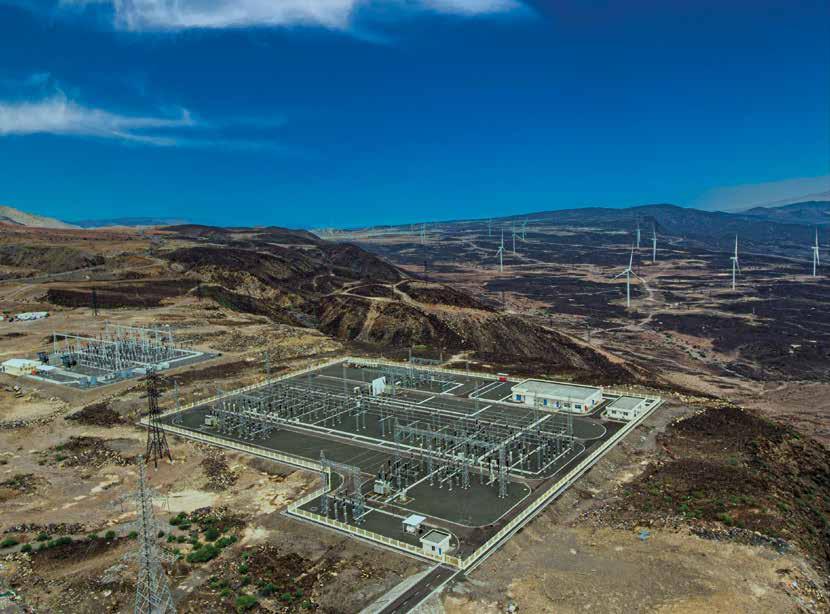
The rise of electricity
Djibouti's electricity sector has achieved significant progress and ranks within the upper tier of African nations. Due to the development of ports and free zones, energy needs will exceed 3,700 MW over the next decade.

Djibouti’s electricity access rate reached 80% in 2024, while neighboring Ethiopia stood at approximately 45%. However, the country shows significant disparity between urban areas and rural regions isolated from the power grid. The Djiboutian government has set the objective of ensuring universal electricity access by 2035.
Djibouti has committed to reducing electricity supply costs, notably by diversifying its energy mix through an electrical interconnection with Ethiopia since 2011. By 2020, this initiative enabled 81% of electricity consumed in Djibouti to come from hydroelectric imports, reducing local thermal production to just 19%
Djibouti must rely on its thermal power plants during hot and dry seasons. To increase supply and stabilize energy availability, a second Ethiopia-Djibouti interconnection project has been underway with World Bank support for the Djiboutian section since 2022, aiming to triple import capacity and maintain an affordable cost of $0.07/kWh.
Simultaneously, Djibouti is diversifying its energy sources toward solar and wind power to further reduce supply costs and ensure better energy security and green transition. In this transition momentum, the country inaugurated its first 60 MW wind farm in September 2023, developed by a consortium under the Red Sea Power banner
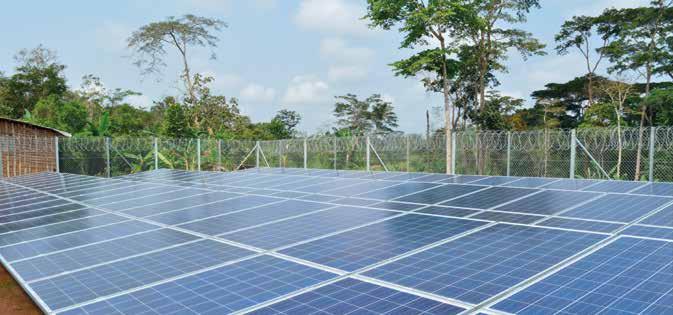
KEY FIGURES
80%
ELECTRICITY ACCESS RATE IN 2024; 65% IN 2021 (WORLD BANK)
95% IN URBAN AREAS IN 2024
45% IN RURAL AREAS IN 2024
100% RENEWABLE ENERGY BY 2035
1,000 MW GEOTHERMAL POTENTIAL
17 WIND TURBINES
in the Ghoubet region. EDD operates four independent power systems and one interconnection line with Ethiopia: two main systems for Djibouti City (113 MW with Boulaos and Marabout power plants); two secondary systems (10 MW for Southern subdivision
-Ali-Sabieh and Dhikil - and Northern subdivisionTadjourah, Obock and Day); and one 315 MW electrical interconnection line with Ethiopia since May 2011. The first Ethiopia-Djibouti Interconnection Project has been operational for over 10 years, with electricity trade between both countries increasing from 155 GWh in 2011 to 532 GWh in 2020. Since the first interconnection became operational, beyond Djibouti’s growing demand, industrial development and railway construction around Dire Dawa in Ethiopia have caused transmission network congestion. A second 230 kV Ethiopia-Djibouti transmission line – running from Semera in Ethiopia to Nagad in Djibouti – will increase Djibouti’s clean electricity supply by over 30% starting in 2025.
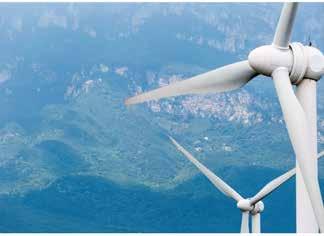
Energy transition with the Ghoubet wind farm
With the Red Sea Power wind farm, Djibouti aims to become Africa's first fully renewable-powered country. This facility is designed to produce over 50% of Djibouti's energy output.
Commissioned in September 2023 in Ghoubet near the Red Sea, the Red Sea Power (RSP) wind farm comprises 17 wind turbines with a total production capacity of 60 MW. It is slated for a 45 MW extension, to be complemented by the future 25 MW Grand Bara photovoltaic solar plant. The facility will avoid 252,000 tons of CO2 annually. As the first major international energy investment in Djibouti, this $122 million project establishes the country’s inaugural Independent Power Producer (IPP) and serves as a model for future private investments. The investor consortium behind RSP consists of Africa Finance Corporation (AFC) as lead developer, Dutch entrepreneurial development bank FMO, blended finance fund manager Climate Fund Managers (CFM), and Great Horn Investment Holding (GHIH) – an investment company owned by Djibouti Ports and Free Zones Authority and the Djibouti Sovereign Fund. Djibouti thus directly participated through equity financing in this large-scale project. The turbines will provide electricity to 38% of the previously unserved population. Red Sea Power (RSP) will further drive industrialization, development, and job creation. The generated electricity will be sold under a long-term power purchase agreement to the national utility, Électricité de Djibouti (EDD). This first national wind farm includes a social component featuring a seawater desalination unit. Solar-powered, it will produce 7 m³ of potable water per hour for neighboring communities. The country aims to become Africa’s first nation to provide 100% renewable energy to its population by 2035.
Certification of the landmark Ghoubet Wind Farm – the first utility-scale wind energy project – will pave the way for obtaining carbon credits for avoided greenhouse gas emissions.

Republic of Djibouti Joins APRA
The Republic of Djibouti was officially selected in January 2025 as a member country of APRA (Accelerated Partnership for Renewables in Africa) following rigorous assessment of activities, achieved results, and renewable energy projects.
APRA, an international partnership led by African countries and anchored in the Nairobi Declaration on Climate Change launched during COP 28 in Dubai, is an African initiative designed to help realize the continent’s vision for sustainable socio-economic development. With Djibouti’s national commitment closely aligned with APRA’s objectives, the country’s clean energy development aspirations will receive support.
This membership will enable Djibouti to secure necessary financing for its renewable energy projects, benefit from APRA’s expertise in renewable energy development, as well as access transfers of green technologies and techniques.

Renewable energy potential
The development of green energy is central to national energy policy, with the primary objective of fully meeting the energy needs of households and Djibouti's industrial sector.
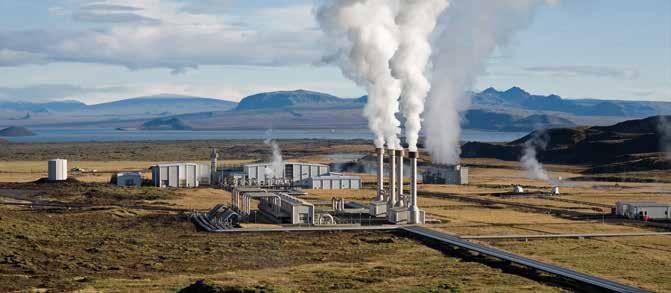
Energy development cumulatively drawn from solar, geothermal, wind, and hydroelectric sources—via the interconnection project with Ethiopia— will ra l, pidly cover all, and even exceed, the energy needs required on the Djiboutian territory. Aware of the socio-economic stakes in a promising market, the government plans to develop green hydrogen production. A structuring project will include the construction and operation of a renewable energy and green hydrogen production facility with 10 GW electrolysis capacity, part of whose generated electricity will be fed into the national grid. Located in the Obock region, it will be Africa’s first such initiative, opening the door to new
OPPORTUNITIES IN THE ENERGY SECTOR
green industrial opportunities for the Republic of Djibouti. The country also intends to leverage its significant geothermal potential: 1,000 MW buried across thirteen identified potential sites nationwide. Several projects have emerged in Galla Le Koma, Garabbayis, Fialé, and Arta.
Other initiatives, like a 40 MW biomass plant and a 40 MW tidal energy plant, should enable Djibouti to achieve its goals and reduce currently high electricity prices to continue attracting investors. In October 2024, Egypt and Djibouti signed a collaboration agreement for constructing a 276.5 kilowatt solar power plant in Djibouti, marking both countries’ shared commitment to renewable energy development.
Numerous reforms have been undertaken in recent years, including the establishment of a legal framework for Public-Private Partnerships and the involvement of private investors in the power generation sector through the Independent Power Producers (IPP) Act.
Djibouti offers real opportunities for mobilizing private financing for the climate and the green transition, particularly in the form of mixed financing or innovative instruments.
Undocumented mining heritage
Beyond the salt works of Lake Assal, Djibouti does not exploit mining or mineral resources. Within its economic diversification strategy, the State relies in particular on gold to develop mining on an industrialized scale.
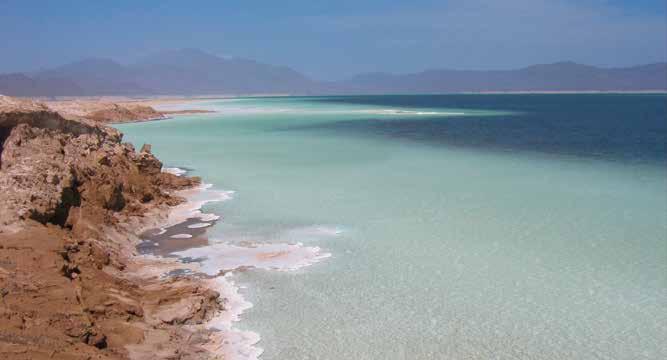
The national Vision Djibouti 2035 strategy notes the presence of mineral resources in the country, including indications of perlite, bauxite, natural gas, copper, zinc, iron, aluminum, gold, and oil.
Djibouti's mineral resources are underdeveloped and largely unexploited, with the exception of salt from the natural deposit of Lake Assal, exported as sodium bromide and industrial salt. Estimated at approximately 100 million tons, the lake's salt reserves rank among the world's largest. Furthermore, the exploitation of the natural Assal deposit yields approximately 110,000 tons of salt annually, employing 2,000 individuals, equivalent to 0.08% of total employment. This production constitutes a significant portion of the country's total exports.
Djibouti is banking on gold for its economic development. The country has granted 11 permits to the company Thani-Stratex, a joint venture between the British Stratex International and the Emirati Thani Resource, to explore for gold in Djibouti. The drilling results conducted are reported to have been conclusive.
Djibouti established, in 2016, a new mining code to regulate mining activities with the perspective of ultimately developing its resources. Numerous reforms have been introduced to make the mining sector more attractive to domestic and foreign private investors. However, the development of mining operations on an industrialized scale is still constrained by several obstacles including access to sufficient energy and water.

Interview with Dr. Thomas Bebey, Director General of UCIG Djibouti SA, a subsidiary of United Capital Investment Group (UCIG), a private investment group operating globally in the sectors of energy, logistics, real estate, and innovative technologies.
Can you introduce UCIG Djibouti SA?
UCIG SA is a Djiboutian-registered company established in 2011, operating in the Downstream petroleum sector and marketing premium products such as gas oil, super, petroleum, jet fuel (JP8), lubricants, and fuel oil 180. We belong to a major international group founded in 2009 with headquarters in Dubai. Our Group operates in over 150 countries across various domains: fuels, lubricants, bitumen, additives, renewable energy, technology, and real estate.
In Djibouti, UCIG is the leader in the local market through a diverse customer network. Our main clients operate in several business sectors: construction, the military, logistics, fishing, industry, energy, port services, aviation, automotive, services, to name but a few. We also deliver internationally. Our service stations in the capital and in localities throughout the country are built according to the requirements of international standards and are among the most impressive in Djibouti. Our organization is endowed with talented personnel, with women holding a place of choice. Our workforce is young and full of ambition. As Managing Director I possess strong expertise in the fields of management and structuring, with over twenty years of experience in the petroleum sector. The operating principles of UCIG are founded upon the effective segregation of duties, control, customer attentiveness, ethics, performance objectives, and
teamwork. UCIG SA encompasses: several fixed and mobile service stations; approximately fifty employees; employees; nearly 120,000 m³ sold annually; significant euipment investments; permanent stock availability; dedicated Customer Care; large permanent fuel storage capacity; optimal maintenance service; and a certified delivery truck fleet operating under a comprehensive safety management system.
Our watchwords are: Safety – Product Quality – Customer Satisfaction.
How do you contribute to Djiboutis economic development?
As a corporate citizen, we contribute through the regular payment of taxes and duties; the generation of economic added value with numerous local partners and contractors; the recruitment and training of young men/women and their empowerment; and investments in service stations across the entire territory.
We participate in charitable works, make contributions in favor of social organizations, and have established various partnerships. We also maintain a relationship of trust with our overseeing ministry, the MERN (Ministry of Energy and Natural Resources), which spares no effort to support and facilitate our actions.
What is your development strategy?
Thanks to the unwavering support of our shareholders, we are sustainably committed to increasing our investments and improving productivity.
Our strategy is based on prospecting for new clients, the rationalization of professional costs, the upskilling and capacity building of staff, the improvement of commercial margins, the construction of new service stations, and the consolidation of gains. We also plan to modernize working tools, implement an improved safety management system, and adopt more demanding new performance indicators. We also intend to develop additional revenue through the commercialization of new products at service stations and to establish win-win partnerships with targeted entities. Furthermore, particular emphasis will be placed on communication.
UCIG SA envisions itself as a leading company that adapts to changes in the energy sector with the following objectives: providing added value for shareholders; active participation in Djibouti s economy; and the continuous improvement of yields and the protection of employees.
The hydrocarbon challenge
Djibouti represents a strategic hub for hydrocarbon trade. With its pivotal location, it is poised to become a regional platform for importing and redistributing petroleum products and derivatives through Djibouti Damerjog Industrial Park (DDIP), the first heavy industrial and petrochemical base.

Djibouti aims to be a storage and export center for refined petroleum products not only in the Republic of Djibouti but also in all the countries of the region in the short term and thus become a regional reference. The Bab El-Mandeb Strait ranks as the world’s fourth maritime chokepoint for hydrocarbon transport. All fuels distributed in Ethiopia are imported via Djibouti. Exploration prospects and potential along Djibouti’s maritime facade indicate promising opportunities for economic diversification and job creation.
Born from the vision of the President of the Republic, the Djibouti Damerjog Industrial Park (DDIP) is the first heavy industrial and petrochemical base of Djibouti and the only industrial complex in East Africa equipped with a road, port, airport and rail network. Located approximately 1 km from the Somaliland
OPPORTUNITIES IN NATURAL RESOURCES
border, DDIP ranks among the largest projects undertaken by Djibouti. It spans a total area of 30 km² comprising 10 km² of land and 20 km² of sea. This heavy industrial base of Djibouti features a 2.51 km² pilot zone. Costing over one billion dollars, this industrial-port complex will house by 2035 fuel storage depots, an oil refinery, a cement plant, and a power station, all backed by a dedicated petroleum port. DDIP constitutes a pivotal link for advancing industrialization and economic diversification in Djibouti and the wider region. In early 2019, Djibouti concluded an agreement with Ethiopia for the construction of a 767-km pipeline to transport Ethiopian natural gas to Djibouti’s ports. The gas, with discovered resources of 200 to 225 billion cubic meters (bcm), would be extracted from the Somali Region in eastern Ethiopia and transported to Djibouti via this pipeline, where it would be liquefied then exported via maritime shipping.

To promote investments in non-renewable resources, the Djiboutian government revised, in 2016, the Mining Code which applies to exploration and exploitation activities of mineral resources in public or state-protected areas.
New investors in the natural resources sector are being increasingly encouraged by the government.
Ourworldfacesnumerous environmentalchallengesnotably, climatechange,thelossofnatureand biodiversity,andpollution,notto mentiondesertification,landandsoil degradation,drought,and deforestation.
ExcerptfromthespeechofPresidentIsmailOmarGuellehatthe6th SessionoftheUnitedNationsEnvironmentAssembly, February29,2024.
Environment & Sustainable Development
The Djiboutian government's priority remains strengthening climate resilience. Vision 2035 champions green transition, climate change adaptation, renewable energy development, and sustainable water management.
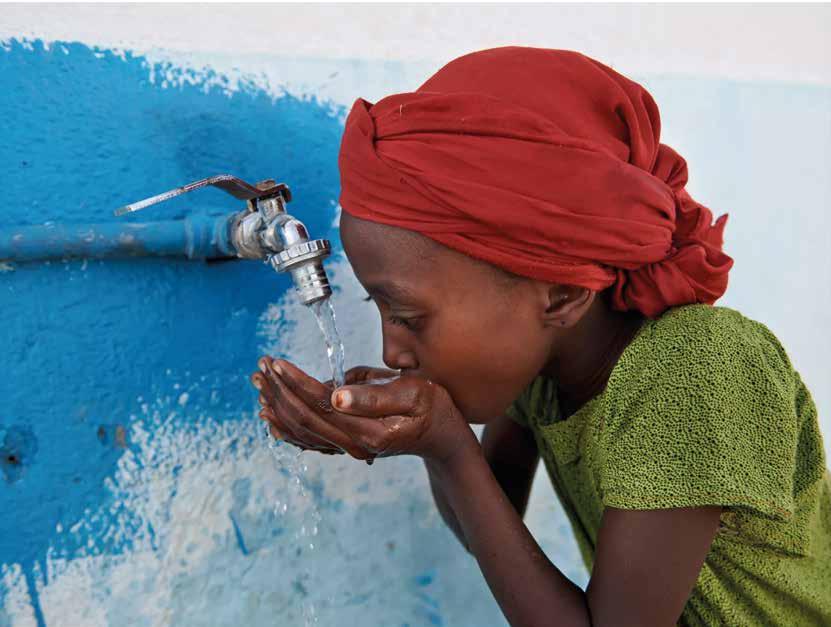
Achieving the SDGs by 2030
Green growth and climate action are a national priority for achieving its Sustainable Development Goals (SDGs), with a commitment to reduce its greenhouse gas (GHG) emissions by 40% by 2030.

With 86% of the territory in a desert climate as well as high exposure to climatic risks (frequent droughts, strong floods, rising sea levels and salinization of water resources), Djibouti makes environmental protection a priority focus. The country is highly vulnerable to climate-related disasters, particularly prolonged multi-year droughts and flash floods. During the period 1980-2020, Djibouti was hit by 24 disasters, affecting an average of 86,255 people and causing 344 deaths. Droughts and floods represent the largest share of the human and economic costs associated with disasters in Djibouti. Average rainfall is around 200 mm per year. Given its geographical location, Djibouti is also vulnerable to the effects of climate change,
including sea level rise, extreme temperatures, and irregular rainfall. A 2°C increase would seriously threaten 90% of coral reefs. The recent opening of the Ghoubet wind farm (60 MW) and imported hydropower from Ethiopia represent pathways for energy diversification aimed at mitigating the scope of global warming consequences. Djibouti aims to reduce its CO2 emissions by 40% by 2030. Financial flows for climate action and green growth in Djibouti during the 2019/2020 period were dominated by public financing. Private sector financing contributed only 24.21% (AfDB 2023) According to the Climate and Development Report (CCDR) published in early 2025, the impact of climate change on Djibouti is also manifested through major economic repercussions.

It emphasizes that climate impacts could lead to a decrease in real GDP of up to 6% by 2050 due to the significant costs associated with climate disasters, agricultural losses, and disruptions to essential economic services. On the social front, climate impacts also exacerbate existing inequalities. Rural communities, which depend heavily on agriculture and livestock, suffer disproportionate losses due to drought and soil degradation. Internal climate migrations, caused by land degradation and the absence of sustainable livelihoods, intensify pressure on urban infrastructure, worsening living conditions in peri-urban areas.
The costs associated with climate adaptation are estimated at over $2.8 billion, of which a significant portion of priority measures estimated at $1.1 billion must be mobilized through partnerships with the private sector and international financing. The country has opportunities to increase the mobilization of private sector climate finance, notably through the National Fund for the Environment and Climate Change. Djibouti can also benefit from opportunities offered by international agreements, particularly the Paris Agreement regarding carbon credit trading.
THE YOUTH ENTREPRENEURSHIP PROJECT FOR CLIMATE CHANGE ADAPTATION
The African Development Bank (AfDB) supports the Government of Djibouti in implementing the Youth Entrepreneurship Project for Climate Change Adaptation (PEJACC). This project aims, through direct investments in climate adaptation, securing food production, and creating decent jobs for youth and women, to simultaneously contribute to the Vision 2035 for sustainable economic development and the National ICI Plan focused on diversification, employment, and social inclusion. PEJACC is structured around three components: strengthening horticultural and goat farming production systems in the face of climate change; supporting the development of climate-adapted agribusiness; and project management and coordination.
Waste management
Djibouti ranks among the most urbanized African countries; thus, waste treatment has become an economic and social challenge.
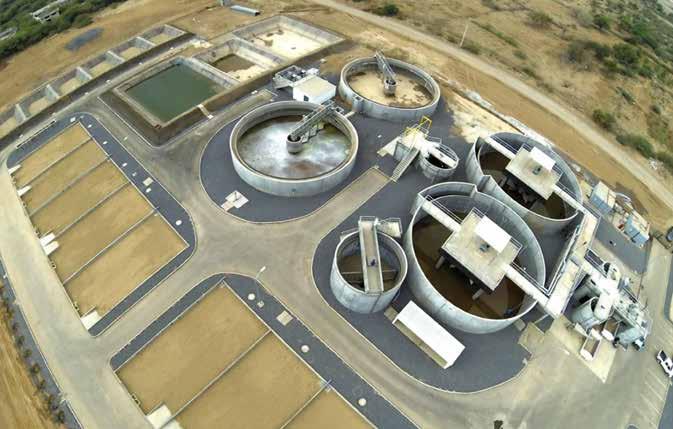
The wastewater collected in the capital is treated at the Douda wastewater treatment plant, on the outskirts of Djibouti City, with a capacity of 3700 m³ per day. However, the expansion of industrial and port activities, waste incineration, maritime transport, and automobile traffic are potential sources of air pollution.
In order to improve sanitation services, the construction of the Doraleh, Balbala, and Douda wastewater treatment plants offers new opportunities to minimize health threats related to the discharge of untreated wastewater. This simultaneously offers an opportunity for unconventional water resources. The increase in the urban population also requires particular attention to waste management. Plastic and microplastic waste discharged into the environment and the sea also harm biodiversity and the health
of Djiboutians.
The institutional framework for the circular economy and the green economy is not yet fully developed. However, the government-supported promotion of the circular economy through plastic waste recycling has resulted in civil society initiatives.
Plastic Odyssey launched, in collaboration with the International Organization for Migration (IOM), a plastic waste recycling unit, thus contributing to cleaning the city of Obock and preserving the environment. Its aim is to transform the plastic produced by the city into construction materials.
In October 2024, the official opening of the new landfill in Omar Jaga village was carried by the NGO SOS Environnement Djibouti and funded by Sovereign Carbon Agency. This project introduces an innovative waste management system in the locality.

For the first time in the country, particular attention is paid to selective sorting at source, with a landfill site structured into three separate compartments: metal, plastic, and other waste. This approach aims to facilitate recycling by optimizing pre-collection sorting.
Global Gateway : Water Desalination and Wastewater Treatment
The Global Gateway strategy makes it possible to strengthen climate resilience and water security in the Horn of Africa. Thus, in July 2023, the European Investment Bank (EIB) committed to providing a loan of 79 million euros over 25 years to support water desalination, access to drinking water, and wastewater treatment in Djibouti. This solar-powered desalination project will enhance water security for 550,000 people. Furthermore, this investment will double the freshwater production capacity of the Doraleh desalination plant and expand three wastewater treatment plants located in Doraleh, Balbala, and Douda.
OPPORTUNITIES
The EIB thus contributes to strengthening desalination and wastewater treatment capacities in Djibouti, to address water-related challenges and foster climate resilience in a vulnerable country through cutting-edge technologies and high-impact infrastructure, within the framework of the Global Gateway strategy. This project will be implemented by the National Office for Water and Sanitation of Djibouti (ONEAD) and is part of the Vision Djibouti 2035 strategy.

Water and sanitation are growth sectors for entrepreneurs in Djibouti. Private sector financing could be developed to support green growth and climate action using green finance instruments such as green or climate bonds, sustainable debt financing, debt-for-nature swaps, and the issuance of green bonds and Sukuks. Wastewater and greywater can be treated and used for agriculture and aquaculture to mitigate water scarcity. Energy from fecal sludge and other organic waste can be recovered and transformed into biogas, heat, and electricity.
Thedevelopmentofrobustdigital infrastructureandadynamicdigital ecosystemisessentialtoattract foreigninvestmentandstimulate innovation.
ExcerptfromthespeechdeliveredduringtheNationalPolicy AddressbyPresidentIsmaïlOmarGuellehonAugust27,2024.
Telecommunications & Digital Economy
The government's commitment to making digital technology a tool for economic development is a strategic priority for Djibouti, which seeks to strengthen its digital capabilities to stimulate its economy, modernize public services, and improve citizens' quality of life.

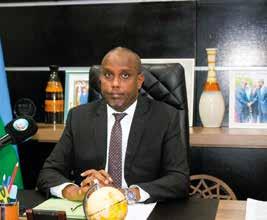
Interview with Radwan Abdillahi Bahdon, Minister of Communication, in charge of Posts and Telecommunications – a sector playing a pivotal role in Djibouti's socio-economic development.
What is your strategy to make Djibouti a technological hub by 2035?
Under the impulse of the President of the Republic, the "Djibouti 2035" vision sets up information and communication technologies as pillars of economic development. This ambition translates into a strategy structured around three priorities: connectivity, digital skills training, and innovation. Djibouti already relies on a premier digital infrastructure network, with ten operational submarine cables and two under development, making the country an essential regional data transit platform. The completion of the DARE-1 cable in 2020 strengthened this strategic position serving countries in the region, particularly Somalia, Kenya, Somaliland, and the landlocked states of East Africa.
In the extension of this infrastructure, we develop sovereign data centers to accommodate locally the data, while favoring private investments through public-private partnerships. We are also supporting the emergence of a dynamic digital ecosystem by backing startups and creating technology incubators. Finally, close collaboration is underway with the Ministry of Education to train a competent youth ready to meet digital challenges.
Cost and accessibility of the Internet remain concerns for many Djiboutians. What concrete actions do you plan to improve the situation?
The Head of State’s vision aims to guarantee every citizen equitable access to technologies, in order to

build an inclusive knowledge society. With this objective, several concrete measures have been taken. Between 2020 and 2025, telecom service prices will see significant reductions. 4G coverage has expanded thanks to investments in network densification, leading to a 280% increase in mobile data consumption. Access to fixed fiber optics has also progressed by over 30%, while the Mobile Money service has established itself as an essential tool for financial inclusion.
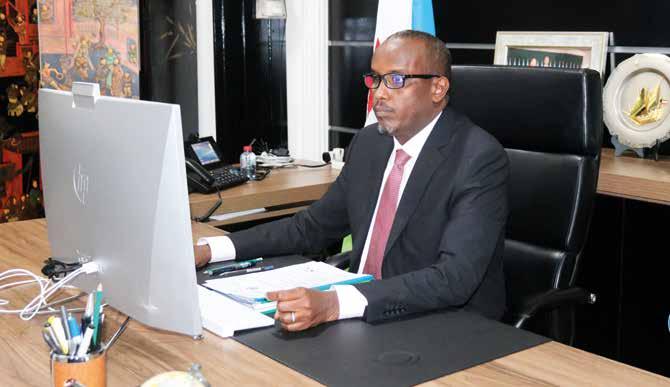
We have also initiated discussions with Djibouti Telecom to revise offers for youth, students, and SMEs. Furthermore, public free connection spaces are being deployed, guided by a logic of digital justice. The arrival of new institutional actors, such as the Ministry Delegate for the Digital Economy and the Multisectoral Authority, combined with financial support from the World Bank, strengthens the state’s capacity to extend access to quality digital services across the entire territory.
What will the "Horizon Fiber" initiative bring to Djibouti, aligned with the Africa Digital Transformation Strategy 2030?
The "Horizon Fiber" initiative represents a major lever to accelerate our digital transformation. It aims to strengthen regional interconnection by relying on new terrestrial and maritime cables, which will position Djibouti as a digital gateway between Africa, Asia, and Europe. This project will significantly increase available bandwidth capacity, reduce interconnection costs, and improve our network’s resilience. At the local level, this will translate into a significant improvement in Internet quality for citizens, businesses, and institutions.
It will also foster the emergence of high-value-added services, such as e-government, e-commerce, and telemedicine. Alignment with the African 2030 strategy allows us to pool efforts at the continental level and better integrate Djibouti into pan-African digital networks.
With which countries do you have cooperation agreements in the fields of communication and information?
Our cooperation policy is guided by complementarity, openness, and regional solidarity. We have active bilateral agreements with several countries, notably Somalia, France, China, Morocco, Ethiopia, Rwanda, Qatar, Saudi Arabia, and Egypt. These agreements cover various areas: journalist training, technical capacity building, digital security, infrastructure development, and audiovisual co-production.
We are also engaged in multilateral frameworks, such as the African Union and the International Telecommunication Union, which enable us to share best practices and access funding or expertise. These partnerships are essential for building a resilient and sovereign digital ecosystem.
Digital technology, a government priority
As part of the Vision 2035 strategy, the Djiboutian government aims to ensure the digitization of public services and the private sector, and to attract digital economy players to strengthen the country's position as a technology hub in Africa.

The digitization of public administration and the development of e-commerce are essential drivers for the country’s development. The Ministry of Communication, in charge of Posts and Telecommunications, presented its national broadband development strategy in late October 2024. This plan aims to accelerate fiber optic coverage and democratize access to broadband, both fixed and mobile, across the entire national territory. The new strategy advocates for reduced pricing, doubled speeds without cost increases, a regulatory framework, democratization of computing tools, and infrastructure development. This ambitious initiative is part of the "Djibouti Digital Foundation" project". It aims in particular to make Djibouti a technological hub by 2035, thanks to the promotion of the digital services and the implementation of a favorable environment for the investments of the private sector in ICT.
The development of digital infrastructure and a dynamic digital ecosystem is also essential to attract foreign investment and stimulate innovation. Additionally, the government will invest in digital technology education and training to create a skilled and competitive workforce. The flagship national initiative, the "Smart Nation" program, marks a toward a more comprehensive step digital transformation approach. While Djibouti has made significant progress in the digital sector, the country still struggles to fully exploit its technological potential. Its main challenges lie particularly in the cost of digital services. Digital connectivity remains expensive despite Djibouti’s unique connectivity endowment. The entry of new private competitors could reduce costs by up to 22% and help narrow the digital divide. The government has developed a five-year development
KEY FIGURES
65%
INTERNET ACCESS RATE OF THE POPULATION IN 2025
+1.4%
ANNUAL GROWTH OF USERS BETWEEN JANUARY 2024 AND JANUARY 2025
100%
MOBILE AND INTERNET COVERAGE BY 2027
10 SUBMARINE CABLES
17th FOR THE ICT DEVELOPMENT INDEX OF THE INTERNATIONAL TELECOMMUNICATION UNION (ITU 2024)
plan called Djibouti ICI (Inclusion-ConnectivityInstitutions) which should contribute to better social and financial integration of the population through reducing the digital divide. To achieve this, authorities are counting on the private sector to create jobs and value. In November 2024, President Ismail Omar Guelleh inaugurated the Data Center and Technology Park, a flagship project funded by Wingu Africa and TO7 Network. This strategic infrastructure positions Djibouti as a
regional technology hub in Africa. In January 2025, the World Bank approved $20 million in financing from the International Development Association (IDA) to support a new project strengthening public financial governance and digital services in Djibouti, thereby contributing to improving the population’s economic conditions. Djibouti Telecom, Ethio telecom, and Sudatel Telecom Group signed a memorandum of understanding in early December 2024 for the Horizon Fiber initiative, aimed at improving digital connectivity across Africa and establishing seamless communication links from the Horn of Africa to Europe and Asia. The memorandum is expected to accelerate the three telecommunications operators’ commitments to seamless, borderless fiber optic connectivity. Furthermore, this strategic partnership marks a transformative step in overhauling international and regional digital infrastructure, focusing on developing a multi-terabit terrestrial fiber optic link that will facilitate faster, more reliable, and more robust connectivity, thus contributing to Africa’s digital transformation.
Djibouti has a national cybersecurity strategy for 2024-2030 based on five main pillars: strengthening institutions and the governance framework, protecting critical infrastructure, intensifying the fight against cybercrime, training citizens and cybersecurity experts, and national and international cooperation. This strategy aims to position the country as a key cybersecurity player in East Africa, attract more investment, and strengthen its competitiveness on the regional and international stage.
TRANSFORMING THE COUNTRY INTO A REGIONAL INNOVATION HUB THANKS TO IA
The Djiboutian government has set the objective of transforming the country into a regional artificial intelligence (AI) innovation hub within the coming years. To achieve this, the government wants to launch several pilot projects in identified priority areas, considering the use of AI in critical domains such as smart agriculture, health, logistics, transportation, and education. The government wishes to invest in artificial intelligence (AI) education and training to build national expertise. Additionally, it plans to launch several pilot projects in priority domains. The national strategy considers the use of AI in critical domains such as smart agriculture, health, logistics and transportation, as well as education. These efforts fall under "Vision 2035", the Djiboutian government's development strategy that aspires to equip the country with world-class digital infrastructure.
ANPI Djibouti, key player in digital transformation
The National Investment Promotion Agency (ANPI) of Djibouti has positioned itself for several years as an essential driver of the country's economic development.

The ANPI One-Stop Shop: Catalyst for Administrative Innovation
The National Investment Promotion Agency (ANPI) of Djibouti has positioned itself for several years as an essential lever of the economic development of the country. Through its One-Stop Shop, ANPI facilitates formalities related to business creation, tax and social registration, and many other administrative procedures. This service aims to centralize entrepreneurs’ procedures at a single point, significantly reducing delays, costs, and bureaucratic burdens.
Within the momentum of the national strategy "Djibouti Smart Nation" , which makes digitalization a central pillar of public administration, ANPI has launched a major technological overhaul of its platform. This initiative aligns with the "Digital Administration" pillar promoted by the Ministry of Digital Economy and Innovation. Through strategic collaboration with local companies specialized in
digital management systems in Africa, the One-Stop Shop platform has been renewed. The goal is clear: digitize the entire business creation process while ensuring security, accessibility, and performance.

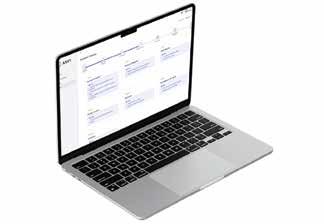
Create your company online, easily and from home
The most significant progress of this modernization lies in the introduction of the innovative online company creation module which will soon be available. From now on, any citizen, whether in Djibouti or abroad, can register their company from home in a few intuitive steps:
• Creation of a secure account with email verification and OTP code; Intelligent form to define the company’s legal elements (type, capital, partners, etc.);
• Uploading supporting documents including photo, signature, and identification;
• Automatic generation of statutes, sworn statement, and power of attorney;
• Digital signature via secure QR code for each document;
• Validation by ANPI and issuance of legal documents. The platform also integrates electronic payment solutions: international bank cards, local digital wallets (Waafi, D-Money, CacPay, etc.), ensuring a smooth, traceable, and fully secure process. Each transaction is archived, timestamped, and accompanied by an electronic receipt.
This technological advancement represents a major turning point for Djibouti’s business climate: it removes geographical barriers, reduces delays, and paves the way for a more inclusive, agile, and modern economic environment.
High Value-Added Support Services
ANPI doesn’t stop at digitizing procedures. Aware of challenges faced by entrepreneurs, it will soon offer a range of digital support services designed to support entrepreneurial project lifecycles:
Assisted development of legal statutes through a guided interface;
• Intelligent legal chatbot integrated into the platform to guide users in real time;
• Online training modules (e-learning) on taxation, business management, communication and marketing, etc.;
• Electronic certifications upon module completion, valuable for administrative or commercial procedures.
Djibouti, a Digital Nation in Motion
The modernization of the One-Stop Shop positions Djibouti as an African pioneer in digital administrative facilitation. Through a high-performance, integrated, and useroriented platform, ANPI offers entrepreneurs an environment conducive to innovation, investment, and growth.
With this transformation, Djibouti demonstrates its commitment to building a resilient, inclusive, and futureoriented economy. ANPI, through its vision and actions, establishes itself as an essential player in the country’s economic digitalization.

Submarine telecommunications cables
Djibouti’s digital market is exceptionally well-connected to the rest of the world through ten submarine cables, affording it the advantage of serving the Horn of Africa region, currently connected via three land routes.
Situated on one of the world’s most important maritime routes, Djibouti serves as a digital gateway between several continents. The country hosts one of the largest interconnection centers in East Africa, enabling neighboring countries (Ethiopia, Somalia, South Sudan, etc.) to access high-capacity international connections. Foundation for the development of new digital activities and services, the East Africa Submarine Cable (EASSy) connects the city of Mtunzini in South Africa to Port Sudan with branching units to Mozambique, Madagascar, Tanzania, Kenya, Somalia, and Djibouti. Spanning 5,000 km at a cost of 80 million dollars, this submarine cable is designed to deliver a capacity of 36 Terabits per second (Tbps). It was implemented by a consortium of East African telecommunications operators, led by the operator Djibouti Telecom which holds an 80% stake, alongside Somtel (Somalia) and Telkom Kenya.Since November 2023, the capital has been the landing point for a tenth submarine cable, India Europe Express (IEX), passing through Oman, Saudi Arabia, Egypt, Greece, Italy, and France, resulting from an agreement with Meta, Facebook’s parent company. An eleventh cable, Blue Raman, launched by Google and connecting Israel and Saudi Arabia, is expected to become operational soon. While the country hosts data from major global ICT companies, it must accelerate its own population’s network access. By late 2022, mobile internet access
OPPORTUNITIES

stood at only 24.19%. It only recently achieved 90% 4G coverage. Despite licensing two internet service providers, the opening of capital in Djibouti Telecom— one of the last public monopolies—remains relevant. Through connections to 10 submarine cables and 2 terrestrial cables, Djibouti possesses significant international connectivity infrastructure with capacity reaching 1,643 Gbit/s, of which only 39% is utilized by Djibouti. Nevertheless, services from the state-owned monopoly operator, Djibouti Telecom, remain limited. These ten major fiber-optic submarine cables will be complemented by four additional cables entering service by 2025: 2Africa, Africa-1, Raman, and SeaMeWe.
By enhancing digital infrastructure, Djibouti becomes more attractive for foreign investments, particularly in technology and innovation sectors. The World Bank report published in May 2024 emphasizes strengthening fundamental pillars of the digital economy, namely: development of telecommunications and data infrastructure, digital platforms, financial services, and entrepreneurship. The private sector is set to play a major role.

TheRepublicofDjiboutipossessesan extremelyrichanddiversetourist heritage.Beyonditsworld-renowned exceptionalsites,ourcountryboasts oneoftheworld’sgreatestvarieties offaunaandflora.
ExcerptfromtheaddressbyMohamedWarsamaDirieh,Minister ofCommerceandTourism,duringtheCelebrationofWorld TourismDayonSeptember27,2022.
Commerce & Tourism
As part of the Vision 2035 initiative, Djibouti aims to become a commercial hub connecting Africa, Asia, and Europe. Leveraging significant tourism potential, the government targets attracting 500,000 tourists by 2035.

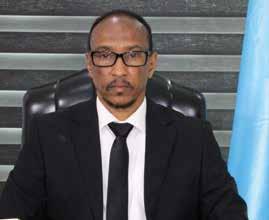
Interview with Mohamed Warsama Dirieh, Minister of Commerce and Tourism, who oversees the strategic development of the Djibouti Corridor while promoting inclusive commerce. Important measures have been taken for tourism development, a national policy priority.
Djibouti is a hub for regional and global trade. What challenges must you address?
Djibouti is indeed a crucial hub for regional and global trade due to its geostrategic position; massive investments in infrastructure (ports, logistics, and telecommunications); its climate of peace, political stability, and macroeconomic stability; its strong commitment to the multilateral trading system (WTO); the alignment of its trade policy with multilateralism principles with three trade policy reviews to date; its strong regional and continental involvement: founding member of COMESA and IGAD, Djibouti has also ratified the AfCFTA Agreement; its clear strategic vision to make Djibouti a reference logistics and commercial hub for the region.
Challenges must be overcome to achieve this ambition. First, we must consolidate regional integration achievements to stimulate industrialization through developing regional and continental value chains. The government wishes to diversify the national economy, which primarily depends on the service sector, while only public operators support wealth and job creation. To do this, it is necessary to strengthen private sector involvement, encouraging it to invest more in regional value chains and fully exploit opportunities offered by regional and continental integration.
We pursue the goal of creating a favorable environment for investments, especially for youth and women entrepreneurship, to enhance their regional Finally, we must increase economic resilience against external shocks while promoting more inclusive, jobgenerating growth.
Which sectors are considered priorities under the national strategy for implementing the African Continental Free Trade Area (AfCFTA)?
Djibouti has adopted a national AfCFTA implementation strategy and seeks to consolidate regional and continental integration, conquer potential markets (Somalia, South Sudan, landlocked countries of the Great Lakes region), and strengthen its assets in priority areas: transport services, telecommunications, financial sector, and tourism.
Regarding logistics and transport, we must leverage existing infrastructure to position Djibouti as a regional and continental export platform. For agribusiness and agricultural processing, we promote local processing of domestic and imported agricultural products to reduce food dependency and strengthen food security.
Concerning light industry and manufacturing, we need to encourage the emergence of small industrial units— textiles, packaging, building materials—to create local value addition.

For digital services and ICT, we must capitalize on digital infrastructure to develop high-value-added services: ecommerce, digital financial services, cloud computing, etc.
Tourism and the blue economy should be enhanced through Djibouti’s coastal and tourism potential linked to the AfCFTA, particularly for services and investments in hospitality, ecotourism, and sustainable maritime activities. For renewable energy, we promote investments in solar, geothermal, and wind power to support industrial competitiveness and improve energy access. Finally, for vocational training and youth/women entrepreneurship, we aim to strengthen national capacities to meet regional market needs and stimulate self-employment.
What does the IGAD Sustainable Tourism Strategic Plan 2024-2034 bring to Djibouti?
As current IGAD President for tourism, Djibouti plays a central role in implementing the Sustainable Tourism Strategic Plan 2024-2034 (STMP). This plan represents a major opportunity for the country, providing enhanced visibility and strategic positioning at the regional level. It aims to stimulate job creation and attract investments while promoting sustainable and environmentally respectful tourism. The plan also encourages the enhancement of natural and cultural heritage, notably through preserving iconic sites. It supports tourism
infrastructure development and regional connectivity, improving visitor reception. Additionally, monitoring and evaluation tools are planned to help Djibouti steer tourism policies more effectively. Finally, the STMP paves the way for regional funding and new partnerships, strengthening the country’s capacity to build a competitive, inclusive, and sustainable tourism offering.
Do you plan to develop tourism through the private sector and Public-Private Partnerships (PPPs)?
Tourism development in Djibouti largely relies on private sector involvement and Public-Private Partnerships (PPPs). These mechanisms mobilize investments, accelerate project completion, and share risks between public and private actors. By promoting PPPs, Djibouti can strengthen tourism infrastructure, diversify offerings, improve service quality, and create sustainable jobs. This collaborative model also offers greater project management flexibility and facilitates innovation. Thus, PPPs constitute a strategic lever to stimulate tourism sector growth while ensuring a balanced approach between economic development, resource preservation, and social benefits.
For example, the National Tourism Agency has initiated the establishment of a center of excellence dedicated to tourism and hospitality professions. A pre-feasibility study is currently underway to structure the training program.
Commerce development in figures
Thanks to its port, Djibouti is expected to experience rapid trade development, parallel to the economic expansion of Ethiopia, its main neighbor and trading partner.
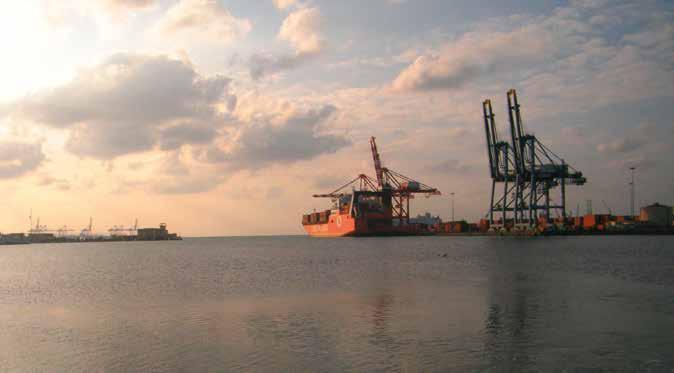
The Djiboutian economy is extremely open to foreign trade, which represents 340% of GDP, ranking as the fourth highest ratio globally according to the World Bank.
The importance of Djibouti’s strategic position as a hub for regional connectivity and trade has significantly strengthened over the past decade. With its access to the Red Sea, the Arabian Sea, the Indian Ocean, and the Persian Gulf, the regional corridor is crucial for the movement of goods and services within the area.
In 2023, Djibouti’s foreign trade amounted to 14.04 billion dollars, marking a 14% increase compared to 2022 (12.5 billion dollars). Djibouti maintains a structurally deficit trade balance, which stood at 4.3% of GDP. Food products
products account for 38.3% of Djibouti’s imports, followed by transportation equipment (14.9%), metals (13.1%), and hydrocarbons (5.9%). Djibouti’s primary supplier is China (17.7%), closely followed by India (14.5%). Subsequent suppliers include the United Arab Emirates (11.5%), Turkey (9.3%), and Saudi Arabia (8.1%)
Djibouti’s main export destinations are Ethiopia (61.4% of total), China (16.6%), India (7.2%), Jordan (2.1%), and the Central African Republic (1.4%)
The economies of Ethiopia and Djibouti are highly interdependent, with Djibouti’s port being the only maritime outlet for landlocked Ethiopia. Djibouti’s trade balance is structurally negative as the country exports little (except livestock) while importing large quantities of

petroleum products, foodstuffs, and capital goods. However, it maintains a services trade surplus, largely due to port service fees for reimports and reexports.
Djibouti’s exceptionally high foreign trade-to-GDP ratio (349%) reflects the predominance of transit trade to Ethiopia. In 2023, reexports accounted for 92% of exported goods and 91.4% of imported goods. These reexports create significant margin of error in trade calculations, as goods destined for reexport remain in free trade zone warehouses, diminishing the meaningfulness of available data.
E-commerce development should enable effective participation in agricultural, agro-pastoral, industrial, and services value chains. E-commerce sites are experiencing strong growth and increasing diversification, allowing consumers to purchase directly online without physical travel.
For all online sellers, Djibouti Post positions itself as the primary logistics partner for delivery reception. Nonexistent just years ago, e-commerce now represents a significant portion of Djibouti Post’s activities.
DJIBOUTI’S ACCESSION TO THE LISBON AGREEMENT
In early 2024, the Government of the Republic of Djibouti deposited its accession to the Geneva Act of the Lisbon Agreement on Appellations of Origin and Geographical Indications.
Djibouti’s accession to the Lisbon System stems from Vision 2035 and the Djibouti ICI initiative. It contributes to building a diversified and competitive economy, with the private sector as the driving force.
With this accession, the Geneva Act now provides protection across 22 Contracting Parties covering 58 countries, while the Lisbon System covers 73 countries in total.
This accession will enable Djibouti’s producers and interested stakeholders to obtain rapid and straightforward international protection for distinctive designations of their origin products, such as the prestigious Lake Assal Salt, as well as Djibouti’s renowned incense and spices, to name just a few. Through a single registration procedure, Djiboutian producers can protect their products in international markets.
The role of the Chamber of Commerce of Djibouti
As the representative institution of the private sector at the national level, the Chamber of Commerce of Djibouti (CCD) supports entrepreneurs and merchants in promoting and developing their activities.
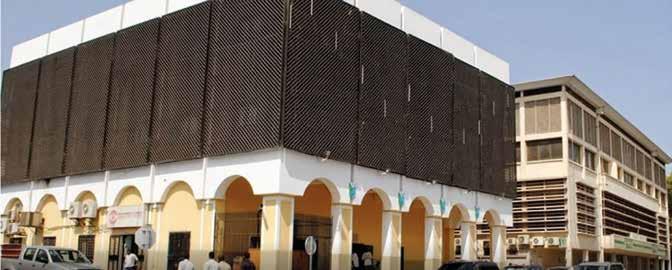
With all economic sectors represented within it, the CCD benefits from the experience of voluntary business leaders - both men and women - driven by concern for the general interest, skilled in business management and commercial activity development.
The consular institution has two main missions: representing, advising, and supporting companies by providing services tailored to their needs; contributing to the country’s economic growth by advising public authorities on the business environment and promoting the nation. Services provided by the Chamber of Commerce to businesses take various forms: information, advisory services, technical assistance, and training, delivered through the Institution’s operational Departments. As a true voice for businesses, international formalities for companies are partially handled at the Chamber of Commerce of Djibouti. Offering customized training adapted to business needs, the Chamber leverages its network of
institutional partners for perfect implementation of these tailored programs. For commercial prospecting within the country, the CCD provides on-demand customized business directories. The Chamber can also intervene to improve value chain organization and management at a company’s request.
The CCD engages in development projects with international partners such as the French Development Agency (AFD), European Union (EU), and USAID. These projects share common goals: improving Djibouti’s business environment, enhancing business support services quality, and boosting company competitiveness. The institution also collaborates with national entities such as the ANPI One-Stop Shop, ODPIC, and CNSS.
The CCD is a member of several consular networks including the Permanent Conference of Francophone and African Chambers (CPCCAF), Pan-African Chamber of Commerce and Industry (PACCI), and Islamic Chamber of Commerce and Industry (CICIA)
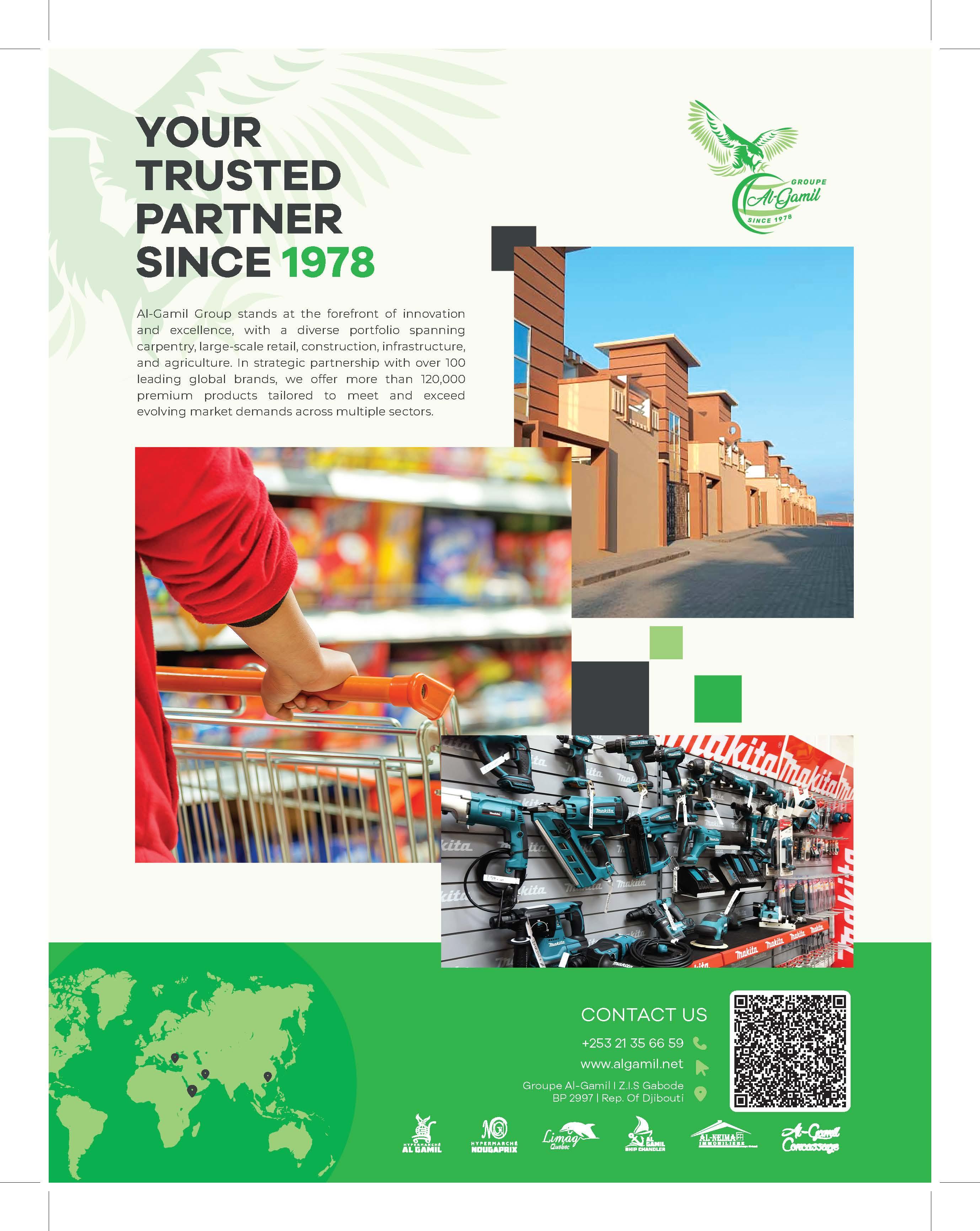

Interview with Nicolas Froger, General Manager of Djibouti Palace Kempinski, a luxury hotel offering range of services designed for business travelers and tourist stays.
Can you describe your career path in a few words? II was born and raised in France. I studied in Lyon and obtained a BTS in Hotel Management from the Institut Vatel. I then completed my military service in Germany (as a non-commissioned officer of the contingent), before starting my career in France, in Nîmes and then in the Alps at L’Alpe d’Huez. However, I quickly chose expatriation, first in the French Overseas Departments and Territories (DOM-TOM): in the Caribbean, in Gosier, Guadeloupe, as Food and Beverage Director of a 3-star hotel; in the South Pacific, in French Polynesia and New Caledonia, as Hotel Director for 3, 4, and 5-star hotels. Then in Africa:
-In Senegal, in Saly Portudal on the Petite Côte, I managed for 10 years a 260-room 4-star hotel belonging to the Fram group.
-In Ivory Coast, in Abidjan, where I handled the preopening and opening of a 149-room 4-star business hotel belonging to the Mangalis group.
-In Ghana, in Accra, as Director of the Golden Tulip, a 238-room 4-star hotel belonging to the Louvre Hotels group.
-Again in Senegal, in Dakar, as Director of the emblematic Terrou-bi, a 168-room 5-star hotel belonging to the Rahal family.
- And in Djibouti since December 2023, as Director of the iconic Djibouti Palace Kempinski, a 320-room 5-star hotel.- 2023
What are the assets of the Djibouti Palace Kempinski that you currently manage?
The Djibouti Palace Kempinski is a 5-star hotel belonging to the Kempinski Group, which is the world's oldest luxury hotel group since it was founded in 1897 by the German Berthold Kempinski. It is located in Djibouti at the Pointe du Héron in a 5-hectare park and by the sea in the Gulf of Tadjoura. The hotel has 320 rooms, suites, and apartments, eight food and beverage outlets, two swimming pools, a Spa & Gym, and direct access to a private beach, making it an ideal location for relaxation or business stays.
How many employees work at the Djibouti Palace Kempinski?
We currently employ 376 personnel with zero outsourced services. Department heads (37 expatriates) include: 1 French, 10 Indians, 2 Algerians, 2 Bangladeshis, 1 Camerounian, 4 Egyptians, 3 Kenyans, 1 Lebanese, 2 Moroccans, 2 Nepalese, 3 Pakistanis, 1 Senegalese, 3 Sri Lankans, 1 Thai, and 1 Tunisian. Remaining staff are Djiboutian nationals trained in-house since our 2006 opening, as the training provided by the Arta hotel school is not sufficient to meet the demands of luxury hospitality.
Do you host conferences?
Yes, the Djibouti Palace Kempinski hosts many conferences, forums, and seminars, as the hotel has 1,500 m² of meeting rooms, including a 960 m² plenary room, with state-of-the-art sound and lighting equipment meeting international standards. That is why we host all the forums and international conferences organized in Djibouti, as well as all governmental delegations.
Djibouti aims to attract 1 million tourists by 2035. What are the main challenges for the sector?
Djibouti aims to attract one million tourists by 2035; this is the will of the Djiboutian authorities. Despite the territory's small size - 23,000 km² - Djibouti offers great landscape diversity with a coastline, islands, lakes, mountains, etc. However, it will be necessary to very quickly establish all suitable structures, because they are currently limited and poorly structured, and to take care of promoting the destination in the source markets.
Significant tourist potential
Thanks to a natural heritage sheltering exceptional sites, paradise islands, seabeds, and beaches of great beauty, the tourism sector can represent a major investment lever.

Indeed, with its lakes, mountains, paradise islands, and marine fauna, the country possesses assets to boost tourism and generate jobs, provided that significant investments are devoted to infrastructure. While it currently contributes only 3% to GDP, the government hopes to double this figure by 2035, by attracting 500,000 visitors per year. For now, the country attracted only 142,551 tourists in 2023, which is 25,000 less than in 2019.
Far from mass tourism, the country intends to capitalize on its marine and terrestrial biodiversity, composed of plains, mountains, lakes, plateaus, beaches, mangroves,
and islands. Ecotourism has developed, featuring notably a jewel: the Bay of Tadjourah where, from October to January, dozens of whale sharks gather. Djibouti is also renowned for scuba diving.
The Goubet-Al-Kharab Strait, the meeting point of two tectonic plates, the African plate and the Arabian plate, presents an immense fissure dotted with caves, tunnels, and cavities teeming with wildlife. Also noteworthy are Lake Assal, the National Day Forest Park, and, towards the North, the old town of Obock, the Seven Brothers Islands, or Lake Abbe and Arta Beach. The development of responsible tourism would enable the development
KEY FIGURES
23,180 km2 314 km OF COASTLINE 3% OF GDP
142,551 TOURISTS IN 2023
500,000 TOURISTS BY 2035
44 HOTELS 1,814 ROOMS
of each region. Programs designed to attract business tourists to regional sites should therefore be accompanied by investments in international conference and exhibition halls.
The sector could become an economic engine by offering jobs requiring a great variety of skills. Also, with the support of international experts, the government has established a new hospitality training center.
The sector comprised, in 2023, 44 hotels for a total of 1,814 rooms, not all of which correspond to the standard targeted by the government strategy. While Djibouti saw the opening of three high-end hotels in 2024, the government should build about ten other hotels by 2035 with a focus on controlled environmental management to meet the objectives of the 500,000 tourists of Vision 2035.
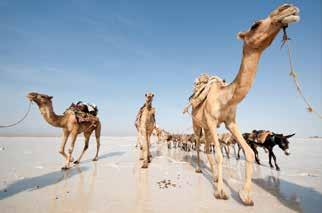
THE IGAD REGION SUSTAINABLE TOURISM STRATEGIC PLAN 2024-2034
This document aims not merely to be a plan but a collective vision that lays the foundations for enhanced regional cooperation and the sustainable development of tourism within the region. At the end of September 2024, IGAD member states reached a crucial milestone in regional integration by recognizing the power of tourism as an engine of economic growth, job creation, and the bringing together of our peoples.
Five objectives are targeted by this new IGAD 2024-2034 Strategic Framework: the strategic areas of cooperation in tourism development among IGAD member states; the strategies and appropriate actions capable of enhancing the competitiveness of each member state and, consequently, of the entire region as a global tourist destination; the establishment of a detailed roadmap for the implementation of the strategic actions; the development of an effective coordination mechanism for tourism development within the region; the formulation of a resource mobilization plan to ensure sustainable funding for the priority programs of the IGAD Tourism Strategic Plan.
OPPORTUNITIES
The country possesses enormous tourism potential that is not yet exploited to its full value. Tourism is thus a key sector for investment opportunities. The State intends to construct infrastructure at tourist sites and develop coastal and land transportation, in the form of public-private partnerships (PPP).


Interview with Nicolas Froger, General Manager of Djibouti Palace Kempinski, a luxury hotel offering business and leisure accommodations.
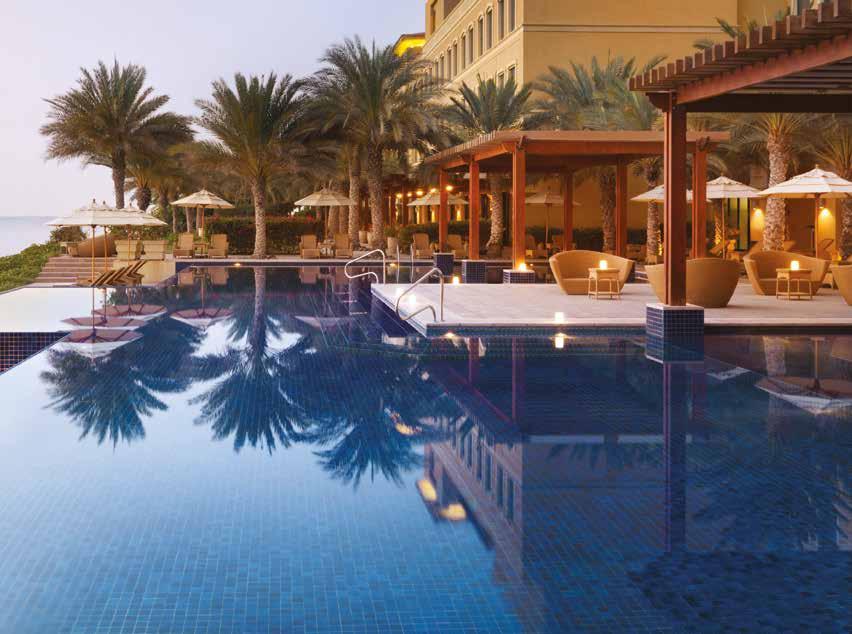
I was born and raised in France. I studied in Lyon and obtained a BTS in Hotel Management from the Institut Vatel.
I then completed my military service in Germany (as a noncommissioned officer of the contingent), before starting my career in France, in Nîmes and then in the Alps at L’Alpe d’Huez. However, I quickly chose expatriation, first in the French Overseas Departments and Territories (DOM-TOM):
-In the Caribbean, in Gosier, Guadeloupe, as Food and Beverage Director of a 3-star hotel
-In the South Pacific, in French Polynesia and New Caledonia, as Hotel Director for 3, 4, and 5-star hotels
1/ Can you describe your career path in a few words?
The health sector has established a five-year health development plan, the implementation of which falls within the framework of addressing all challenges in order to accelerate progress towards Universal Health Coverage and the health-related Sustainable Development Goals (SDGs)
ExtractfromtheaddressbyHisExcellencyIsmailOmar Guelleh,PresidentoftheRepublic,ontheoccasionofthe WHO’s75thanniversary,April9,2023.
Health
The health sector has established a five-year National Health Development Plan (PNDS) with the aim of accelerating progress toward Universal Health Coverage and the health-related Sustainable Development Goals (SDGs).


Interview with Dr. Ahmed Robleh Abdilleh, Minister of Health of Djibouti since 2021. This former parliamentarian, a pediatrician, implements the health strategy desired by H.E. President Guelleh for all Djiboutians.
Can you give us a summarized assessment of your actions?
Yes, certainly. I have been at the helm of this department since 2021. Djibouti’s Vision 2035 prioritizes human capital development, focusing on improving health coverage across the entire territory.
In this context, the health sector has a five-year National Health Development Plan (PNDS), the implementation of which falls within the framework of addressing all challenges in order to accelerate progress toward Universal Health Coverage and the health-related Sustainable Development Goals (SDGs). It aligns with Vision 2035 and the government’s Accelerated Growth Strategy and Employment Promotion (SCAPE), which, in the health domain, translate into the vision where all Djiboutians must benefit from universal access to quality health services and care.
As you know, the Republic of Djibouti has undergone a period of profound health transformations, in a world still shaken by the aftermath of the COVID-19 pandemic. The Ministry of Health, conscious of its responsibilities toward a young, urban population but also vulnerable in rural areas, has undertaken a series of concrete, structured, and sometimes bold actions and reforms to improve the quality, access, and efficiency of health services. However, it is with a keen sense of governance and public responsibility that the ministry has mobilized its technical and financial partners, reorganized its central administration, and strengthened ties with communities at the grassroots level.
To this end, the government has committed to providing an adequate response to the health
challenges delaying the attainment of optimal health for the entire population. Hence the realization of a national symposium to engage a discussion with all the actors concerned by he106alth, to think about the weaknesses of the health system, with a view to providing deep recommendations which will help to nourish the contents of priority reforms.This symposium offered an opportunity to bring together all sectoral and multisectoral actors, the private sector, Technical and Financial Partners, and representatives of the population and civil society in a dynamic of reflection leading to reforms capable of supporting the transformation of the Djiboutian health system.
We have undertaken a vast project by overhauling the health system; this began by establishing an appropriate organizational chart.
This dynamic gained unprecedented momentum with the creation of the Djibouti University Hospital Center (CHUD), the result of a strategic grouping of national hospitals. This project reflects the will to modernize hospital governance and integrate training, care, and research within the same institutional space. It also involved legal texts on the national list of essential medicines by establishing a quality medicines policy through revising Djibouti s essential medicines list according to WHO protocols and guidelines, revised regulations on pharmacy licensing, health card standards with the creation of polyclinics in Djibouti and intermediate centers at the regional level. We launched the construction of emergency services at the Peltier and Balbala CHUD, to meet standards and be better equipped. Also, given the population density in recent years, we undertook the construction of a mother-
-child hospital to decongest Dar-el-hanan Hospital and modernized the technical platforms for maternal and child health policy at the former Bouffard site. Finally, we have rehabilitated and opened new dialysis services within the CHUD and hospitals in the regions. Since 2022, we have strengthened vector-borne disease control such as malaria, dengue, and chikungunya through specific strategies. For instance, by developing a strategy, and today, the work has produced a result: we have reduced the number of cases by 65%.
Thus, the tuberculosis incidence rate has decreased, and the program has strengthened follow-up and reduced loss to follow-up. An oncology center will be created in a few months with the IDB.
What are the main intervention pillars of the National Health Development Plan (PNDS)?
The National Health Development Plan (PNDS) 2020–2024 of Djibouti constitutes the strategic compass for the country's health policy. It rests upon four priority axes, each broken down into specific objectives. This assessment of the ministry's actions fully aligns with the logic of implementing these pillars.
Strengthening health system governance and steering involves:
- Establishing the CHUD as the central body for hospital management
- The progressive transition toward program-based budgeting
- Launching a process to develop operational annual plans in all structures
- The regular holding of joint sectional reviews. The availability and quality of health services are improved through:
- The rehabilitation of 33 health posts in the regions
- Massive polio vaccination campaigns (98% coverage)
- Strengthening hospital capacity for patient management
- The expansion of maternal and child health services. Health promotion and prevention are reinforced by:
- Implementing Non-Communicable Disease (NCD) control programs in partnership with the CNSS
- Health education in schools and awareness campaigns against malaria
- Strengthened epidemiological surveillance with WHO support.
Health system resources involve:
- Recruiting and providing continuous training for community health personnel
- Increasing the budget allocated to the health sector with the support of PTFs
- Establishing a digital mapping of resources and financial flows.
Thus, the actions undertaken by the ministry between 2021 and 2024 reflect real, progressive execution of the PNDS. They lay the groundwork for future national strategic planning post-2024.
What do the international cooperations you have initiated bring to the sector?
We have strengthened Chinese cooperation within the framework of interventions such as the rehabilitation of health infrastructure and the provision of medicines. The cooperation sector plays an essential role in strengthening the Djiboutian health system, supporting financing, capacity building, innovation, and equitable access to care through:
- Training health personnel, skills transfer
- Providing equipment, medicines, and infrastructure through donations or partnerships with international institutions.
- Supporting innovation, particularly for digital transformation
- Medical caravans and proximity care.
What place do innovative technologies currently occupy in the health sector in Djibouti?
The Ministry of Health has embarked on innovative technologies such as the progressive and integrated digitalization of the health system, with the ambition of modernizing services, improving access to care, and strengthening the efficiency of health management. We have implemented a Routine Health Information System (DHIS2) to improve data collection and analysis, and Msupply for a better management and supply of medicines in real time. There are trackers for certain programs that enable individual patient follow-up across the entire territory. The Dar-el Hanan maternity hospital has been embracing digitalization for some time. We will introduce a mobile solution for awarenessraising, vaccination, and maternal health.
Structural reform of the Health System
Djibouti's Vision 2035 prioritizes human capital development, emphasizing improved healthcare coverage nationwide.
The long-term vision of the Djiboutian government is to transition the country to emerging status by 2035. In this context, the health sector has adopted a five-year National Health Development Plan (PNDS) whose implementation aims to address all challenges to accelerate progress toward Universal Health Coverage and health-related Sustainable Development Goals (SDGs)
It aligns with Vision 2035 and the government’s Accelerated Growth and Employment Promotion Strategy (SCAPE), which in the health domain translates into a vision where all Djiboutians should benefit from universal access to quality health services and care.
Thus, the 2023-2027 National Social Protection Strategy is structured around four pillars: social safety nets and access to basic social services; economic and financial inclusion; adaptive social protection for sustainable development; and institutional, technical, and financial strengthening.
One priority involves preventive care adapted to the epidemiological context. This enhanced epidemiological surveillance will be available nationwide to reduce disease incidence and prevalence. Facing difficulties, particularly financial and geographical, in accessing maternal and neonatal healthcare for vulnerable populations, the Ministry of Health has implemented a national strategy. Its objective: to accelerate the reduction of maternal and neonatal mortality, and to improve access for women of childbearing age, pregnant women, and their newborns to preventive and curative healthcare services.
The Djibouti University Hospital Center (CHUD) comprises 5 hospitals: the Peltier General Hospital, the Balbala Cheiko Hospital, the Chakib Saad Pneumology Hospital, the Dar-el-Hanan
KEY FIGURES
50%
HEALTH COVERAGE BY 2025
1st
HARMACEUTICAL IV SOLUTIONS MANUFACTURING PLANT IN WEST AFRICA
1,320
HEALTHCARE FACILITIES (STATISTICAL YEARBOOK 2021)
446
PRIVATEHEALTHCAREFACILITIES(2021)
235
PRIVATE PHARMACIES AND 40 WHOLESALE PHARMACEUTICAL DEPOTS (2023)
Maternity Hospital, and the Housseina National Center of Reference for Reproductive Health CNRSR. The CHUD is distinguished by a wide variety of professions, bringing together more than 10,000 healthcare professionals and emerging medical talents 2024 sees the continuation of the CHUD s transformation with the launch of the two construction projects for emergency departments at Peltier Hospital and Cheiko Hospital, concurrently with the implementation of a geolocation and tracking system for SMUR emergency medical services ambulances to improve the safety and efficiency of emergency medical transport. New intermediate health centers are under construction. Decentralizing essential public services is also one of the government s bets.

The completion of the Tadjourah Regional Hospital thus aligns with a strategy of territorial balance and reduction of health disparities. The digitalization of the healthcare system is also an important component. Djibouti has made significant advances, notably with the implementation of digital platforms such as SORMAS for epidemiological surveillance, mSupply for medicine
THE IMPORTANCE OF MEDICAL TRAINING
supply, DHIS 2 for health information management, or the Geographic Information System (GIS), etc. IGAD and the Ministry of Health launched a project in 2023 for the digital transformation of the surveillance system, epidemic response management, and disease analysis in the country. Several other digital projects have been initiated, such as the computerized medical record.
The project to establish and develop the Faculty of Medicine of Djibouti (FMD) was implemented through close cooperation with Tunisia. The University of Djibouti opened its medical school in 2007, with its first graduates completing their studies in early 2015.
WHO connected Djibouti with Tunisia to support administrative staff by hosting them in its four university teaching hospitals (CHU). Since 2007, through a health cooperation agreement, Djiboutians and Tunisians have worked hand in hand to develop the faculty of medicine in Djibouti. 250 physicians have been trained in Djibouti involving faculty from four medical schools (Tunis, Sousse, Monastir and Sfax), clinicians, and other specialists. In early February 2025, President Guelleh expressed gratitude to his partners, particularly Tunisia, for supporting the establishment of an internationally accredited medical faculty. This project now enables to avoid costly trips abroad for specialized care, thus offering a precious medical autonomy to the Djiboutian nation.
A policy for access to quality essential medicines
The government has established a quality pharmaceuticals policy by revising the Essential Medicines List for Djibouti according to WHO protocols and guidelines.
Toaddress the national aspirations outlined in Vision Djibouti 2035, the Ministry of Health and the United Nations Population Fund (UNFPA) Djibouti,leaning on all consultations held with key stakeholders, notably CAMME and the departments of the Ministry of Health involved in supply chain activities, intends to develop a national strategy for the procurement of essential medicines and pharmaceutical products covering the period 2023-2027. This strategy is considered an indispensable tool for improving the policy on medicines and pharmaceutical products, and above all for reforming the supply chain to enhance accessibility and availability for the population.
The objectives of this national essential medicines and pharmaceutical products procurement strategy are to improve supply chain governance and strengthen its financing; to ensure regular, sufficient, sustainable, and fairly priced procurement of quality essential medicines; and to continue supporting the efforts of the Central Purchasing Agency for Essential Medicines and Supplies (CAMME) so that it may fulfill its missions. CAMME procures medicines and health products from international suppliers.
The pharmaceutical products market is significant in Djibouti and is well-supplied. Nearly all imported pharmaceutical products are consumed domestically; however, informal trade is a major supplier of

pharmaceutical and parapharmaceutical products to neighboring countries (Ethiopia, Yemen, Somalia). Both private and public sectors import directly and source from the same manufacturers. Most are French or based in France. Approximately 10 manufacturers have representatives in Djibouti or nearby countries. The Djiboutian Pharmaceutical Industry Company (SDIP), established in the free zone since 1996, produces four generic medicines.
In September 2023, Sanofi’s Global Health entity delivered its first shipments of nonprofit Impact products to the Republic of Djibouti and international nongovernmental organizations.
OPPORTUNITIES
Investment opportunities exist to support the digitization of healthcare and the provision of modern medical equipment and healthcare infrastructure.
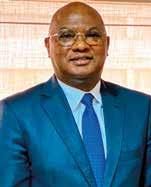
Interview with Charles Kouassi, Director General of the National Social Security Fund (CNPS) since 2013. With a long managerial career, he projects a monetary and financial portfolio exceeding CFAF 1 trillion for CNPS by 2025 while supporting public authorities in building a socially cohesive Ivory Coast.
CNPS is the first social security institution to obtain a AAA financial rating from Bloomfield Invest. How did you revolutionize social protection in Ivory Coast? The economic model of social security funds was based on a pay-as-you-go system and intergenerational solidarity. This approach only holds credit if a sufficient number of active contributors cover pension branch benefits. Our country was severely impacted by social crises between 2000 and 2011. Our institution recorded a cumulative deficit of approximately 200 billion FCFA including a net loss of 32 billion FCFA in 2011, exposing the limitations of the basic economic model. Deeming a radical economic model change necessary, our 2012 action involved pension reform through parametric adjustments characterized by raising contribution rates from 8% to 14% and changing retirement age from 55 to 60. These measures enabled the institution to achieve a positive result of approximately 9 billion FCFA in 2012 and ten years later a peak result of 150 billion FCFA. The President of the Republic, His Excellency Mr. Alassane Ouattara, as an enlightened leader, immediately understood the reforms’ relevance and issued necessary implementation ordinances.
Your strategy therefore involved transforming your fund into an institutional investor. How does this materialize?
Our objective is to significantly contribute to our country’s development and the sub-regional ecosystem through targeted and prudent investments to simultaneously support growth, job creation, while guaranteeing benefit payments and ensuring their regular increase. The initiated socioeconomic transformation materializes through our commitment to building a stronger economic and financial sector with equity participations and becoming an actor in fighting the housing crisis. Our contribution to local and sub-regional development can be summarized over the last 10 years cumulatively as approximately 285 billion FCFA in Ivorian government bond subscriptions, 26 billion FCFA in WAEMU government bonds, 126 billion FCFA in listed equities, 122 billion FCFA in unlisted equities, a 262 billion FCFA real estate portfolio, and recent equity entries into PETROIVOIRE and BICICI. Beyond banking and real estate, other vital sectors benefit namely health, water, energy, transport, hospitality.
What are the effects of this revolution for your policyholders and social partners?
Over 10 years, we implemented successive pension increases: 8% in 2014, 5% in 2016, 5% in 2020 and 5% in 2022, with a commitment to implement increases every two years. Workers’ compensation benefits for occupational accidents and diseases were increased by 8% in 2017, 5% in 2020 and 3% in 2022. Family allowances, frozen for over 30 years at 1,500 FCFA per month per child, rose to 2,500 then 5,000 FCFA between 2015 and 2016. Studies are underway to increase them to 7,500 FCFA from 2024. We implemented the Social Scheme for Self-Employed Workers in July 2019. To date, over 200,000 self-employed workers are covered. They will, like the over 6 million self-employed workers we hope to enroll, benefit from replacement income during maternity, disability, and lifelong retirement pension. We placed digital transformation at the heart of our strategy. In 2019, the launch of the "e-CNPS" platform improved interactions with social insureds and partners while facilitating their procedures with CNPS. Today, the two major projects to materialize concern housing retirement and unemployment insurance.
The National Investment Promotion Agency (ANPI) and LD Media Development would like to thank the participants and advertisers for their successful involvement.
